Accounting in Context & Budgetary Control
VerifiedAdded on 2023/07/14
|34
|9288
|313
Assignment
AI Summary
This is an assignment brief for the BTEC (RQF) Higher National Diploma in Business (Business Management) course. The student, BUI THI THU PHUONG (ELSIE), is assigned to complete Unit 5: Accounting Principles. The assignment, titled "Accounting in Context and Budgetary Control," is due on December 19, 2021. The submission format includes a blog and a memorandum with an accompanying Excel spreadsheet. The blog should be creatively written and include headings, sub-sections, columns, and business-related images. The memorandum should include sections of the spreadsheet. Both submissions should be referenced using the Harvard system. The assignment aims to examine the context and purpose of accounting and prepare budgets for planning, control, and decision making using spreadsheets.
Contribute Materials
Your contribution can guide someone’s learning journey. Share your
documents today.
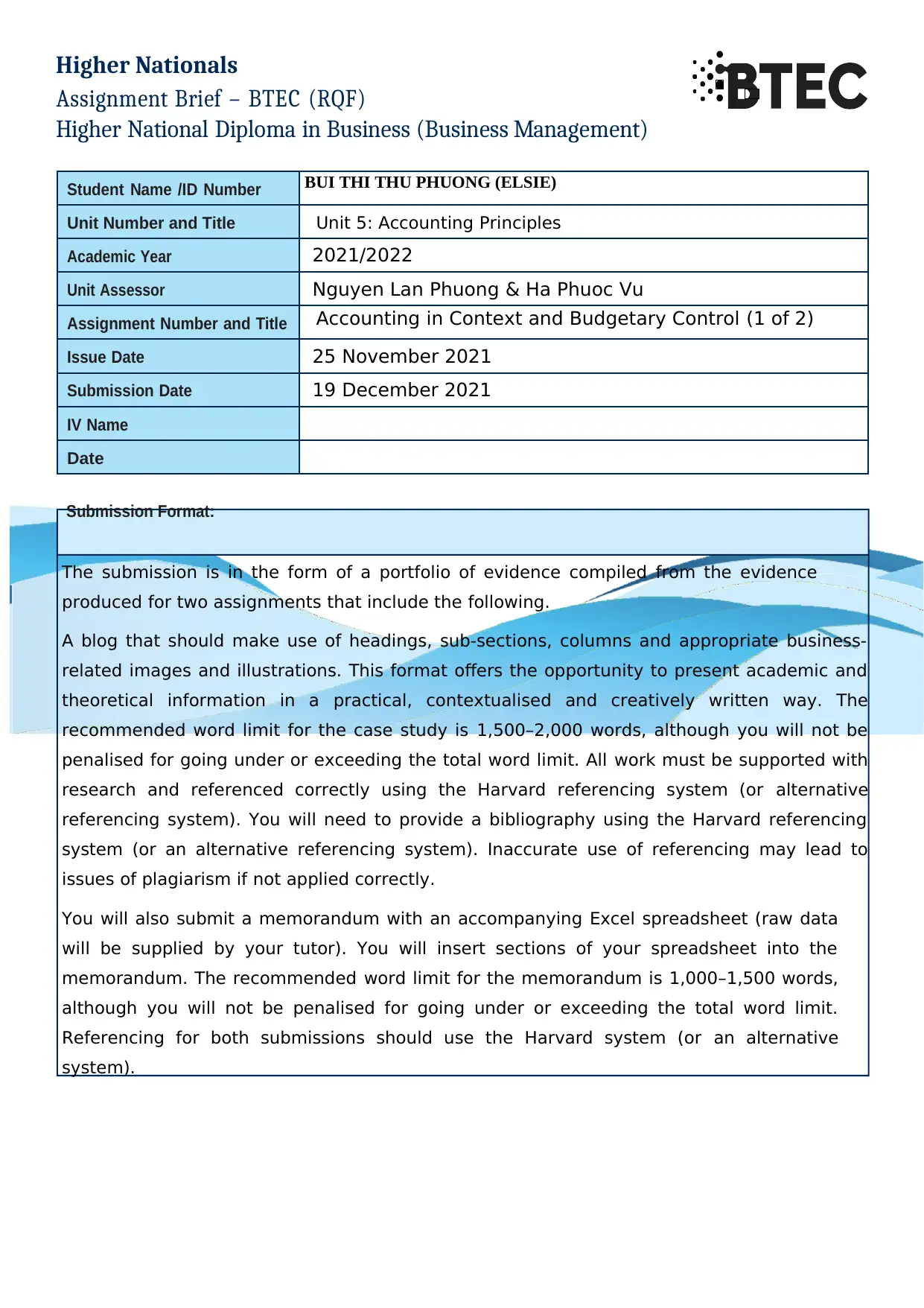
Higher Nationals
Assignment Brief – BTEC (RQF)
Higher National Diploma in Business (Business Management)
Student Name /ID Number BUI THI THU PHUONG (ELSIE)
Unit Number and Title Unit 5: Accounting Principles
Academic Year 2021/2022
Unit Assessor Nguyen Lan Phuong & Ha Phuoc Vu
Assignment Number and Title Accounting in Context and Budgetary Control (1 of 2)
Issue Date 25 November 2021
Submission Date 19 December 2021
IV Name
Date
Submission Format:
The submission is in the form of a portfolio of evidence compiled from the evidence
produced for two assignments that include the following.
A blog that should make use of headings, sub-sections, columns and appropriate business-
related images and illustrations. This format offers the opportunity to present academic and
theoretical information in a practical, contextualised and creatively written way. The
recommended word limit for the case study is 1,500–2,000 words, although you will not be
penalised for going under or exceeding the total word limit. All work must be supported with
research and referenced correctly using the Harvard referencing system (or alternative
referencing system). You will need to provide a bibliography using the Harvard referencing
system (or an alternative referencing system). Inaccurate use of referencing may lead to
issues of plagiarism if not applied correctly.
You will also submit a memorandum with an accompanying Excel spreadsheet (raw data
will be supplied by your tutor). You will insert sections of your spreadsheet into the
memorandum. The recommended word limit for the memorandum is 1,000–1,500 words,
although you will not be penalised for going under or exceeding the total word limit.
Referencing for both submissions should use the Harvard system (or an alternative
system).
Assignment Brief – BTEC (RQF)
Higher National Diploma in Business (Business Management)
Student Name /ID Number BUI THI THU PHUONG (ELSIE)
Unit Number and Title Unit 5: Accounting Principles
Academic Year 2021/2022
Unit Assessor Nguyen Lan Phuong & Ha Phuoc Vu
Assignment Number and Title Accounting in Context and Budgetary Control (1 of 2)
Issue Date 25 November 2021
Submission Date 19 December 2021
IV Name
Date
Submission Format:
The submission is in the form of a portfolio of evidence compiled from the evidence
produced for two assignments that include the following.
A blog that should make use of headings, sub-sections, columns and appropriate business-
related images and illustrations. This format offers the opportunity to present academic and
theoretical information in a practical, contextualised and creatively written way. The
recommended word limit for the case study is 1,500–2,000 words, although you will not be
penalised for going under or exceeding the total word limit. All work must be supported with
research and referenced correctly using the Harvard referencing system (or alternative
referencing system). You will need to provide a bibliography using the Harvard referencing
system (or an alternative referencing system). Inaccurate use of referencing may lead to
issues of plagiarism if not applied correctly.
You will also submit a memorandum with an accompanying Excel spreadsheet (raw data
will be supplied by your tutor). You will insert sections of your spreadsheet into the
memorandum. The recommended word limit for the memorandum is 1,000–1,500 words,
although you will not be penalised for going under or exceeding the total word limit.
Referencing for both submissions should use the Harvard system (or an alternative
system).
Secure Best Marks with AI Grader
Need help grading? Try our AI Grader for instant feedback on your assignments.
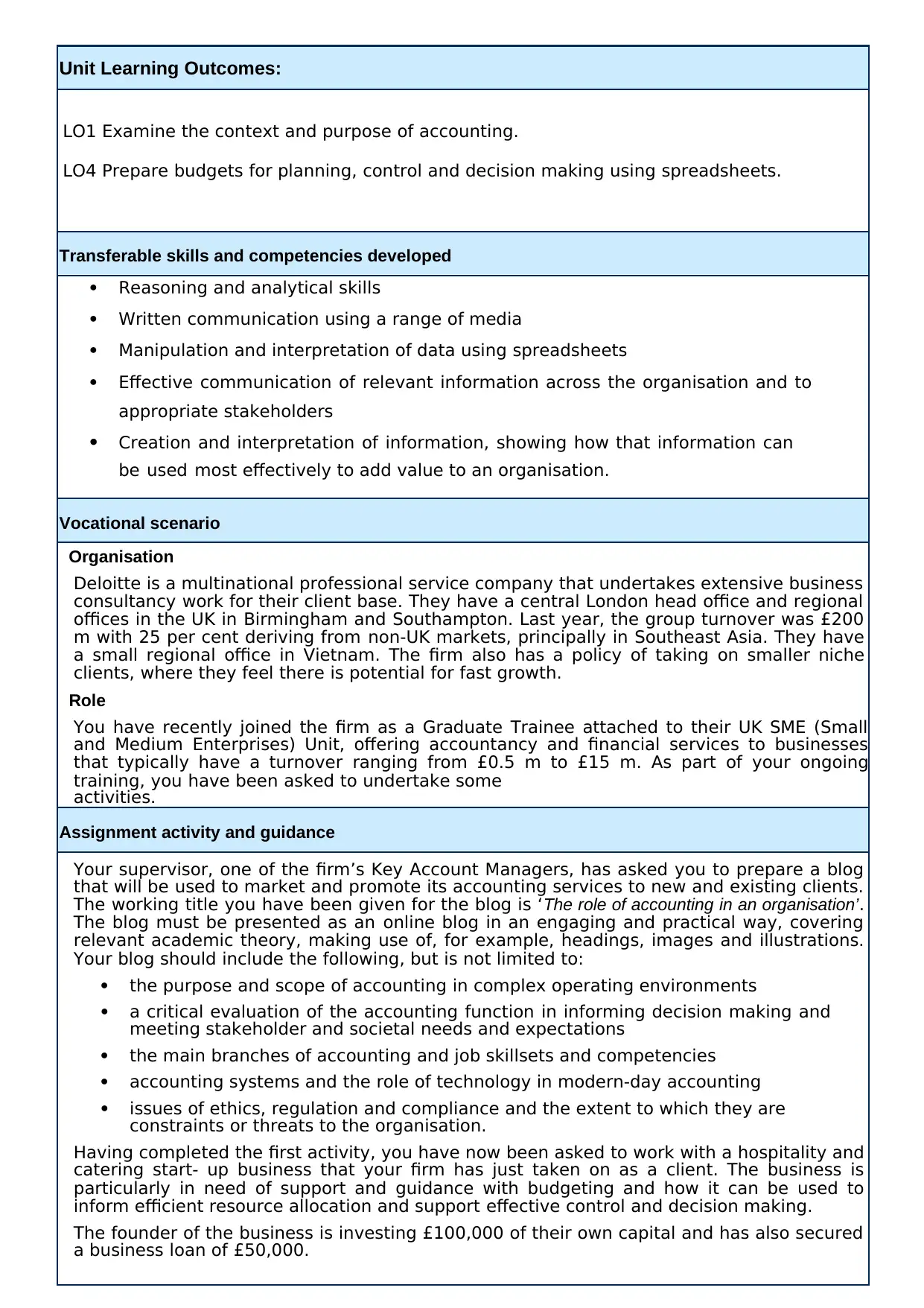
Unit Learning Outcomes:
LO1 Examine the context and purpose of accounting.
LO4 Prepare budgets for planning, control and decision making using spreadsheets.
Transferable skills and competencies developed
Reasoning and analytical skills
Written communication using a range of media
Manipulation and interpretation of data using spreadsheets
Effective communication of relevant information across the organisation and to
appropriate stakeholders
Creation and interpretation of information, showing how that information can
be used most effectively to add value to an organisation.
Vocational scenario
Organisation
Deloitte is a multinational professional service company that undertakes extensive business
consultancy work for their client base. They have a central London head office and regional
offices in the UK in Birmingham and Southampton. Last year, the group turnover was £200
m with 25 per cent deriving from non-UK markets, principally in Southeast Asia. They have
a small regional office in Vietnam. The firm also has a policy of taking on smaller niche
clients, where they feel there is potential for fast growth.
Role
You have recently joined the firm as a Graduate Trainee attached to their UK SME (Small
and Medium Enterprises) Unit, offering accountancy and financial services to businesses
that typically have a turnover ranging from £0.5 m to £15 m. As part of your ongoing
training, you have been asked to undertake some
activities.
Assignment activity and guidance
Your supervisor, one of the firm’s Key Account Managers, has asked you to prepare a blog
that will be used to market and promote its accounting services to new and existing clients.
The working title you have been given for the blog is ‘The role of accounting in an organisation’.
The blog must be presented as an online blog in an engaging and practical way, covering
relevant academic theory, making use of, for example, headings, images and illustrations.
Your blog should include the following, but is not limited to:
the purpose and scope of accounting in complex operating environments
a critical evaluation of the accounting function in informing decision making and
meeting stakeholder and societal needs and expectations
the main branches of accounting and job skillsets and competencies
accounting systems and the role of technology in modern-day accounting
issues of ethics, regulation and compliance and the extent to which they are
constraints or threats to the organisation.
Having completed the first activity, you have now been asked to work with a hospitality and
catering start- up business that your firm has just taken on as a client. The business is
particularly in need of support and guidance with budgeting and how it can be used to
inform efficient resource allocation and support effective control and decision making.
The founder of the business is investing £100,000 of their own capital and has also secured
a business loan of £50,000.
LO1 Examine the context and purpose of accounting.
LO4 Prepare budgets for planning, control and decision making using spreadsheets.
Transferable skills and competencies developed
Reasoning and analytical skills
Written communication using a range of media
Manipulation and interpretation of data using spreadsheets
Effective communication of relevant information across the organisation and to
appropriate stakeholders
Creation and interpretation of information, showing how that information can
be used most effectively to add value to an organisation.
Vocational scenario
Organisation
Deloitte is a multinational professional service company that undertakes extensive business
consultancy work for their client base. They have a central London head office and regional
offices in the UK in Birmingham and Southampton. Last year, the group turnover was £200
m with 25 per cent deriving from non-UK markets, principally in Southeast Asia. They have
a small regional office in Vietnam. The firm also has a policy of taking on smaller niche
clients, where they feel there is potential for fast growth.
Role
You have recently joined the firm as a Graduate Trainee attached to their UK SME (Small
and Medium Enterprises) Unit, offering accountancy and financial services to businesses
that typically have a turnover ranging from £0.5 m to £15 m. As part of your ongoing
training, you have been asked to undertake some
activities.
Assignment activity and guidance
Your supervisor, one of the firm’s Key Account Managers, has asked you to prepare a blog
that will be used to market and promote its accounting services to new and existing clients.
The working title you have been given for the blog is ‘The role of accounting in an organisation’.
The blog must be presented as an online blog in an engaging and practical way, covering
relevant academic theory, making use of, for example, headings, images and illustrations.
Your blog should include the following, but is not limited to:
the purpose and scope of accounting in complex operating environments
a critical evaluation of the accounting function in informing decision making and
meeting stakeholder and societal needs and expectations
the main branches of accounting and job skillsets and competencies
accounting systems and the role of technology in modern-day accounting
issues of ethics, regulation and compliance and the extent to which they are
constraints or threats to the organisation.
Having completed the first activity, you have now been asked to work with a hospitality and
catering start- up business that your firm has just taken on as a client. The business is
particularly in need of support and guidance with budgeting and how it can be used to
inform efficient resource allocation and support effective control and decision making.
The founder of the business is investing £100,000 of their own capital and has also secured
a business loan of £50,000.
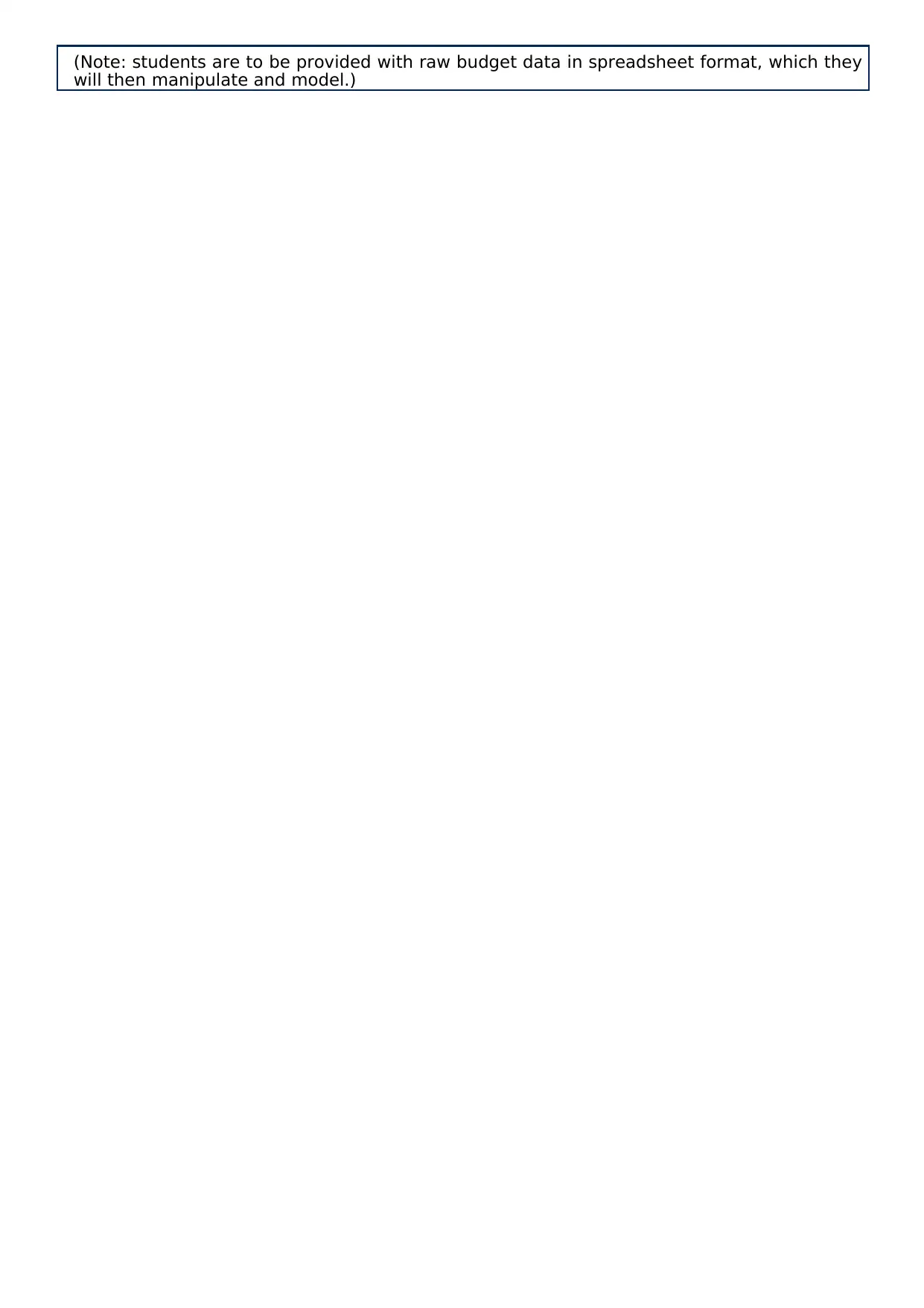
(Note: students are to be provided with raw budget data in spreadsheet format, which they
will then manipulate and model.)
will then manipulate and model.)
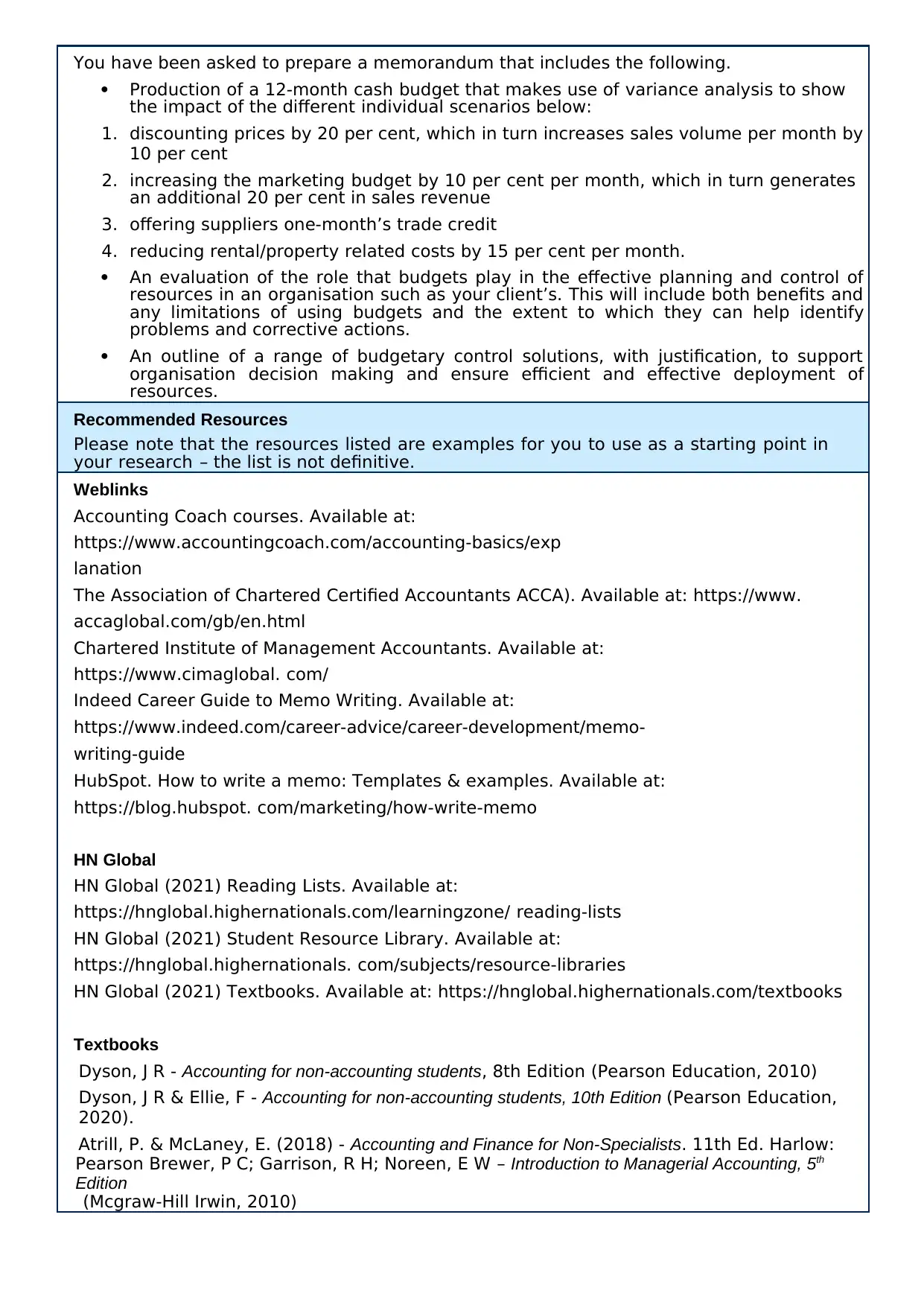
You have been asked to prepare a memorandum that includes the following.
Production of a 12-month cash budget that makes use of variance analysis to show
the impact of the different individual scenarios below:
1. discounting prices by 20 per cent, which in turn increases sales volume per month by
10 per cent
2. increasing the marketing budget by 10 per cent per month, which in turn generates
an additional 20 per cent in sales revenue
3. offering suppliers one-month’s trade credit
4. reducing rental/property related costs by 15 per cent per month.
An evaluation of the role that budgets play in the effective planning and control of
resources in an organisation such as your client’s. This will include both benefits and
any limitations of using budgets and the extent to which they can help identify
problems and corrective actions.
An outline of a range of budgetary control solutions, with justification, to support
organisation decision making and ensure efficient and effective deployment of
resources.
Recommended Resources
Please note that the resources listed are examples for you to use as a starting point in
your research – the list is not definitive.
Weblinks
Accounting Coach courses. Available at:
https://www.accountingcoach.com/accounting-basics/exp
lanation
The Association of Chartered Certified Accountants ACCA). Available at: https://www.
accaglobal.com/gb/en.html
Chartered Institute of Management Accountants. Available at:
https://www.cimaglobal. com/
Indeed Career Guide to Memo Writing. Available at:
https://www.indeed.com/career-advice/career-development/memo-
writing-guide
HubSpot. How to write a memo: Templates & examples. Available at:
https://blog.hubspot. com/marketing/how-write-memo
HN Global
HN Global (2021) Reading Lists. Available at:
https://hnglobal.highernationals.com/learningzone/ reading-lists
HN Global (2021) Student Resource Library. Available at:
https://hnglobal.highernationals. com/subjects/resource-libraries
HN Global (2021) Textbooks. Available at: https://hnglobal.highernationals.com/textbooks
Textbooks
Dyson, J R - Accounting for non-accounting students, 8th Edition (Pearson Education, 2010)
Dyson, J R & Ellie, F - Accounting for non-accounting students, 10th Edition (Pearson Education,
2020).
Atrill, P. & McLaney, E. (2018) - Accounting and Finance for Non-Specialists. 11th Ed. Harlow:
Pearson Brewer, P C; Garrison, R H; Noreen, E W – Introduction to Managerial Accounting, 5th
Edition
(Mcgraw-Hill Irwin, 2010)
Production of a 12-month cash budget that makes use of variance analysis to show
the impact of the different individual scenarios below:
1. discounting prices by 20 per cent, which in turn increases sales volume per month by
10 per cent
2. increasing the marketing budget by 10 per cent per month, which in turn generates
an additional 20 per cent in sales revenue
3. offering suppliers one-month’s trade credit
4. reducing rental/property related costs by 15 per cent per month.
An evaluation of the role that budgets play in the effective planning and control of
resources in an organisation such as your client’s. This will include both benefits and
any limitations of using budgets and the extent to which they can help identify
problems and corrective actions.
An outline of a range of budgetary control solutions, with justification, to support
organisation decision making and ensure efficient and effective deployment of
resources.
Recommended Resources
Please note that the resources listed are examples for you to use as a starting point in
your research – the list is not definitive.
Weblinks
Accounting Coach courses. Available at:
https://www.accountingcoach.com/accounting-basics/exp
lanation
The Association of Chartered Certified Accountants ACCA). Available at: https://www.
accaglobal.com/gb/en.html
Chartered Institute of Management Accountants. Available at:
https://www.cimaglobal. com/
Indeed Career Guide to Memo Writing. Available at:
https://www.indeed.com/career-advice/career-development/memo-
writing-guide
HubSpot. How to write a memo: Templates & examples. Available at:
https://blog.hubspot. com/marketing/how-write-memo
HN Global
HN Global (2021) Reading Lists. Available at:
https://hnglobal.highernationals.com/learningzone/ reading-lists
HN Global (2021) Student Resource Library. Available at:
https://hnglobal.highernationals. com/subjects/resource-libraries
HN Global (2021) Textbooks. Available at: https://hnglobal.highernationals.com/textbooks
Textbooks
Dyson, J R - Accounting for non-accounting students, 8th Edition (Pearson Education, 2010)
Dyson, J R & Ellie, F - Accounting for non-accounting students, 10th Edition (Pearson Education,
2020).
Atrill, P. & McLaney, E. (2018) - Accounting and Finance for Non-Specialists. 11th Ed. Harlow:
Pearson Brewer, P C; Garrison, R H; Noreen, E W – Introduction to Managerial Accounting, 5th
Edition
(Mcgraw-Hill Irwin, 2010)
Secure Best Marks with AI Grader
Need help grading? Try our AI Grader for instant feedback on your assignments.
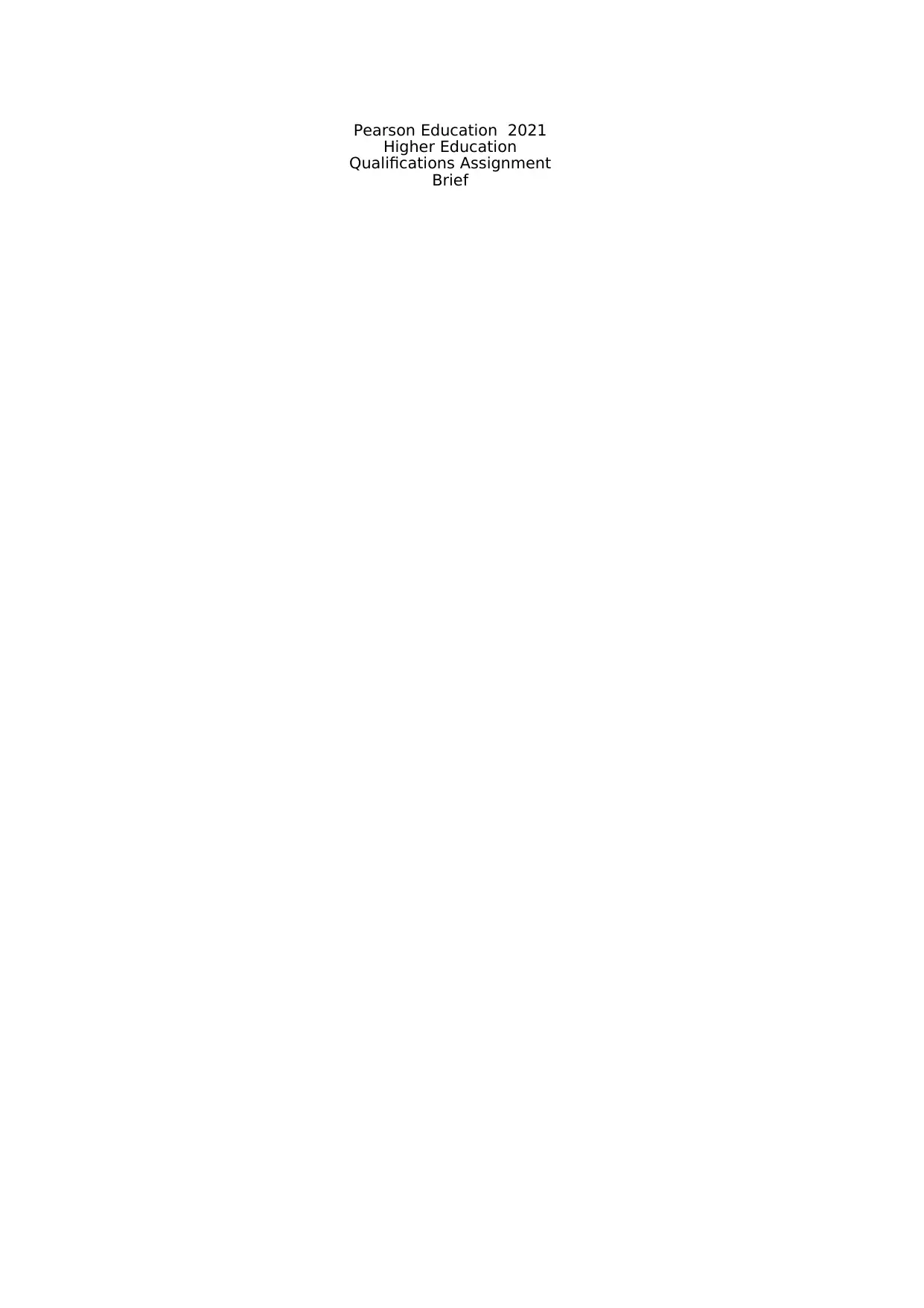
Pearson Education 2021
Higher Education
Qualifications Assignment
Brief
Higher Education
Qualifications Assignment
Brief
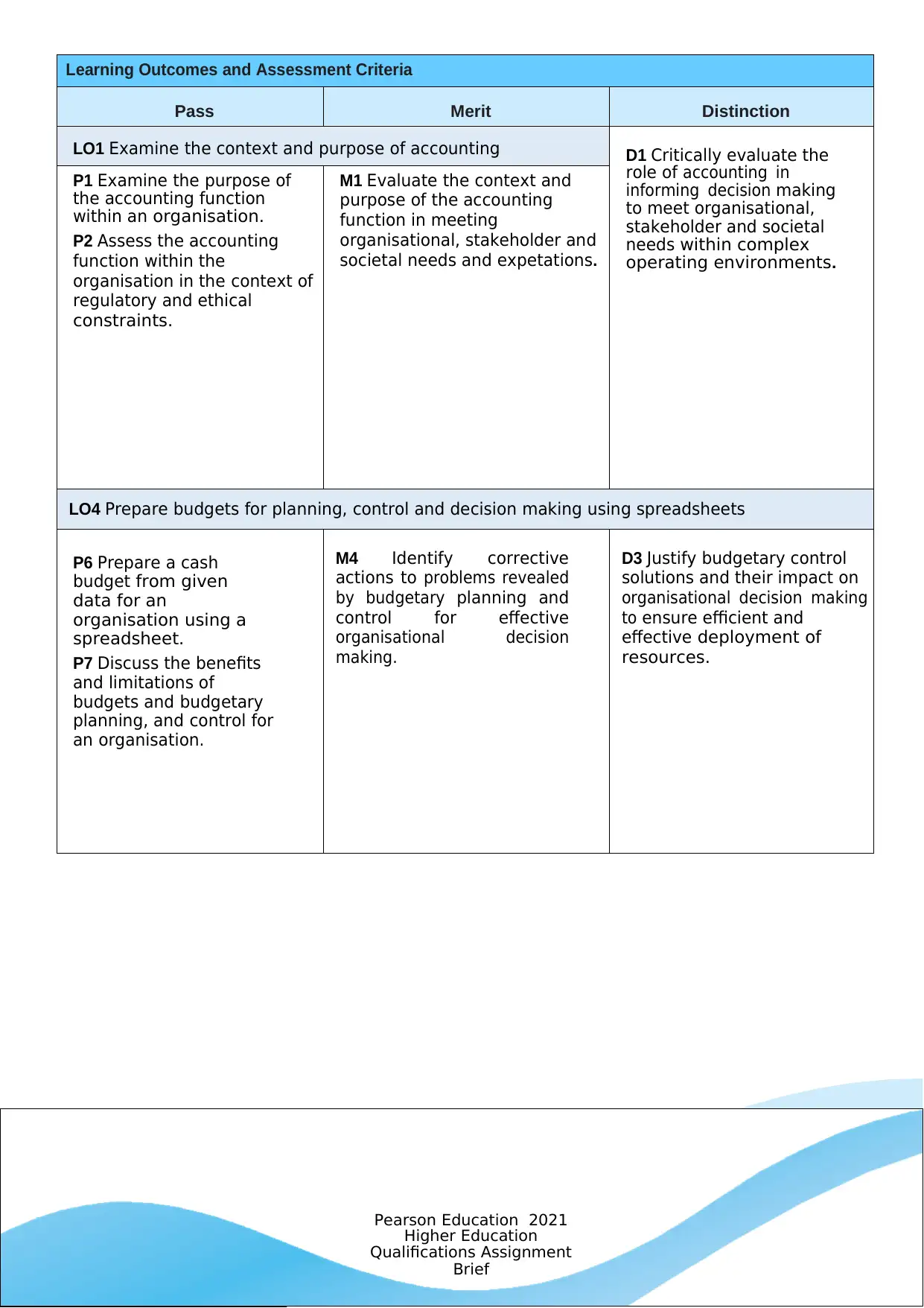
Learning Outcomes and Assessment Criteria
Pass Merit Distinction
LO1 Examine the context and purpose of accounting D1 Critically evaluate the
role of accounting in
informing decision making
to meet organisational,
stakeholder and societal
needs within complex
operating environments.
P1 Examine the purpose of
the accounting function
within an organisation.
P2 Assess the accounting
function within the
organisation in the context of
regulatory and ethical
constraints.
M1 Evaluate the context and
purpose of the accounting
function in meeting
organisational, stakeholder and
societal needs and expetations.
LO4 Prepare budgets for planning, control and decision making using spreadsheets
P6 Prepare a cash
budget from given
data for an
organisation using a
spreadsheet.
P7 Discuss the benefits
and limitations of
budgets and budgetary
planning, and control for
an organisation.
M4 Identify corrective
actions to problems revealed
by budgetary planning and
control for effective
organisational decision
making.
D3 Justify budgetary control
solutions and their impact on
organisational decision making
to ensure efficient and
effective deployment of
resources.
Pearson Education 2021
Higher Education
Qualifications Assignment
Brief
Pass Merit Distinction
LO1 Examine the context and purpose of accounting D1 Critically evaluate the
role of accounting in
informing decision making
to meet organisational,
stakeholder and societal
needs within complex
operating environments.
P1 Examine the purpose of
the accounting function
within an organisation.
P2 Assess the accounting
function within the
organisation in the context of
regulatory and ethical
constraints.
M1 Evaluate the context and
purpose of the accounting
function in meeting
organisational, stakeholder and
societal needs and expetations.
LO4 Prepare budgets for planning, control and decision making using spreadsheets
P6 Prepare a cash
budget from given
data for an
organisation using a
spreadsheet.
P7 Discuss the benefits
and limitations of
budgets and budgetary
planning, and control for
an organisation.
M4 Identify corrective
actions to problems revealed
by budgetary planning and
control for effective
organisational decision
making.
D3 Justify budgetary control
solutions and their impact on
organisational decision making
to ensure efficient and
effective deployment of
resources.
Pearson Education 2021
Higher Education
Qualifications Assignment
Brief
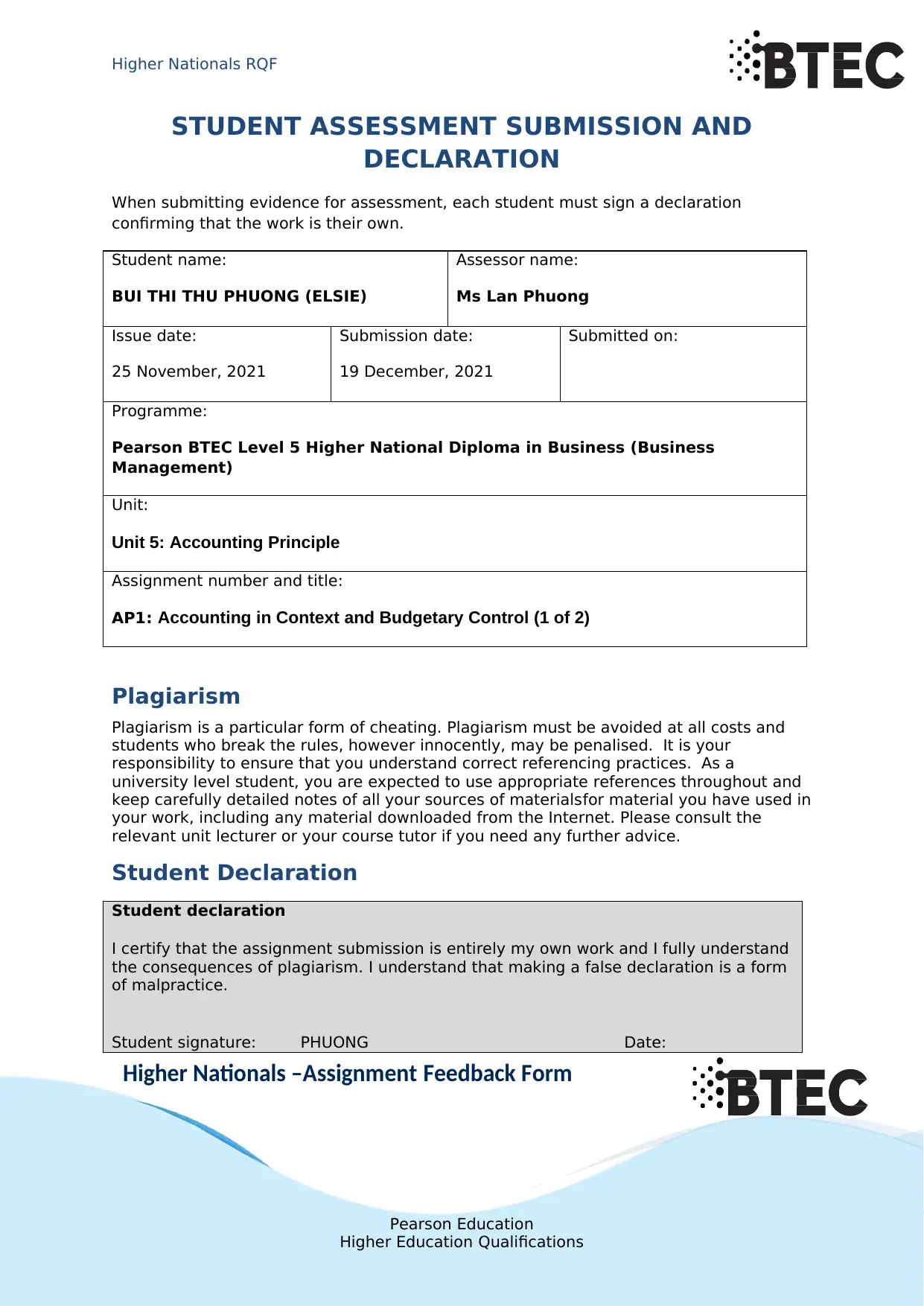
Higher Nationals RQF
STUDENT ASSESSMENT SUBMISSION AND
DECLARATION
When submitting evidence for assessment, each student must sign a declaration
confirming that the work is their own.
Student name:
BUI THI THU PHUONG (ELSIE)
Assessor name:
Ms Lan Phuong
Issue date:
25 November, 2021
Submission date:
19 December, 2021
Submitted on:
Programme:
Pearson BTEC Level 5 Higher National Diploma in Business (Business
Management)
Unit:
Unit 5: Accounting Principle
Assignment number and title:
AP1: Accounting in Context and Budgetary Control (1 of 2)
Plagiarism
Plagiarism is a particular form of cheating. Plagiarism must be avoided at all costs and
students who break the rules, however innocently, may be penalised. It is your
responsibility to ensure that you understand correct referencing practices. As a
university level student, you are expected to use appropriate references throughout and
keep carefully detailed notes of all your sources of materialsfor material you have used in
your work, including any material downloaded from the Internet. Please consult the
relevant unit lecturer or your course tutor if you need any further advice.
Student Declaration
Student declaration
I certify that the assignment submission is entirely my own work and I fully understand
the consequences of plagiarism. I understand that making a false declaration is a form
of malpractice.
Student signature: PHUONG Date:
Higher Nationals –Assignment Feedback Form
Pearson Education
Higher Education Qualifications
STUDENT ASSESSMENT SUBMISSION AND
DECLARATION
When submitting evidence for assessment, each student must sign a declaration
confirming that the work is their own.
Student name:
BUI THI THU PHUONG (ELSIE)
Assessor name:
Ms Lan Phuong
Issue date:
25 November, 2021
Submission date:
19 December, 2021
Submitted on:
Programme:
Pearson BTEC Level 5 Higher National Diploma in Business (Business
Management)
Unit:
Unit 5: Accounting Principle
Assignment number and title:
AP1: Accounting in Context and Budgetary Control (1 of 2)
Plagiarism
Plagiarism is a particular form of cheating. Plagiarism must be avoided at all costs and
students who break the rules, however innocently, may be penalised. It is your
responsibility to ensure that you understand correct referencing practices. As a
university level student, you are expected to use appropriate references throughout and
keep carefully detailed notes of all your sources of materialsfor material you have used in
your work, including any material downloaded from the Internet. Please consult the
relevant unit lecturer or your course tutor if you need any further advice.
Student Declaration
Student declaration
I certify that the assignment submission is entirely my own work and I fully understand
the consequences of plagiarism. I understand that making a false declaration is a form
of malpractice.
Student signature: PHUONG Date:
Higher Nationals –Assignment Feedback Form
Pearson Education
Higher Education Qualifications
Paraphrase This Document
Need a fresh take? Get an instant paraphrase of this document with our AI Paraphraser
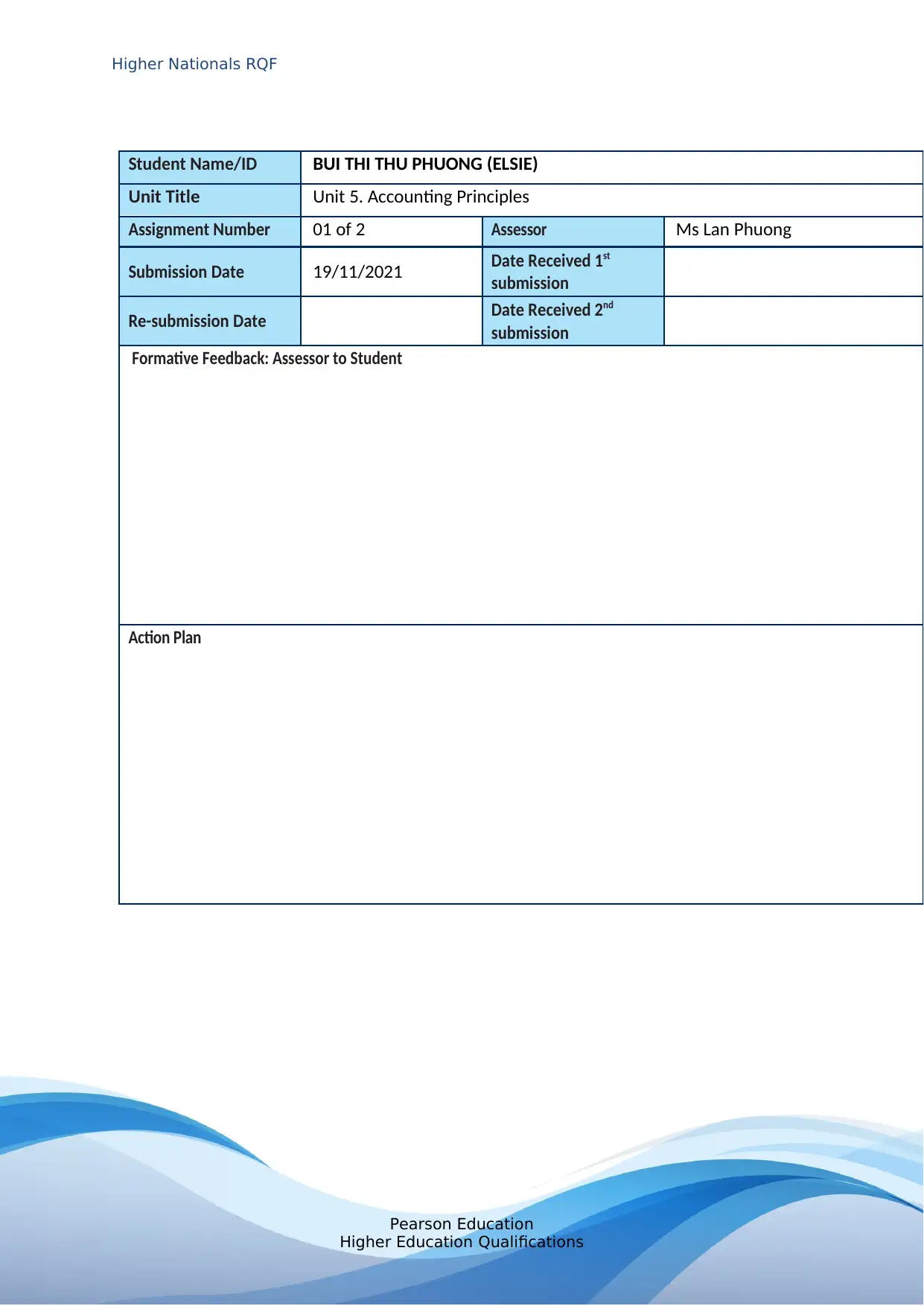
Higher Nationals RQF
Student Name/ID BUI THI THU PHUONG (ELSIE)
Unit Title Unit 5. Accounting Principles
Assignment Number 01 of 2 Assessor Ms Lan Phuong
Submission Date 19/11/2021 Date Received 1 st
submission
Re-submission Date Date Received 2 nd
submission
Formative Feedback: Assessor to Student
Action Plan
Pearson Education
Higher Education Qualifications
Student Name/ID BUI THI THU PHUONG (ELSIE)
Unit Title Unit 5. Accounting Principles
Assignment Number 01 of 2 Assessor Ms Lan Phuong
Submission Date 19/11/2021 Date Received 1 st
submission
Re-submission Date Date Received 2 nd
submission
Formative Feedback: Assessor to Student
Action Plan
Pearson Education
Higher Education Qualifications
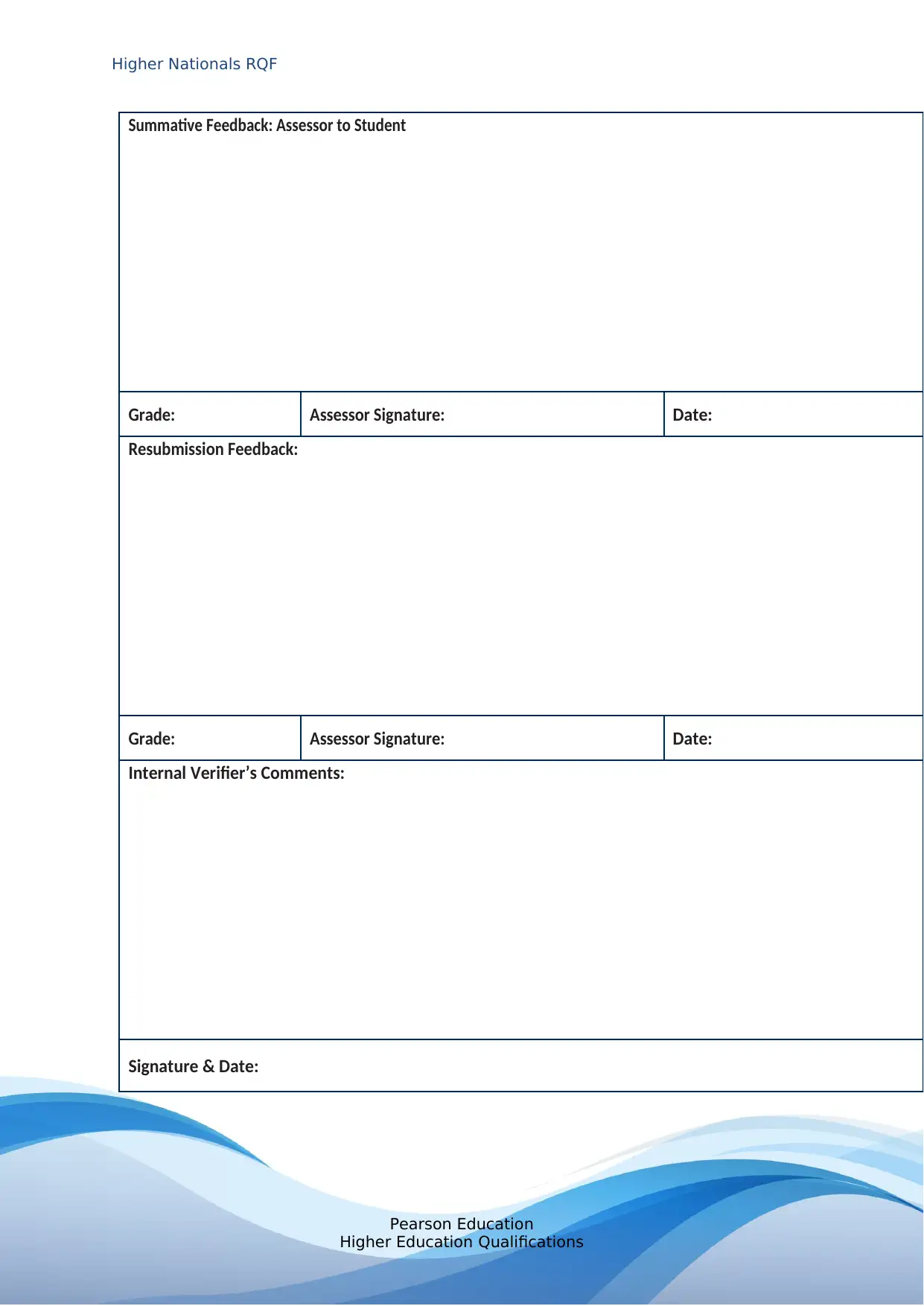
Higher Nationals RQF
Summative Feedback: Assessor to Student
Grade: Assessor Signature: Date:
Resubmission Feedback:
Grade: Assessor Signature: Date:
Internal Verifier’s Comments:
Signature & Date:
Pearson Education
Higher Education Qualifications
Summative Feedback: Assessor to Student
Grade: Assessor Signature: Date:
Resubmission Feedback:
Grade: Assessor Signature: Date:
Internal Verifier’s Comments:
Signature & Date:
Pearson Education
Higher Education Qualifications
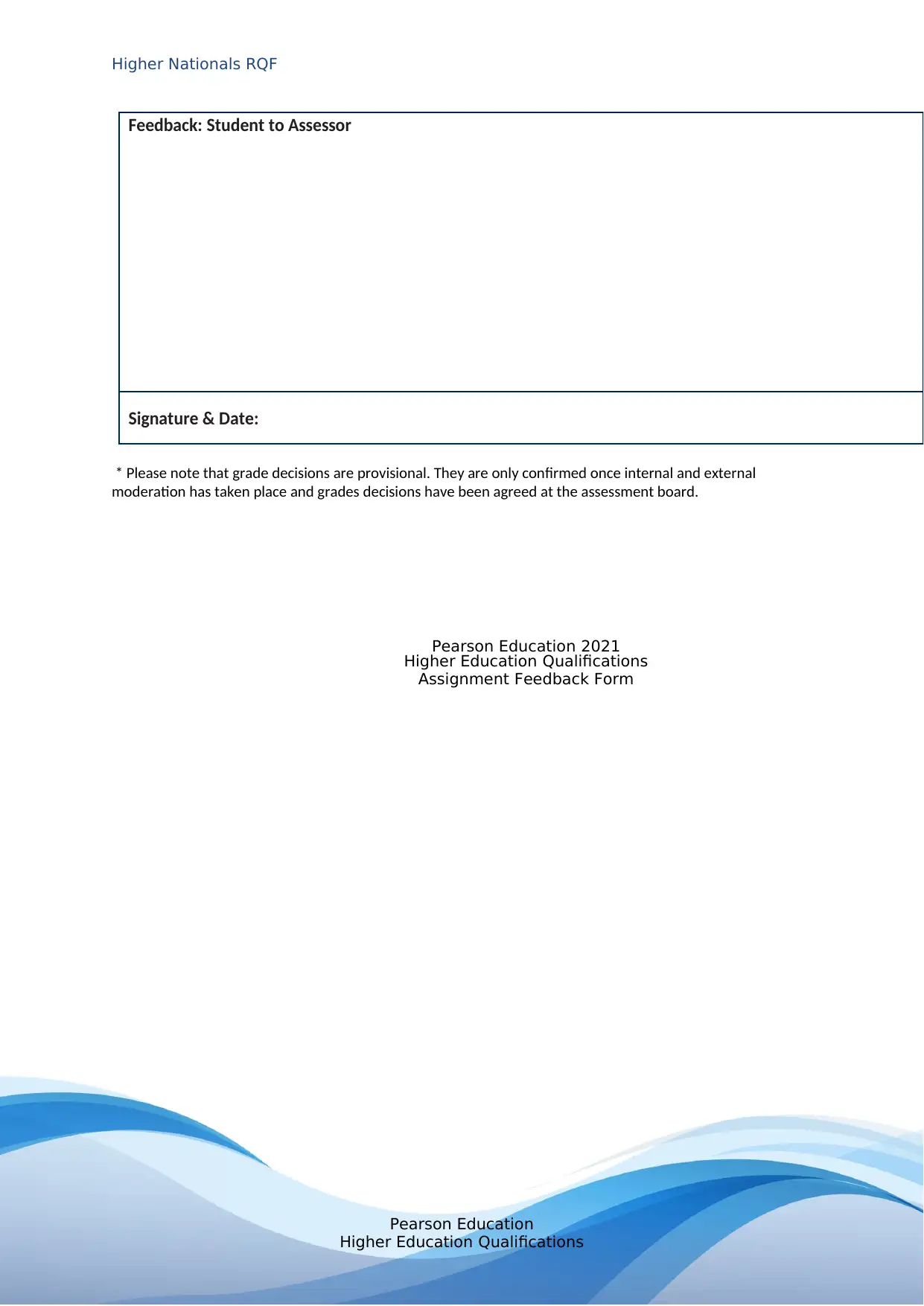
Higher Nationals RQF
Feedback: Student to Assessor
Signature & Date:
* Please note that grade decisions are provisional. They are only confirmed once internal and external
moderation has taken place and grades decisions have been agreed at the assessment board.
Pearson Education
Higher Education Qualifications
Pearson Education 2021
Higher Education Qualifications
Assignment Feedback Form
Feedback: Student to Assessor
Signature & Date:
* Please note that grade decisions are provisional. They are only confirmed once internal and external
moderation has taken place and grades decisions have been agreed at the assessment board.
Pearson Education
Higher Education Qualifications
Pearson Education 2021
Higher Education Qualifications
Assignment Feedback Form
Secure Best Marks with AI Grader
Need help grading? Try our AI Grader for instant feedback on your assignments.
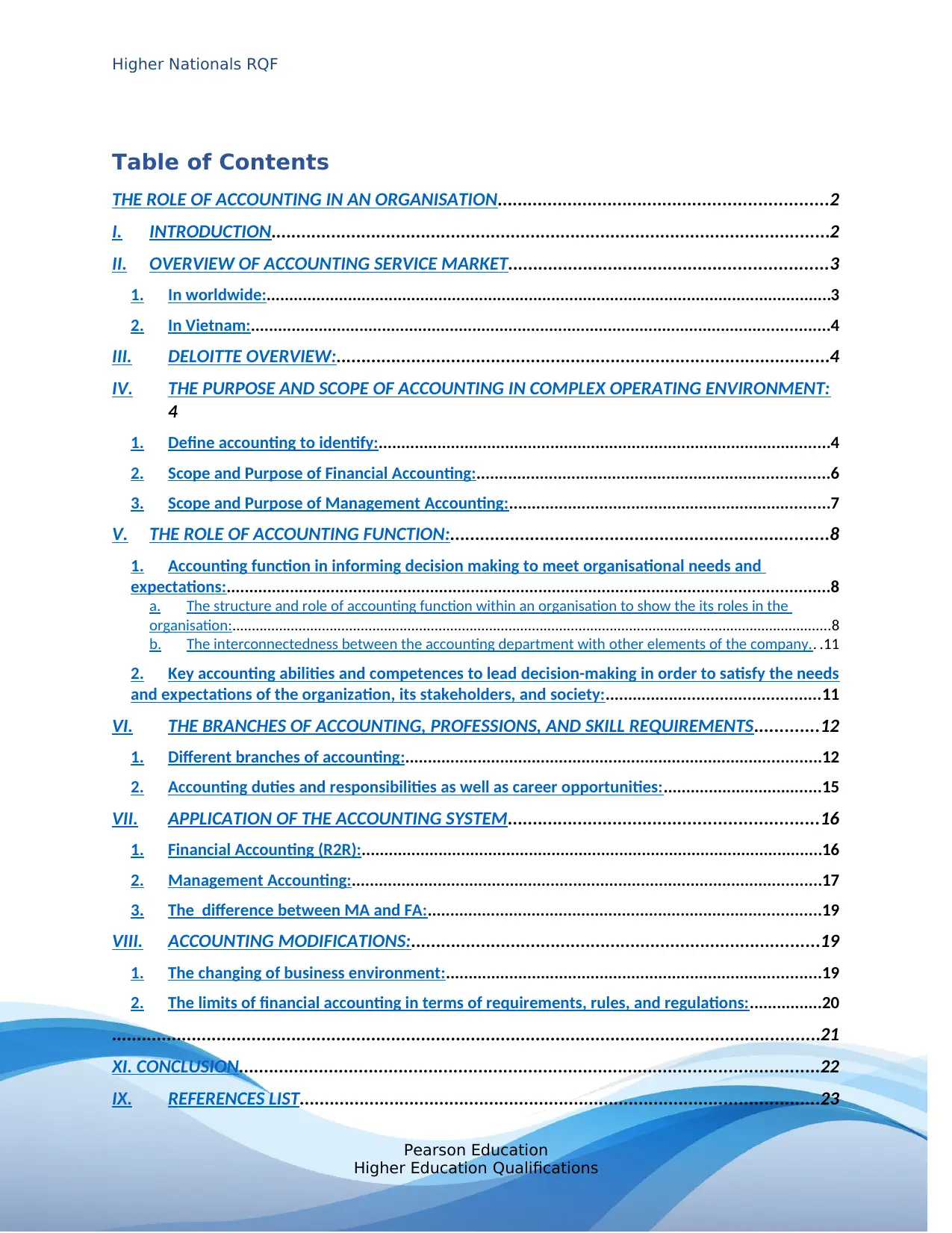
Higher Nationals RQF
Table of Contents
THE ROLE OF ACCOUNTING IN AN ORGANISATION..................................................................2
I. INTRODUCTION................................................................................................................2
II. OVERVIEW OF ACCOUNTING SERVICE MARKET................................................................3
1. In worldwide:.............................................................................................................................3
2. In Vietnam:................................................................................................................................4
III. DELOITTE OVERVIEW:...................................................................................................4
IV. THE PURPOSE AND SCOPE OF ACCOUNTING IN COMPLEX OPERATING ENVIRONMENT:
4
1. Define accounting to identify:....................................................................................................4
2. Scope and Purpose of Financial Accounting:..............................................................................6
3. Scope and Purpose of Management Accounting:.......................................................................7
V. THE ROLE OF ACCOUNTING FUNCTION:............................................................................8
1. Accounting function in informing decision making to meet organisational needs and
expectations:.....................................................................................................................................8
a. The structure and role of accounting function within an organisation to show the its roles in the
organisation:..........................................................................................................................................................8
b. The interconnectedness between the accounting department with other elements of the company.. .11
2. Key accounting abilities and competences to lead decision-making in order to satisfy the needs
and expectations of the organization, its stakeholders, and society:...............................................11
VI. THE BRANCHES OF ACCOUNTING, PROFESSIONS, AND SKILL REQUIREMENTS.............12
1. Different branches of accounting:............................................................................................12
2. Accounting duties and responsibilities as well as career opportunities:...................................15
VII. APPLICATION OF THE ACCOUNTING SYSTEM..............................................................16
1. Financial Accounting (R2R):......................................................................................................16
2. Management Accounting:........................................................................................................17
3. The difference between MA and FA:.......................................................................................19
VIII. ACCOUNTING MODIFICATIONS:..................................................................................19
1. The changing of business environment:...................................................................................19
2. The limits of financial accounting in terms of requirements, rules, and regulations:................20
..............................................................................................................................................21
XI. CONCLUSION....................................................................................................................22
IX. REFERENCES LIST........................................................................................................23
Pearson Education
Higher Education Qualifications
Table of Contents
THE ROLE OF ACCOUNTING IN AN ORGANISATION..................................................................2
I. INTRODUCTION................................................................................................................2
II. OVERVIEW OF ACCOUNTING SERVICE MARKET................................................................3
1. In worldwide:.............................................................................................................................3
2. In Vietnam:................................................................................................................................4
III. DELOITTE OVERVIEW:...................................................................................................4
IV. THE PURPOSE AND SCOPE OF ACCOUNTING IN COMPLEX OPERATING ENVIRONMENT:
4
1. Define accounting to identify:....................................................................................................4
2. Scope and Purpose of Financial Accounting:..............................................................................6
3. Scope and Purpose of Management Accounting:.......................................................................7
V. THE ROLE OF ACCOUNTING FUNCTION:............................................................................8
1. Accounting function in informing decision making to meet organisational needs and
expectations:.....................................................................................................................................8
a. The structure and role of accounting function within an organisation to show the its roles in the
organisation:..........................................................................................................................................................8
b. The interconnectedness between the accounting department with other elements of the company.. .11
2. Key accounting abilities and competences to lead decision-making in order to satisfy the needs
and expectations of the organization, its stakeholders, and society:...............................................11
VI. THE BRANCHES OF ACCOUNTING, PROFESSIONS, AND SKILL REQUIREMENTS.............12
1. Different branches of accounting:............................................................................................12
2. Accounting duties and responsibilities as well as career opportunities:...................................15
VII. APPLICATION OF THE ACCOUNTING SYSTEM..............................................................16
1. Financial Accounting (R2R):......................................................................................................16
2. Management Accounting:........................................................................................................17
3. The difference between MA and FA:.......................................................................................19
VIII. ACCOUNTING MODIFICATIONS:..................................................................................19
1. The changing of business environment:...................................................................................19
2. The limits of financial accounting in terms of requirements, rules, and regulations:................20
..............................................................................................................................................21
XI. CONCLUSION....................................................................................................................22
IX. REFERENCES LIST........................................................................................................23
Pearson Education
Higher Education Qualifications
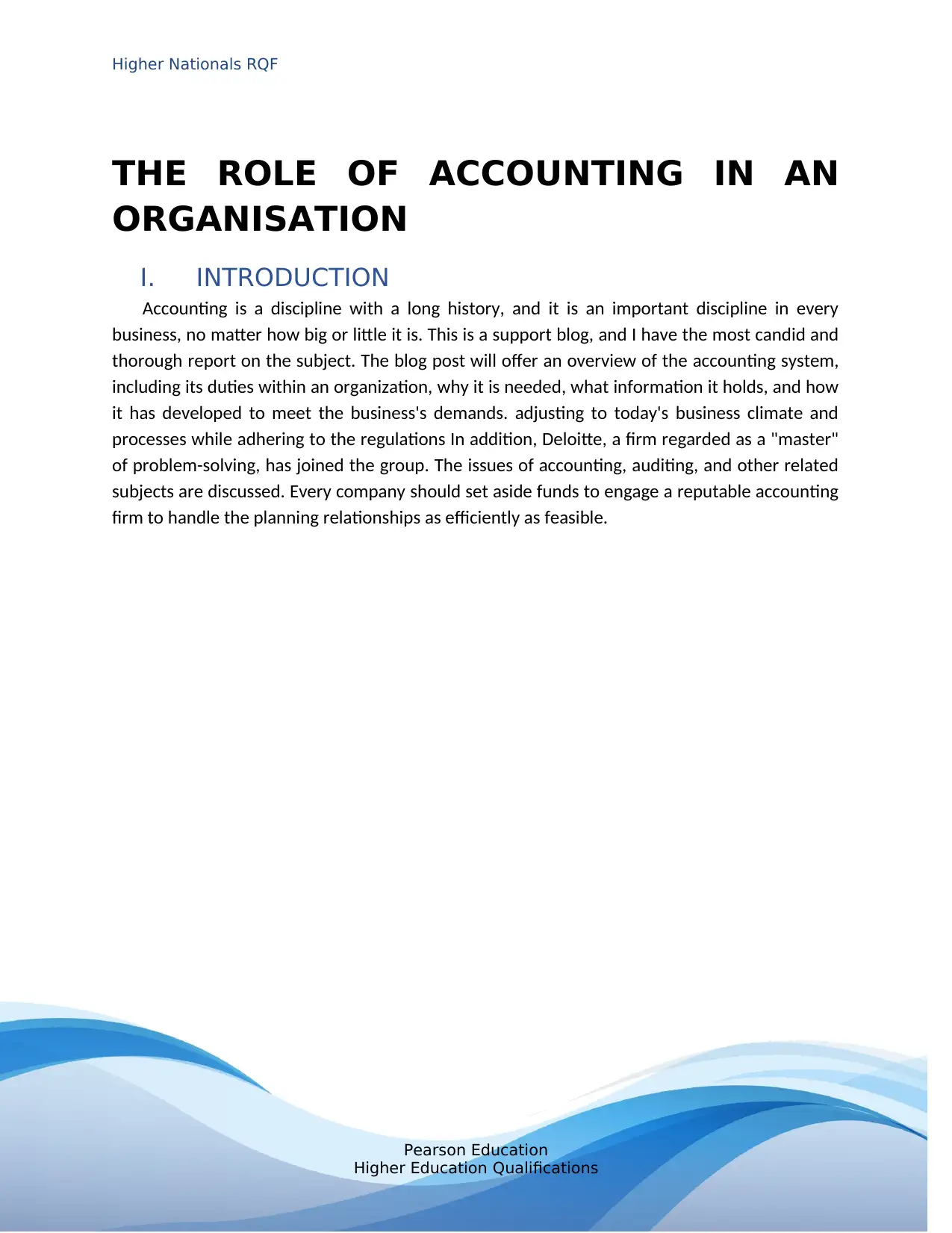
Higher Nationals RQF
THE ROLE OF ACCOUNTING IN AN
ORGANISATION
I. INTRODUCTION
Accounting is a discipline with a long history, and it is an important discipline in every
business, no matter how big or little it is. This is a support blog, and I have the most candid and
thorough report on the subject. The blog post will offer an overview of the accounting system,
including its duties within an organization, why it is needed, what information it holds, and how
it has developed to meet the business's demands. adjusting to today's business climate and
processes while adhering to the regulations In addition, Deloitte, a firm regarded as a "master"
of problem-solving, has joined the group. The issues of accounting, auditing, and other related
subjects are discussed. Every company should set aside funds to engage a reputable accounting
firm to handle the planning relationships as efficiently as feasible.
Pearson Education
Higher Education Qualifications
THE ROLE OF ACCOUNTING IN AN
ORGANISATION
I. INTRODUCTION
Accounting is a discipline with a long history, and it is an important discipline in every
business, no matter how big or little it is. This is a support blog, and I have the most candid and
thorough report on the subject. The blog post will offer an overview of the accounting system,
including its duties within an organization, why it is needed, what information it holds, and how
it has developed to meet the business's demands. adjusting to today's business climate and
processes while adhering to the regulations In addition, Deloitte, a firm regarded as a "master"
of problem-solving, has joined the group. The issues of accounting, auditing, and other related
subjects are discussed. Every company should set aside funds to engage a reputable accounting
firm to handle the planning relationships as efficiently as feasible.
Pearson Education
Higher Education Qualifications
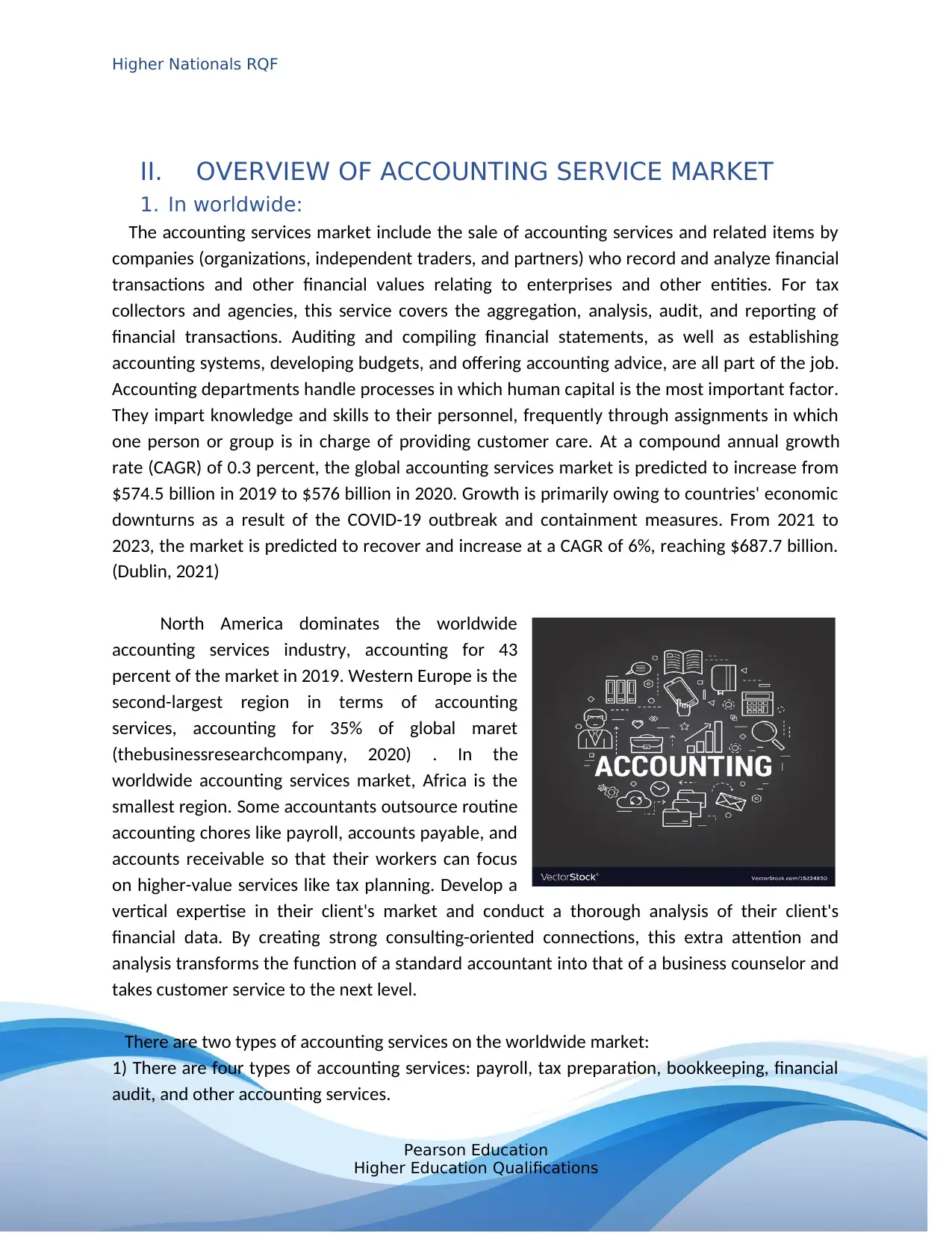
Higher Nationals RQF
II. OVERVIEW OF ACCOUNTING SERVICE MARKET
1. In worldwide:
The accounting services market include the sale of accounting services and related items by
companies (organizations, independent traders, and partners) who record and analyze financial
transactions and other financial values relating to enterprises and other entities. For tax
collectors and agencies, this service covers the aggregation, analysis, audit, and reporting of
financial transactions. Auditing and compiling financial statements, as well as establishing
accounting systems, developing budgets, and offering accounting advice, are all part of the job.
Accounting departments handle processes in which human capital is the most important factor.
They impart knowledge and skills to their personnel, frequently through assignments in which
one person or group is in charge of providing customer care. At a compound annual growth
rate (CAGR) of 0.3 percent, the global accounting services market is predicted to increase from
$574.5 billion in 2019 to $576 billion in 2020. Growth is primarily owing to countries' economic
downturns as a result of the COVID-19 outbreak and containment measures. From 2021 to
2023, the market is predicted to recover and increase at a CAGR of 6%, reaching $687.7 billion.
(Dublin, 2021)
North America dominates the worldwide
accounting services industry, accounting for 43
percent of the market in 2019. Western Europe is the
second-largest region in terms of accounting
services, accounting for 35% of global maret
(thebusinessresearchcompany, 2020) . In the
worldwide accounting services market, Africa is the
smallest region. Some accountants outsource routine
accounting chores like payroll, accounts payable, and
accounts receivable so that their workers can focus
on higher-value services like tax planning. Develop a
vertical expertise in their client's market and conduct a thorough analysis of their client's
financial data. By creating strong consulting-oriented connections, this extra attention and
analysis transforms the function of a standard accountant into that of a business counselor and
takes customer service to the next level.
There are two types of accounting services on the worldwide market:
1) There are four types of accounting services: payroll, tax preparation, bookkeeping, financial
audit, and other accounting services.
Pearson Education
Higher Education Qualifications
II. OVERVIEW OF ACCOUNTING SERVICE MARKET
1. In worldwide:
The accounting services market include the sale of accounting services and related items by
companies (organizations, independent traders, and partners) who record and analyze financial
transactions and other financial values relating to enterprises and other entities. For tax
collectors and agencies, this service covers the aggregation, analysis, audit, and reporting of
financial transactions. Auditing and compiling financial statements, as well as establishing
accounting systems, developing budgets, and offering accounting advice, are all part of the job.
Accounting departments handle processes in which human capital is the most important factor.
They impart knowledge and skills to their personnel, frequently through assignments in which
one person or group is in charge of providing customer care. At a compound annual growth
rate (CAGR) of 0.3 percent, the global accounting services market is predicted to increase from
$574.5 billion in 2019 to $576 billion in 2020. Growth is primarily owing to countries' economic
downturns as a result of the COVID-19 outbreak and containment measures. From 2021 to
2023, the market is predicted to recover and increase at a CAGR of 6%, reaching $687.7 billion.
(Dublin, 2021)
North America dominates the worldwide
accounting services industry, accounting for 43
percent of the market in 2019. Western Europe is the
second-largest region in terms of accounting
services, accounting for 35% of global maret
(thebusinessresearchcompany, 2020) . In the
worldwide accounting services market, Africa is the
smallest region. Some accountants outsource routine
accounting chores like payroll, accounts payable, and
accounts receivable so that their workers can focus
on higher-value services like tax planning. Develop a
vertical expertise in their client's market and conduct a thorough analysis of their client's
financial data. By creating strong consulting-oriented connections, this extra attention and
analysis transforms the function of a standard accountant into that of a business counselor and
takes customer service to the next level.
There are two types of accounting services on the worldwide market:
1) There are four types of accounting services: payroll, tax preparation, bookkeeping, financial
audit, and other accounting services.
Pearson Education
Higher Education Qualifications
Paraphrase This Document
Need a fresh take? Get an instant paraphrase of this document with our AI Paraphraser
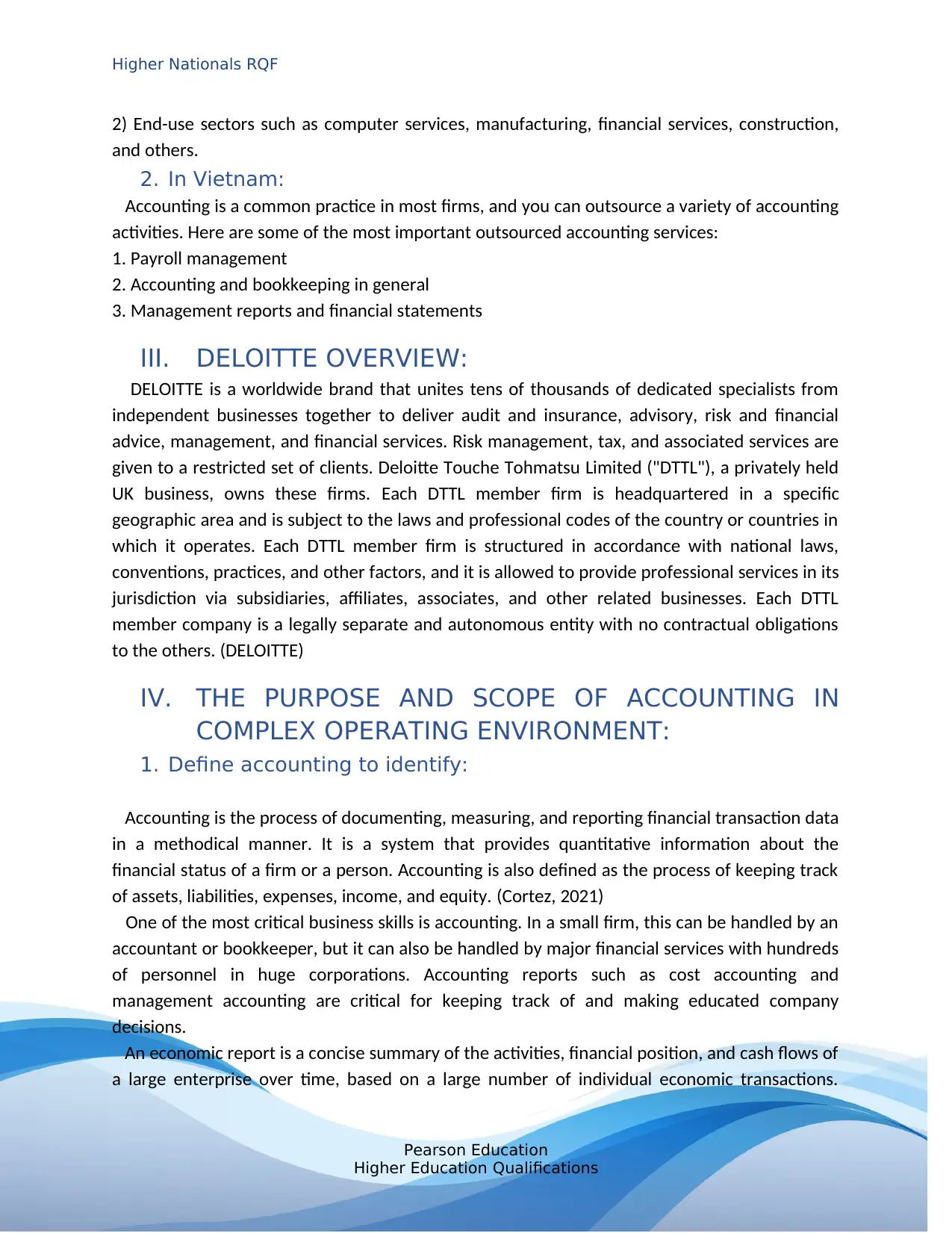
Higher Nationals RQF
2) End-use sectors such as computer services, manufacturing, financial services, construction,
and others.
2. In Vietnam:
Accounting is a common practice in most firms, and you can outsource a variety of accounting
activities. Here are some of the most important outsourced accounting services:
1. Payroll management
2. Accounting and bookkeeping in general
3. Management reports and financial statements
III. DELOITTE OVERVIEW:
DELOITTE is a worldwide brand that unites tens of thousands of dedicated specialists from
independent businesses together to deliver audit and insurance, advisory, risk and financial
advice, management, and financial services. Risk management, tax, and associated services are
given to a restricted set of clients. Deloitte Touche Tohmatsu Limited ("DTTL"), a privately held
UK business, owns these firms. Each DTTL member firm is headquartered in a specific
geographic area and is subject to the laws and professional codes of the country or countries in
which it operates. Each DTTL member firm is structured in accordance with national laws,
conventions, practices, and other factors, and it is allowed to provide professional services in its
jurisdiction via subsidiaries, affiliates, associates, and other related businesses. Each DTTL
member company is a legally separate and autonomous entity with no contractual obligations
to the others. (DELOITTE)
IV. THE PURPOSE AND SCOPE OF ACCOUNTING IN
COMPLEX OPERATING ENVIRONMENT:
1. Define accounting to identify:
Accounting is the process of documenting, measuring, and reporting financial transaction data
in a methodical manner. It is a system that provides quantitative information about the
financial status of a firm or a person. Accounting is also defined as the process of keeping track
of assets, liabilities, expenses, income, and equity. (Cortez, 2021)
One of the most critical business skills is accounting. In a small firm, this can be handled by an
accountant or bookkeeper, but it can also be handled by major financial services with hundreds
of personnel in huge corporations. Accounting reports such as cost accounting and
management accounting are critical for keeping track of and making educated company
decisions.
An economic report is a concise summary of the activities, financial position, and cash flows of
a large enterprise over time, based on a large number of individual economic transactions.
Pearson Education
Higher Education Qualifications
2) End-use sectors such as computer services, manufacturing, financial services, construction,
and others.
2. In Vietnam:
Accounting is a common practice in most firms, and you can outsource a variety of accounting
activities. Here are some of the most important outsourced accounting services:
1. Payroll management
2. Accounting and bookkeeping in general
3. Management reports and financial statements
III. DELOITTE OVERVIEW:
DELOITTE is a worldwide brand that unites tens of thousands of dedicated specialists from
independent businesses together to deliver audit and insurance, advisory, risk and financial
advice, management, and financial services. Risk management, tax, and associated services are
given to a restricted set of clients. Deloitte Touche Tohmatsu Limited ("DTTL"), a privately held
UK business, owns these firms. Each DTTL member firm is headquartered in a specific
geographic area and is subject to the laws and professional codes of the country or countries in
which it operates. Each DTTL member firm is structured in accordance with national laws,
conventions, practices, and other factors, and it is allowed to provide professional services in its
jurisdiction via subsidiaries, affiliates, associates, and other related businesses. Each DTTL
member company is a legally separate and autonomous entity with no contractual obligations
to the others. (DELOITTE)
IV. THE PURPOSE AND SCOPE OF ACCOUNTING IN
COMPLEX OPERATING ENVIRONMENT:
1. Define accounting to identify:
Accounting is the process of documenting, measuring, and reporting financial transaction data
in a methodical manner. It is a system that provides quantitative information about the
financial status of a firm or a person. Accounting is also defined as the process of keeping track
of assets, liabilities, expenses, income, and equity. (Cortez, 2021)
One of the most critical business skills is accounting. In a small firm, this can be handled by an
accountant or bookkeeper, but it can also be handled by major financial services with hundreds
of personnel in huge corporations. Accounting reports such as cost accounting and
management accounting are critical for keeping track of and making educated company
decisions.
An economic report is a concise summary of the activities, financial position, and cash flows of
a large enterprise over time, based on a large number of individual economic transactions.
Pearson Education
Higher Education Qualifications
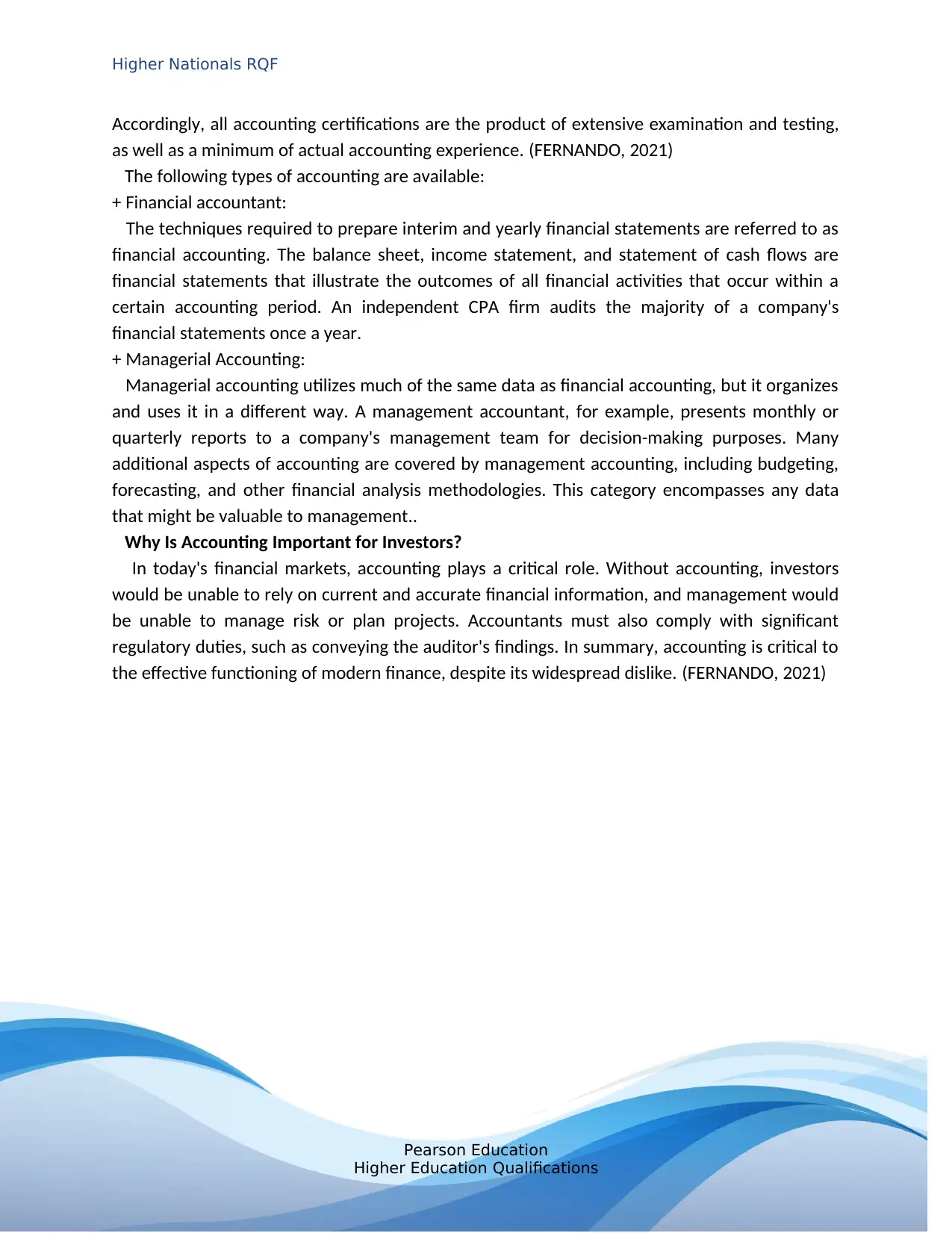
Higher Nationals RQF
Accordingly, all accounting certifications are the product of extensive examination and testing,
as well as a minimum of actual accounting experience. (FERNANDO, 2021)
The following types of accounting are available:
+ Financial accountant:
The techniques required to prepare interim and yearly financial statements are referred to as
financial accounting. The balance sheet, income statement, and statement of cash flows are
financial statements that illustrate the outcomes of all financial activities that occur within a
certain accounting period. An independent CPA firm audits the majority of a company's
financial statements once a year.
+ Managerial Accounting:
Managerial accounting utilizes much of the same data as financial accounting, but it organizes
and uses it in a different way. A management accountant, for example, presents monthly or
quarterly reports to a company's management team for decision-making purposes. Many
additional aspects of accounting are covered by management accounting, including budgeting,
forecasting, and other financial analysis methodologies. This category encompasses any data
that might be valuable to management..
Why Is Accounting Important for Investors?
In today's financial markets, accounting plays a critical role. Without accounting, investors
would be unable to rely on current and accurate financial information, and management would
be unable to manage risk or plan projects. Accountants must also comply with significant
regulatory duties, such as conveying the auditor's findings. In summary, accounting is critical to
the effective functioning of modern finance, despite its widespread dislike. (FERNANDO, 2021)
Pearson Education
Higher Education Qualifications
Accordingly, all accounting certifications are the product of extensive examination and testing,
as well as a minimum of actual accounting experience. (FERNANDO, 2021)
The following types of accounting are available:
+ Financial accountant:
The techniques required to prepare interim and yearly financial statements are referred to as
financial accounting. The balance sheet, income statement, and statement of cash flows are
financial statements that illustrate the outcomes of all financial activities that occur within a
certain accounting period. An independent CPA firm audits the majority of a company's
financial statements once a year.
+ Managerial Accounting:
Managerial accounting utilizes much of the same data as financial accounting, but it organizes
and uses it in a different way. A management accountant, for example, presents monthly or
quarterly reports to a company's management team for decision-making purposes. Many
additional aspects of accounting are covered by management accounting, including budgeting,
forecasting, and other financial analysis methodologies. This category encompasses any data
that might be valuable to management..
Why Is Accounting Important for Investors?
In today's financial markets, accounting plays a critical role. Without accounting, investors
would be unable to rely on current and accurate financial information, and management would
be unable to manage risk or plan projects. Accountants must also comply with significant
regulatory duties, such as conveying the auditor's findings. In summary, accounting is critical to
the effective functioning of modern finance, despite its widespread dislike. (FERNANDO, 2021)
Pearson Education
Higher Education Qualifications
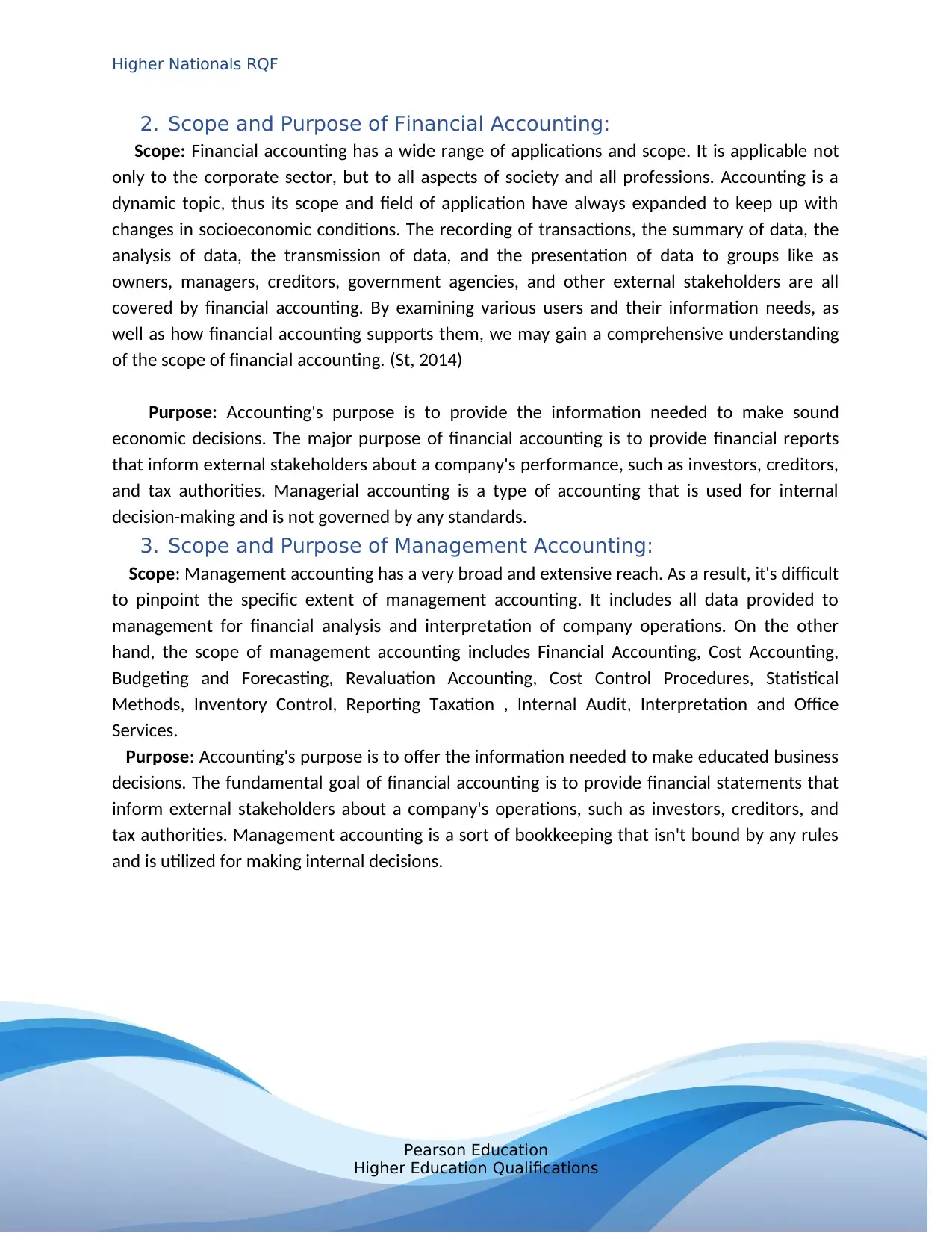
Higher Nationals RQF
2. Scope and Purpose of Financial Accounting:
Scope: Financial accounting has a wide range of applications and scope. It is applicable not
only to the corporate sector, but to all aspects of society and all professions. Accounting is a
dynamic topic, thus its scope and field of application have always expanded to keep up with
changes in socioeconomic conditions. The recording of transactions, the summary of data, the
analysis of data, the transmission of data, and the presentation of data to groups like as
owners, managers, creditors, government agencies, and other external stakeholders are all
covered by financial accounting. By examining various users and their information needs, as
well as how financial accounting supports them, we may gain a comprehensive understanding
of the scope of financial accounting. (St, 2014)
Purpose: Accounting's purpose is to provide the information needed to make sound
economic decisions. The major purpose of financial accounting is to provide financial reports
that inform external stakeholders about a company's performance, such as investors, creditors,
and tax authorities. Managerial accounting is a type of accounting that is used for internal
decision-making and is not governed by any standards.
3. Scope and Purpose of Management Accounting:
Scope: Management accounting has a very broad and extensive reach. As a result, it's difficult
to pinpoint the specific extent of management accounting. It includes all data provided to
management for financial analysis and interpretation of company operations. On the other
hand, the scope of management accounting includes Financial Accounting, Cost Accounting,
Budgeting and Forecasting, Revaluation Accounting, Cost Control Procedures, Statistical
Methods, Inventory Control, Reporting Taxation , Internal Audit, Interpretation and Office
Services.
Purpose: Accounting's purpose is to offer the information needed to make educated business
decisions. The fundamental goal of financial accounting is to provide financial statements that
inform external stakeholders about a company's operations, such as investors, creditors, and
tax authorities. Management accounting is a sort of bookkeeping that isn't bound by any rules
and is utilized for making internal decisions.
Pearson Education
Higher Education Qualifications
2. Scope and Purpose of Financial Accounting:
Scope: Financial accounting has a wide range of applications and scope. It is applicable not
only to the corporate sector, but to all aspects of society and all professions. Accounting is a
dynamic topic, thus its scope and field of application have always expanded to keep up with
changes in socioeconomic conditions. The recording of transactions, the summary of data, the
analysis of data, the transmission of data, and the presentation of data to groups like as
owners, managers, creditors, government agencies, and other external stakeholders are all
covered by financial accounting. By examining various users and their information needs, as
well as how financial accounting supports them, we may gain a comprehensive understanding
of the scope of financial accounting. (St, 2014)
Purpose: Accounting's purpose is to provide the information needed to make sound
economic decisions. The major purpose of financial accounting is to provide financial reports
that inform external stakeholders about a company's performance, such as investors, creditors,
and tax authorities. Managerial accounting is a type of accounting that is used for internal
decision-making and is not governed by any standards.
3. Scope and Purpose of Management Accounting:
Scope: Management accounting has a very broad and extensive reach. As a result, it's difficult
to pinpoint the specific extent of management accounting. It includes all data provided to
management for financial analysis and interpretation of company operations. On the other
hand, the scope of management accounting includes Financial Accounting, Cost Accounting,
Budgeting and Forecasting, Revaluation Accounting, Cost Control Procedures, Statistical
Methods, Inventory Control, Reporting Taxation , Internal Audit, Interpretation and Office
Services.
Purpose: Accounting's purpose is to offer the information needed to make educated business
decisions. The fundamental goal of financial accounting is to provide financial statements that
inform external stakeholders about a company's operations, such as investors, creditors, and
tax authorities. Management accounting is a sort of bookkeeping that isn't bound by any rules
and is utilized for making internal decisions.
Pearson Education
Higher Education Qualifications
Secure Best Marks with AI Grader
Need help grading? Try our AI Grader for instant feedback on your assignments.
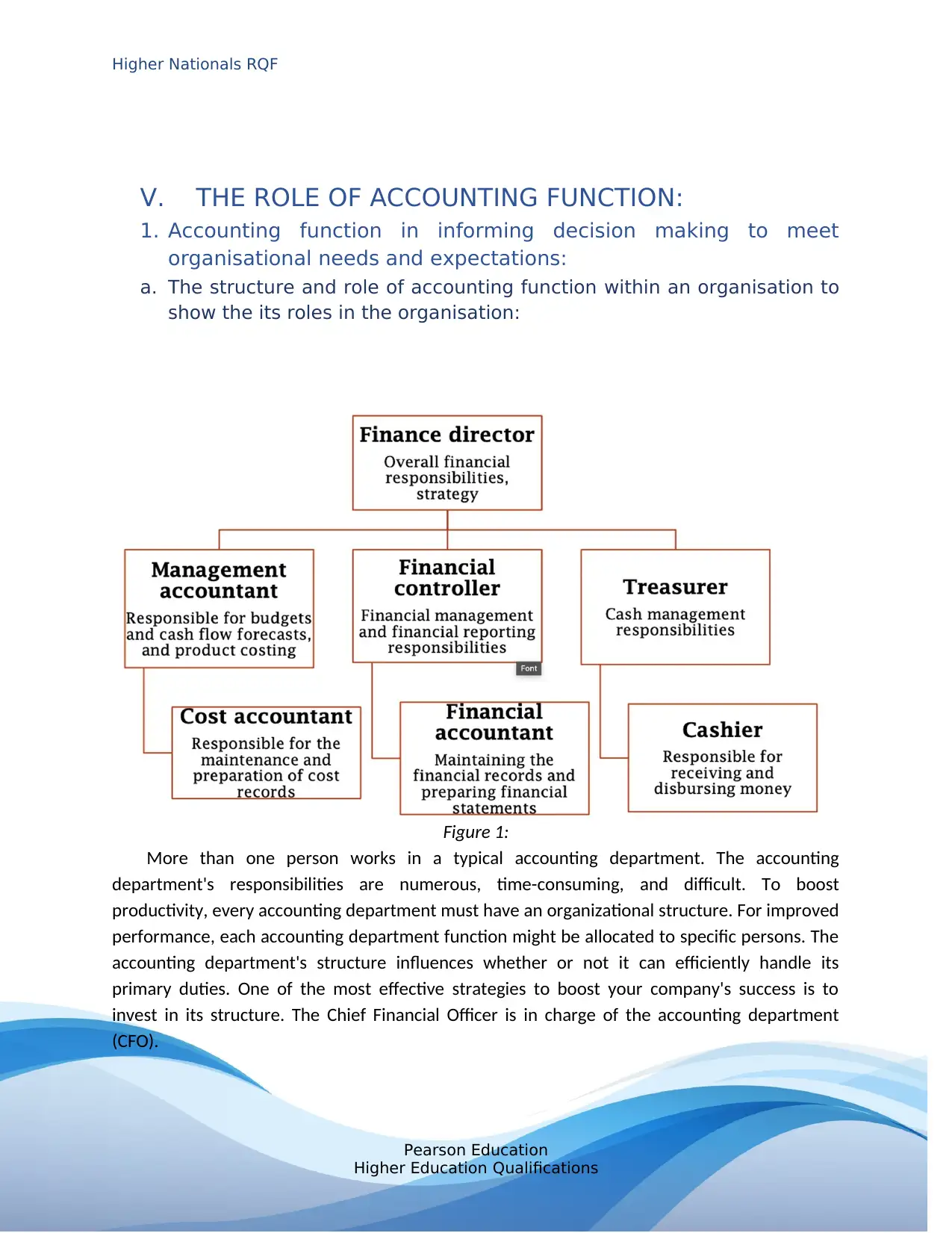
Higher Nationals RQF
V. THE ROLE OF ACCOUNTING FUNCTION:
1. Accounting function in informing decision making to meet
organisational needs and expectations:
a. The structure and role of accounting function within an organisation to
show the its roles in the organisation:
Figure 1:
More than one person works in a typical accounting department. The accounting
department's responsibilities are numerous, time-consuming, and difficult. To boost
productivity, every accounting department must have an organizational structure. For improved
performance, each accounting department function might be allocated to specific persons. The
accounting department's structure influences whether or not it can efficiently handle its
primary duties. One of the most effective strategies to boost your company's success is to
invest in its structure. The Chief Financial Officer is in charge of the accounting department
(CFO).
Pearson Education
Higher Education Qualifications
V. THE ROLE OF ACCOUNTING FUNCTION:
1. Accounting function in informing decision making to meet
organisational needs and expectations:
a. The structure and role of accounting function within an organisation to
show the its roles in the organisation:
Figure 1:
More than one person works in a typical accounting department. The accounting
department's responsibilities are numerous, time-consuming, and difficult. To boost
productivity, every accounting department must have an organizational structure. For improved
performance, each accounting department function might be allocated to specific persons. The
accounting department's structure influences whether or not it can efficiently handle its
primary duties. One of the most effective strategies to boost your company's success is to
invest in its structure. The Chief Financial Officer is in charge of the accounting department
(CFO).
Pearson Education
Higher Education Qualifications
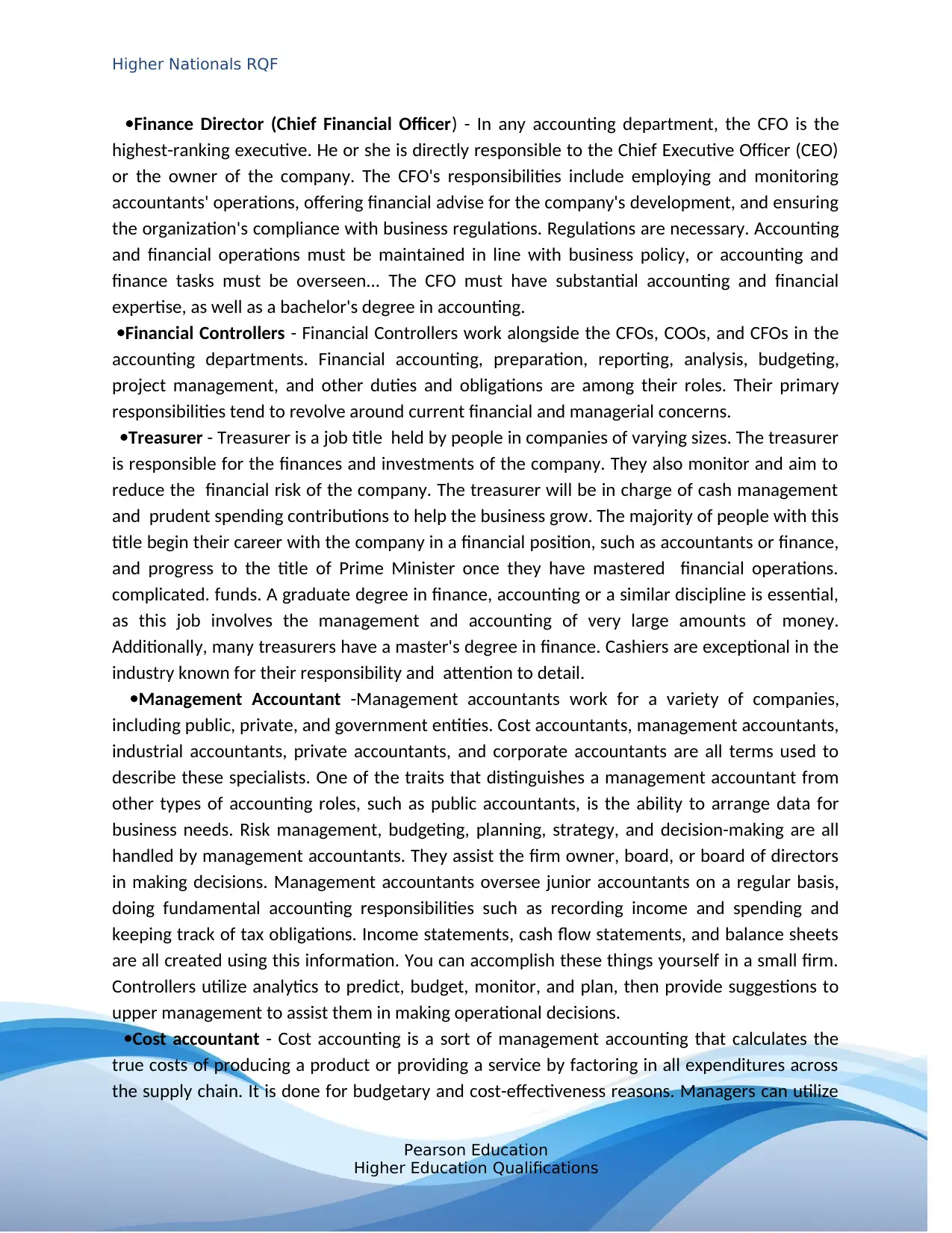
Higher Nationals RQF
Finance Director (Chief Financial Officer) - In any accounting department, the CFO is the
highest-ranking executive. He or she is directly responsible to the Chief Executive Officer (CEO)
or the owner of the company. The CFO's responsibilities include employing and monitoring
accountants' operations, offering financial advise for the company's development, and ensuring
the organization's compliance with business regulations. Regulations are necessary. Accounting
and financial operations must be maintained in line with business policy, or accounting and
finance tasks must be overseen... The CFO must have substantial accounting and financial
expertise, as well as a bachelor's degree in accounting.
Financial Controllers - Financial Controllers work alongside the CFOs, COOs, and CFOs in the
accounting departments. Financial accounting, preparation, reporting, analysis, budgeting,
project management, and other duties and obligations are among their roles. Their primary
responsibilities tend to revolve around current financial and managerial concerns.
Treasurer - Treasurer is a job title held by people in companies of varying sizes. The treasurer
is responsible for the finances and investments of the company. They also monitor and aim to
reduce the financial risk of the company. The treasurer will be in charge of cash management
and prudent spending contributions to help the business grow. The majority of people with this
title begin their career with the company in a financial position, such as accountants or finance,
and progress to the title of Prime Minister once they have mastered financial operations.
complicated. funds. A graduate degree in finance, accounting or a similar discipline is essential,
as this job involves the management and accounting of very large amounts of money.
Additionally, many treasurers have a master's degree in finance. Cashiers are exceptional in the
industry known for their responsibility and attention to detail.
Management Accountant -Management accountants work for a variety of companies,
including public, private, and government entities. Cost accountants, management accountants,
industrial accountants, private accountants, and corporate accountants are all terms used to
describe these specialists. One of the traits that distinguishes a management accountant from
other types of accounting roles, such as public accountants, is the ability to arrange data for
business needs. Risk management, budgeting, planning, strategy, and decision-making are all
handled by management accountants. They assist the firm owner, board, or board of directors
in making decisions. Management accountants oversee junior accountants on a regular basis,
doing fundamental accounting responsibilities such as recording income and spending and
keeping track of tax obligations. Income statements, cash flow statements, and balance sheets
are all created using this information. You can accomplish these things yourself in a small firm.
Controllers utilize analytics to predict, budget, monitor, and plan, then provide suggestions to
upper management to assist them in making operational decisions.
Cost accountant - Cost accounting is a sort of management accounting that calculates the
true costs of producing a product or providing a service by factoring in all expenditures across
the supply chain. It is done for budgetary and cost-effectiveness reasons. Managers can utilize
Pearson Education
Higher Education Qualifications
Finance Director (Chief Financial Officer) - In any accounting department, the CFO is the
highest-ranking executive. He or she is directly responsible to the Chief Executive Officer (CEO)
or the owner of the company. The CFO's responsibilities include employing and monitoring
accountants' operations, offering financial advise for the company's development, and ensuring
the organization's compliance with business regulations. Regulations are necessary. Accounting
and financial operations must be maintained in line with business policy, or accounting and
finance tasks must be overseen... The CFO must have substantial accounting and financial
expertise, as well as a bachelor's degree in accounting.
Financial Controllers - Financial Controllers work alongside the CFOs, COOs, and CFOs in the
accounting departments. Financial accounting, preparation, reporting, analysis, budgeting,
project management, and other duties and obligations are among their roles. Their primary
responsibilities tend to revolve around current financial and managerial concerns.
Treasurer - Treasurer is a job title held by people in companies of varying sizes. The treasurer
is responsible for the finances and investments of the company. They also monitor and aim to
reduce the financial risk of the company. The treasurer will be in charge of cash management
and prudent spending contributions to help the business grow. The majority of people with this
title begin their career with the company in a financial position, such as accountants or finance,
and progress to the title of Prime Minister once they have mastered financial operations.
complicated. funds. A graduate degree in finance, accounting or a similar discipline is essential,
as this job involves the management and accounting of very large amounts of money.
Additionally, many treasurers have a master's degree in finance. Cashiers are exceptional in the
industry known for their responsibility and attention to detail.
Management Accountant -Management accountants work for a variety of companies,
including public, private, and government entities. Cost accountants, management accountants,
industrial accountants, private accountants, and corporate accountants are all terms used to
describe these specialists. One of the traits that distinguishes a management accountant from
other types of accounting roles, such as public accountants, is the ability to arrange data for
business needs. Risk management, budgeting, planning, strategy, and decision-making are all
handled by management accountants. They assist the firm owner, board, or board of directors
in making decisions. Management accountants oversee junior accountants on a regular basis,
doing fundamental accounting responsibilities such as recording income and spending and
keeping track of tax obligations. Income statements, cash flow statements, and balance sheets
are all created using this information. You can accomplish these things yourself in a small firm.
Controllers utilize analytics to predict, budget, monitor, and plan, then provide suggestions to
upper management to assist them in making operational decisions.
Cost accountant - Cost accounting is a sort of management accounting that calculates the
true costs of producing a product or providing a service by factoring in all expenditures across
the supply chain. It is done for budgetary and cost-effectiveness reasons. Managers can utilize
Pearson Education
Higher Education Qualifications
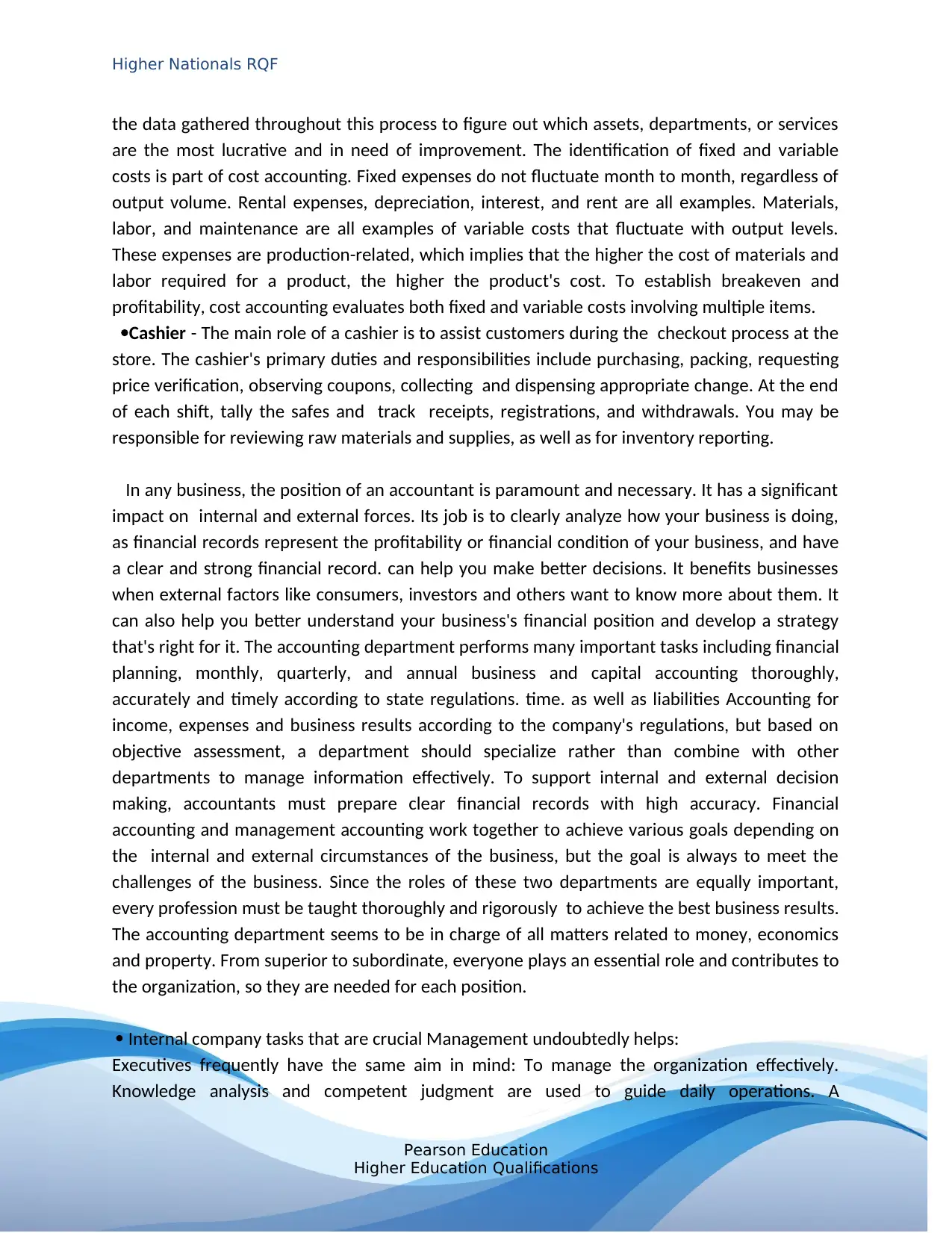
Higher Nationals RQF
the data gathered throughout this process to figure out which assets, departments, or services
are the most lucrative and in need of improvement. The identification of fixed and variable
costs is part of cost accounting. Fixed expenses do not fluctuate month to month, regardless of
output volume. Rental expenses, depreciation, interest, and rent are all examples. Materials,
labor, and maintenance are all examples of variable costs that fluctuate with output levels.
These expenses are production-related, which implies that the higher the cost of materials and
labor required for a product, the higher the product's cost. To establish breakeven and
profitability, cost accounting evaluates both fixed and variable costs involving multiple items.
Cashier - The main role of a cashier is to assist customers during the checkout process at the
store. The cashier's primary duties and responsibilities include purchasing, packing, requesting
price verification, observing coupons, collecting and dispensing appropriate change. At the end
of each shift, tally the safes and track receipts, registrations, and withdrawals. You may be
responsible for reviewing raw materials and supplies, as well as for inventory reporting.
In any business, the position of an accountant is paramount and necessary. It has a significant
impact on internal and external forces. Its job is to clearly analyze how your business is doing,
as financial records represent the profitability or financial condition of your business, and have
a clear and strong financial record. can help you make better decisions. It benefits businesses
when external factors like consumers, investors and others want to know more about them. It
can also help you better understand your business's financial position and develop a strategy
that's right for it. The accounting department performs many important tasks including financial
planning, monthly, quarterly, and annual business and capital accounting thoroughly,
accurately and timely according to state regulations. time. as well as liabilities Accounting for
income, expenses and business results according to the company's regulations, but based on
objective assessment, a department should specialize rather than combine with other
departments to manage information effectively. To support internal and external decision
making, accountants must prepare clear financial records with high accuracy. Financial
accounting and management accounting work together to achieve various goals depending on
the internal and external circumstances of the business, but the goal is always to meet the
challenges of the business. Since the roles of these two departments are equally important,
every profession must be taught thoroughly and rigorously to achieve the best business results.
The accounting department seems to be in charge of all matters related to money, economics
and property. From superior to subordinate, everyone plays an essential role and contributes to
the organization, so they are needed for each position.
Internal company tasks that are crucial Management undoubtedly helps:
Executives frequently have the same aim in mind: To manage the organization effectively.
Knowledge analysis and competent judgment are used to guide daily operations. A
Pearson Education
Higher Education Qualifications
the data gathered throughout this process to figure out which assets, departments, or services
are the most lucrative and in need of improvement. The identification of fixed and variable
costs is part of cost accounting. Fixed expenses do not fluctuate month to month, regardless of
output volume. Rental expenses, depreciation, interest, and rent are all examples. Materials,
labor, and maintenance are all examples of variable costs that fluctuate with output levels.
These expenses are production-related, which implies that the higher the cost of materials and
labor required for a product, the higher the product's cost. To establish breakeven and
profitability, cost accounting evaluates both fixed and variable costs involving multiple items.
Cashier - The main role of a cashier is to assist customers during the checkout process at the
store. The cashier's primary duties and responsibilities include purchasing, packing, requesting
price verification, observing coupons, collecting and dispensing appropriate change. At the end
of each shift, tally the safes and track receipts, registrations, and withdrawals. You may be
responsible for reviewing raw materials and supplies, as well as for inventory reporting.
In any business, the position of an accountant is paramount and necessary. It has a significant
impact on internal and external forces. Its job is to clearly analyze how your business is doing,
as financial records represent the profitability or financial condition of your business, and have
a clear and strong financial record. can help you make better decisions. It benefits businesses
when external factors like consumers, investors and others want to know more about them. It
can also help you better understand your business's financial position and develop a strategy
that's right for it. The accounting department performs many important tasks including financial
planning, monthly, quarterly, and annual business and capital accounting thoroughly,
accurately and timely according to state regulations. time. as well as liabilities Accounting for
income, expenses and business results according to the company's regulations, but based on
objective assessment, a department should specialize rather than combine with other
departments to manage information effectively. To support internal and external decision
making, accountants must prepare clear financial records with high accuracy. Financial
accounting and management accounting work together to achieve various goals depending on
the internal and external circumstances of the business, but the goal is always to meet the
challenges of the business. Since the roles of these two departments are equally important,
every profession must be taught thoroughly and rigorously to achieve the best business results.
The accounting department seems to be in charge of all matters related to money, economics
and property. From superior to subordinate, everyone plays an essential role and contributes to
the organization, so they are needed for each position.
Internal company tasks that are crucial Management undoubtedly helps:
Executives frequently have the same aim in mind: To manage the organization effectively.
Knowledge analysis and competent judgment are used to guide daily operations. A
Pearson Education
Higher Education Qualifications
Paraphrase This Document
Need a fresh take? Get an instant paraphrase of this document with our AI Paraphraser
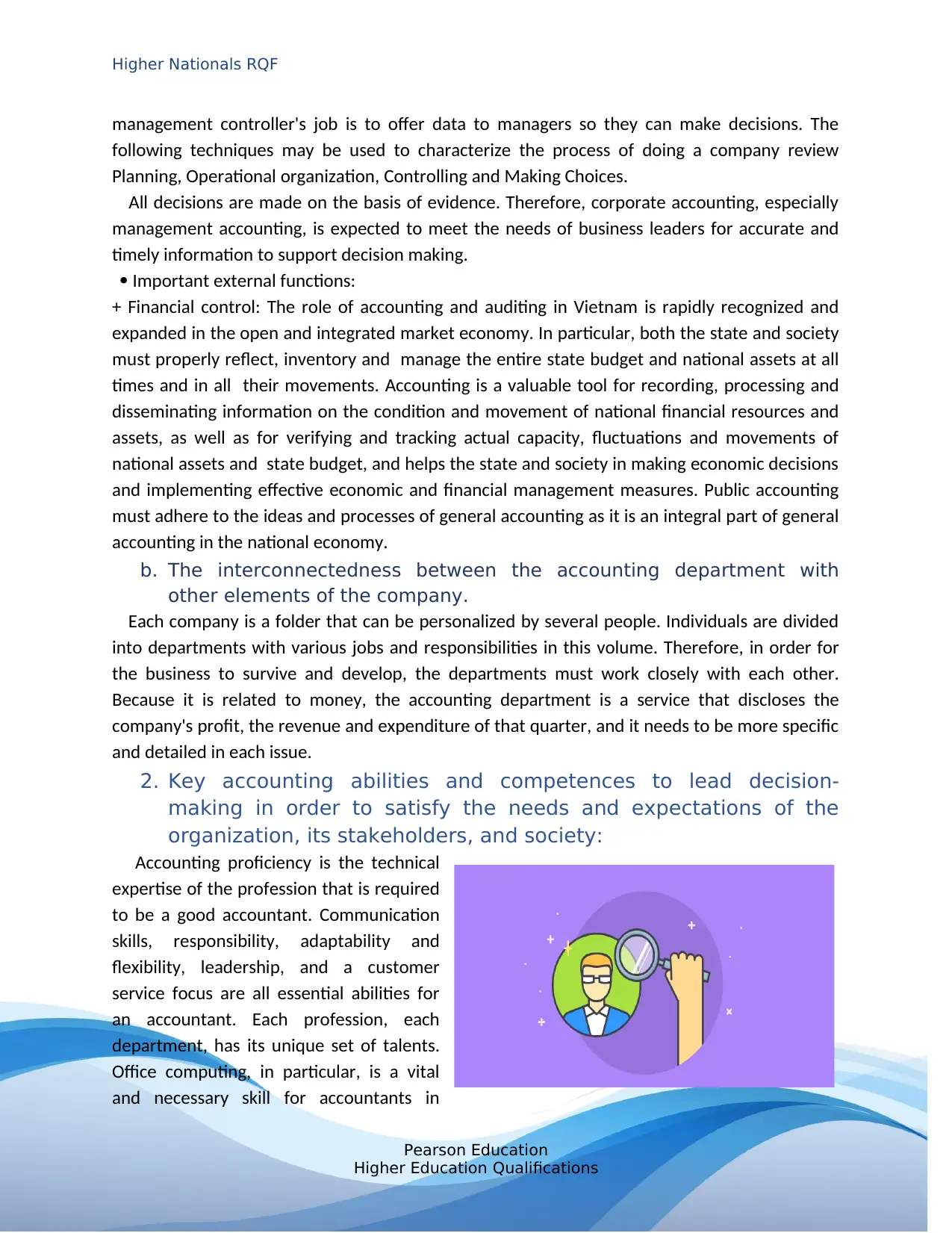
Higher Nationals RQF
management controller's job is to offer data to managers so they can make decisions. The
following techniques may be used to characterize the process of doing a company review
Planning, Operational organization, Controlling and Making Choices.
All decisions are made on the basis of evidence. Therefore, corporate accounting, especially
management accounting, is expected to meet the needs of business leaders for accurate and
timely information to support decision making.
Important external functions:
+ Financial control: The role of accounting and auditing in Vietnam is rapidly recognized and
expanded in the open and integrated market economy. In particular, both the state and society
must properly reflect, inventory and manage the entire state budget and national assets at all
times and in all their movements. Accounting is a valuable tool for recording, processing and
disseminating information on the condition and movement of national financial resources and
assets, as well as for verifying and tracking actual capacity, fluctuations and movements of
national assets and state budget, and helps the state and society in making economic decisions
and implementing effective economic and financial management measures. Public accounting
must adhere to the ideas and processes of general accounting as it is an integral part of general
accounting in the national economy.
b. The interconnectedness between the accounting department with
other elements of the company.
Each company is a folder that can be personalized by several people. Individuals are divided
into departments with various jobs and responsibilities in this volume. Therefore, in order for
the business to survive and develop, the departments must work closely with each other.
Because it is related to money, the accounting department is a service that discloses the
company's profit, the revenue and expenditure of that quarter, and it needs to be more specific
and detailed in each issue.
2. Key accounting abilities and competences to lead decision-
making in order to satisfy the needs and expectations of the
organization, its stakeholders, and society:
Accounting proficiency is the technical
expertise of the profession that is required
to be a good accountant. Communication
skills, responsibility, adaptability and
flexibility, leadership, and a customer
service focus are all essential abilities for
an accountant. Each profession, each
department, has its unique set of talents.
Office computing, in particular, is a vital
and necessary skill for accountants in
Pearson Education
Higher Education Qualifications
management controller's job is to offer data to managers so they can make decisions. The
following techniques may be used to characterize the process of doing a company review
Planning, Operational organization, Controlling and Making Choices.
All decisions are made on the basis of evidence. Therefore, corporate accounting, especially
management accounting, is expected to meet the needs of business leaders for accurate and
timely information to support decision making.
Important external functions:
+ Financial control: The role of accounting and auditing in Vietnam is rapidly recognized and
expanded in the open and integrated market economy. In particular, both the state and society
must properly reflect, inventory and manage the entire state budget and national assets at all
times and in all their movements. Accounting is a valuable tool for recording, processing and
disseminating information on the condition and movement of national financial resources and
assets, as well as for verifying and tracking actual capacity, fluctuations and movements of
national assets and state budget, and helps the state and society in making economic decisions
and implementing effective economic and financial management measures. Public accounting
must adhere to the ideas and processes of general accounting as it is an integral part of general
accounting in the national economy.
b. The interconnectedness between the accounting department with
other elements of the company.
Each company is a folder that can be personalized by several people. Individuals are divided
into departments with various jobs and responsibilities in this volume. Therefore, in order for
the business to survive and develop, the departments must work closely with each other.
Because it is related to money, the accounting department is a service that discloses the
company's profit, the revenue and expenditure of that quarter, and it needs to be more specific
and detailed in each issue.
2. Key accounting abilities and competences to lead decision-
making in order to satisfy the needs and expectations of the
organization, its stakeholders, and society:
Accounting proficiency is the technical
expertise of the profession that is required
to be a good accountant. Communication
skills, responsibility, adaptability and
flexibility, leadership, and a customer
service focus are all essential abilities for
an accountant. Each profession, each
department, has its unique set of talents.
Office computing, in particular, is a vital
and necessary skill for accountants in
Pearson Education
Higher Education Qualifications
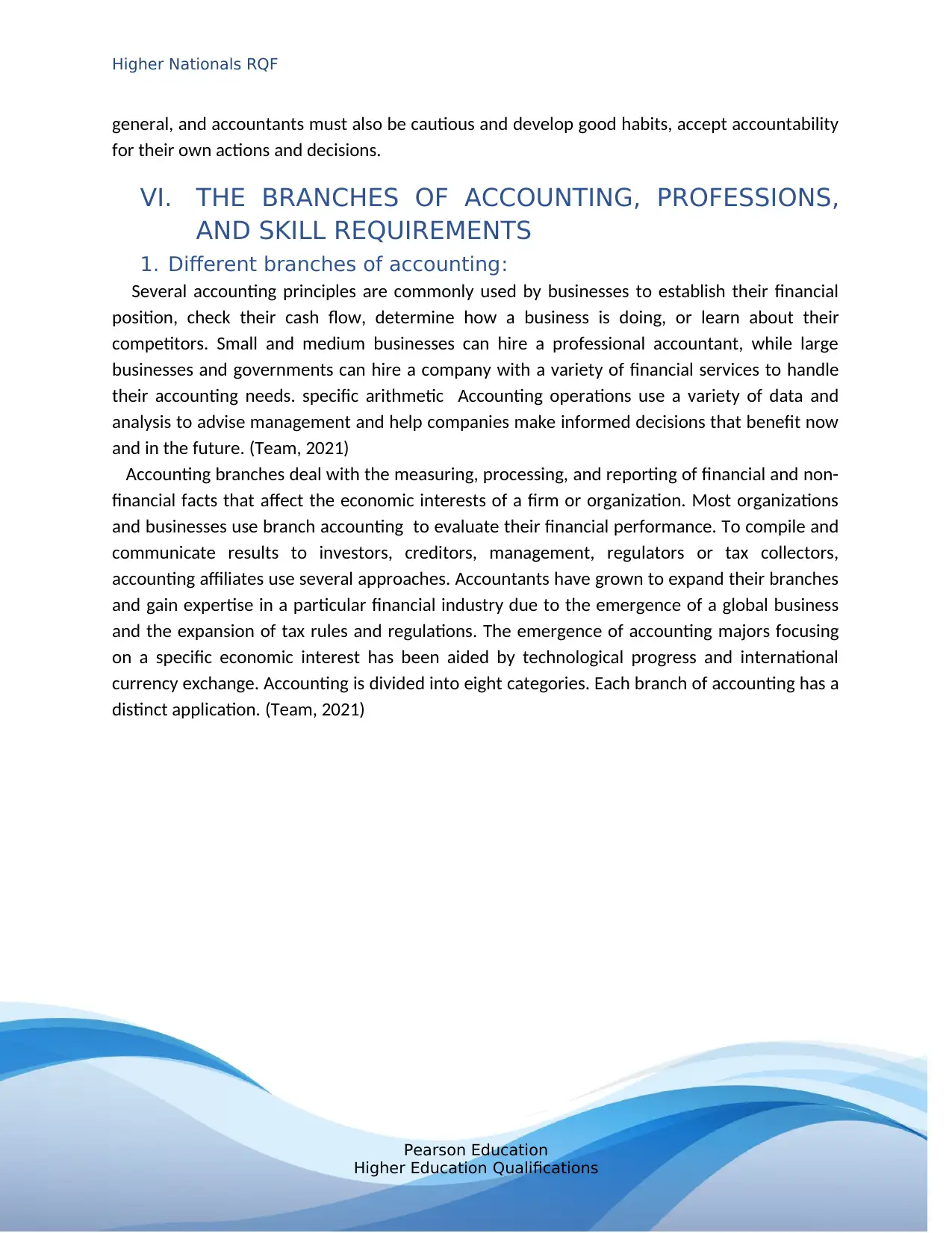
Higher Nationals RQF
general, and accountants must also be cautious and develop good habits, accept accountability
for their own actions and decisions.
VI. THE BRANCHES OF ACCOUNTING, PROFESSIONS,
AND SKILL REQUIREMENTS
1. Different branches of accounting:
Several accounting principles are commonly used by businesses to establish their financial
position, check their cash flow, determine how a business is doing, or learn about their
competitors. Small and medium businesses can hire a professional accountant, while large
businesses and governments can hire a company with a variety of financial services to handle
their accounting needs. specific arithmetic Accounting operations use a variety of data and
analysis to advise management and help companies make informed decisions that benefit now
and in the future. (Team, 2021)
Accounting branches deal with the measuring, processing, and reporting of financial and non-
financial facts that affect the economic interests of a firm or organization. Most organizations
and businesses use branch accounting to evaluate their financial performance. To compile and
communicate results to investors, creditors, management, regulators or tax collectors,
accounting affiliates use several approaches. Accountants have grown to expand their branches
and gain expertise in a particular financial industry due to the emergence of a global business
and the expansion of tax rules and regulations. The emergence of accounting majors focusing
on a specific economic interest has been aided by technological progress and international
currency exchange. Accounting is divided into eight categories. Each branch of accounting has a
distinct application. (Team, 2021)
Pearson Education
Higher Education Qualifications
general, and accountants must also be cautious and develop good habits, accept accountability
for their own actions and decisions.
VI. THE BRANCHES OF ACCOUNTING, PROFESSIONS,
AND SKILL REQUIREMENTS
1. Different branches of accounting:
Several accounting principles are commonly used by businesses to establish their financial
position, check their cash flow, determine how a business is doing, or learn about their
competitors. Small and medium businesses can hire a professional accountant, while large
businesses and governments can hire a company with a variety of financial services to handle
their accounting needs. specific arithmetic Accounting operations use a variety of data and
analysis to advise management and help companies make informed decisions that benefit now
and in the future. (Team, 2021)
Accounting branches deal with the measuring, processing, and reporting of financial and non-
financial facts that affect the economic interests of a firm or organization. Most organizations
and businesses use branch accounting to evaluate their financial performance. To compile and
communicate results to investors, creditors, management, regulators or tax collectors,
accounting affiliates use several approaches. Accountants have grown to expand their branches
and gain expertise in a particular financial industry due to the emergence of a global business
and the expansion of tax rules and regulations. The emergence of accounting majors focusing
on a specific economic interest has been aided by technological progress and international
currency exchange. Accounting is divided into eight categories. Each branch of accounting has a
distinct application. (Team, 2021)
Pearson Education
Higher Education Qualifications
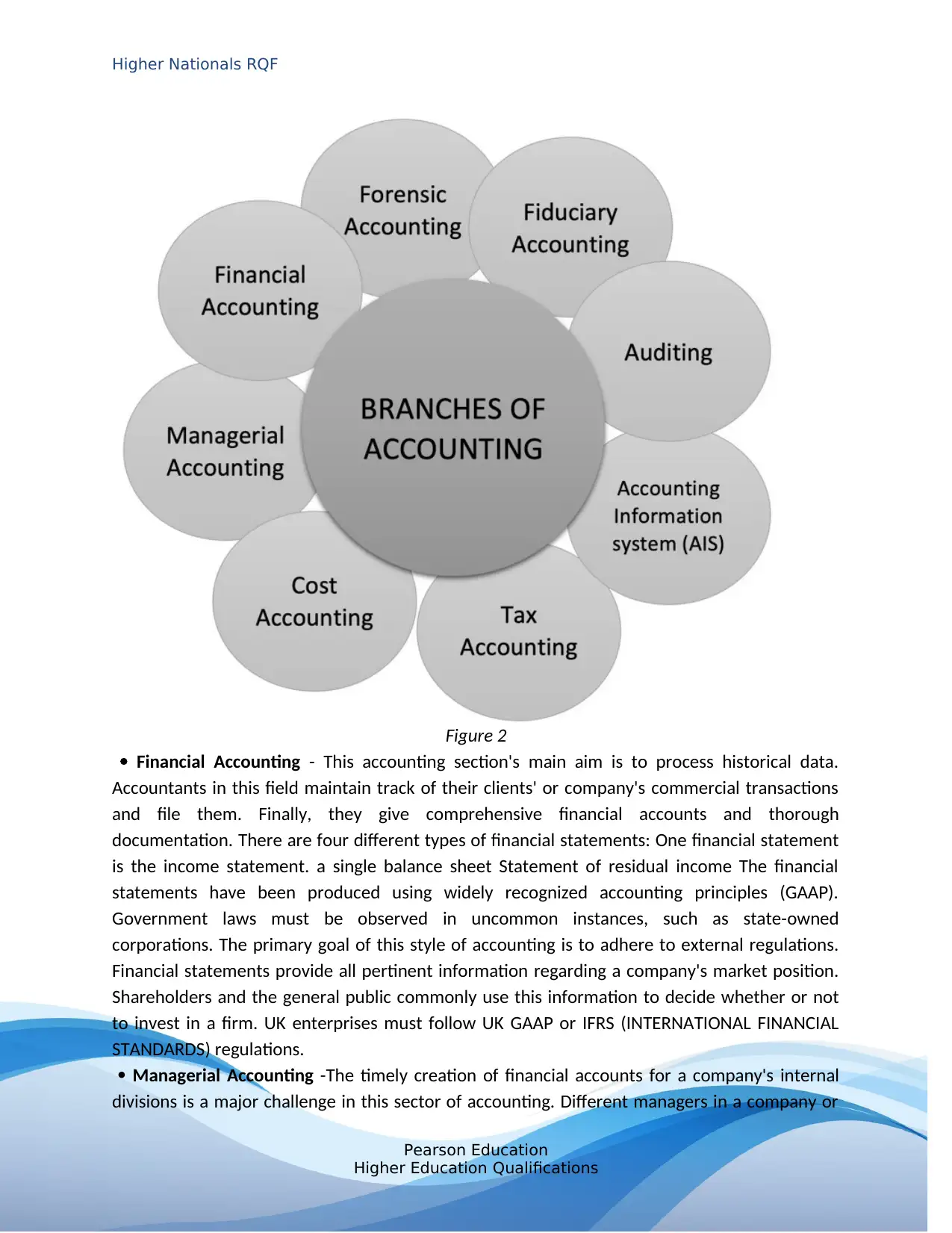
Higher Nationals RQF
Figure 2
Financial Accounting - This accounting section's main aim is to process historical data.
Accountants in this field maintain track of their clients' or company's commercial transactions
and file them. Finally, they give comprehensive financial accounts and thorough
documentation. There are four different types of financial statements: One financial statement
is the income statement. a single balance sheet Statement of residual income The financial
statements have been produced using widely recognized accounting principles (GAAP).
Government laws must be observed in uncommon instances, such as state-owned
corporations. The primary goal of this style of accounting is to adhere to external regulations.
Financial statements provide all pertinent information regarding a company's market position.
Shareholders and the general public commonly use this information to decide whether or not
to invest in a firm. UK enterprises must follow UK GAAP or IFRS (INTERNATIONAL FINANCIAL
STANDARDS) regulations.
Managerial Accounting -The timely creation of financial accounts for a company's internal
divisions is a major challenge in this sector of accounting. Different managers in a company or
Pearson Education
Higher Education Qualifications
Figure 2
Financial Accounting - This accounting section's main aim is to process historical data.
Accountants in this field maintain track of their clients' or company's commercial transactions
and file them. Finally, they give comprehensive financial accounts and thorough
documentation. There are four different types of financial statements: One financial statement
is the income statement. a single balance sheet Statement of residual income The financial
statements have been produced using widely recognized accounting principles (GAAP).
Government laws must be observed in uncommon instances, such as state-owned
corporations. The primary goal of this style of accounting is to adhere to external regulations.
Financial statements provide all pertinent information regarding a company's market position.
Shareholders and the general public commonly use this information to decide whether or not
to invest in a firm. UK enterprises must follow UK GAAP or IFRS (INTERNATIONAL FINANCIAL
STANDARDS) regulations.
Managerial Accounting -The timely creation of financial accounts for a company's internal
divisions is a major challenge in this sector of accounting. Different managers in a company or
Pearson Education
Higher Education Qualifications
Secure Best Marks with AI Grader
Need help grading? Try our AI Grader for instant feedback on your assignments.
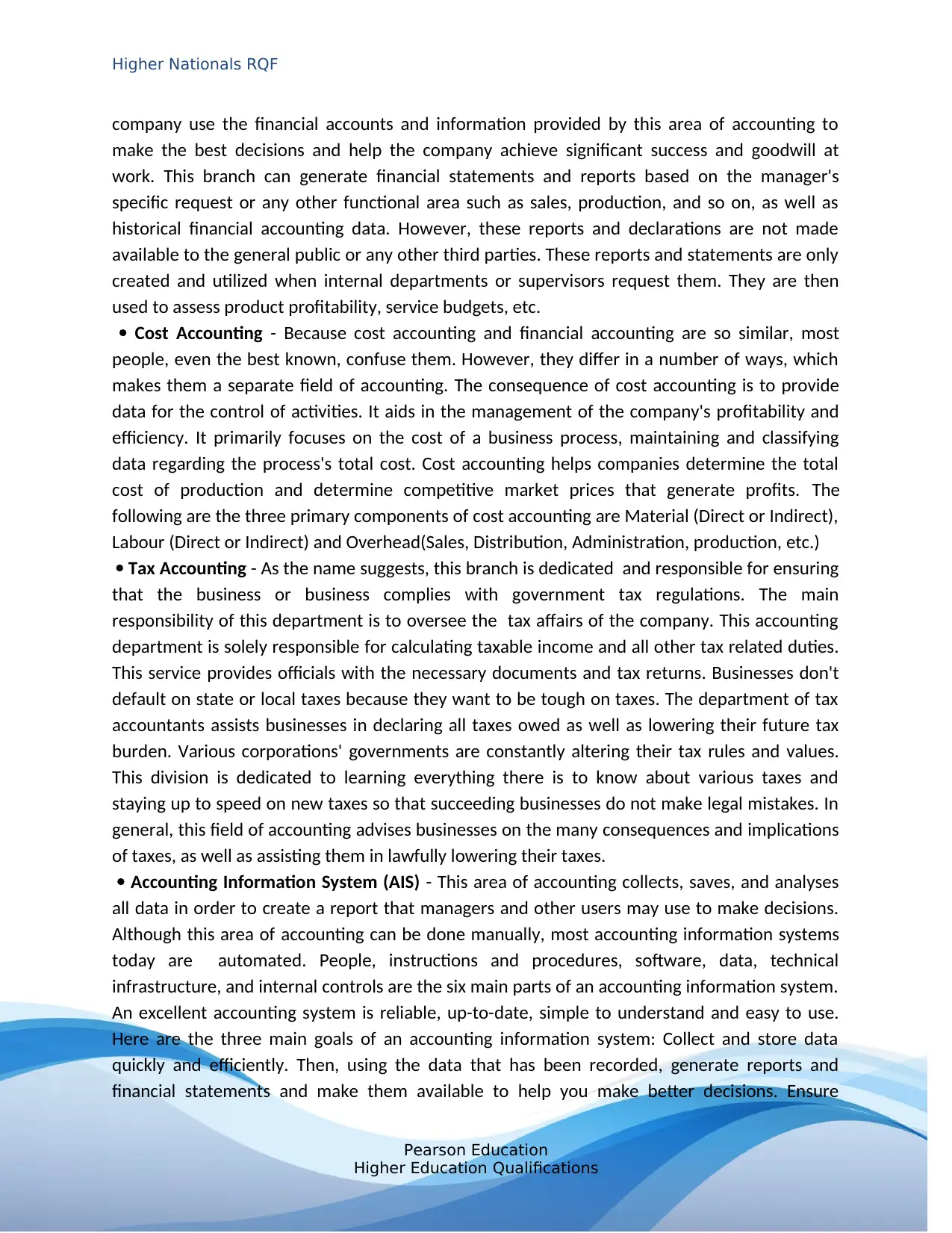
Higher Nationals RQF
company use the financial accounts and information provided by this area of accounting to
make the best decisions and help the company achieve significant success and goodwill at
work. This branch can generate financial statements and reports based on the manager's
specific request or any other functional area such as sales, production, and so on, as well as
historical financial accounting data. However, these reports and declarations are not made
available to the general public or any other third parties. These reports and statements are only
created and utilized when internal departments or supervisors request them. They are then
used to assess product profitability, service budgets, etc.
Cost Accounting - Because cost accounting and financial accounting are so similar, most
people, even the best known, confuse them. However, they differ in a number of ways, which
makes them a separate field of accounting. The consequence of cost accounting is to provide
data for the control of activities. It aids in the management of the company's profitability and
efficiency. It primarily focuses on the cost of a business process, maintaining and classifying
data regarding the process's total cost. Cost accounting helps companies determine the total
cost of production and determine competitive market prices that generate profits. The
following are the three primary components of cost accounting are Material (Direct or Indirect),
Labour (Direct or Indirect) and Overhead(Sales, Distribution, Administration, production, etc.)
Tax Accounting - As the name suggests, this branch is dedicated and responsible for ensuring
that the business or business complies with government tax regulations. The main
responsibility of this department is to oversee the tax affairs of the company. This accounting
department is solely responsible for calculating taxable income and all other tax related duties.
This service provides officials with the necessary documents and tax returns. Businesses don't
default on state or local taxes because they want to be tough on taxes. The department of tax
accountants assists businesses in declaring all taxes owed as well as lowering their future tax
burden. Various corporations' governments are constantly altering their tax rules and values.
This division is dedicated to learning everything there is to know about various taxes and
staying up to speed on new taxes so that succeeding businesses do not make legal mistakes. In
general, this field of accounting advises businesses on the many consequences and implications
of taxes, as well as assisting them in lawfully lowering their taxes.
Accounting Information System (AIS) - This area of accounting collects, saves, and analyses
all data in order to create a report that managers and other users may use to make decisions.
Although this area of accounting can be done manually, most accounting information systems
today are automated. People, instructions and procedures, software, data, technical
infrastructure, and internal controls are the six main parts of an accounting information system.
An excellent accounting system is reliable, up-to-date, simple to understand and easy to use.
Here are the three main goals of an accounting information system: Collect and store data
quickly and efficiently. Then, using the data that has been recorded, generate reports and
financial statements and make them available to help you make better decisions. Ensure
Pearson Education
Higher Education Qualifications
company use the financial accounts and information provided by this area of accounting to
make the best decisions and help the company achieve significant success and goodwill at
work. This branch can generate financial statements and reports based on the manager's
specific request or any other functional area such as sales, production, and so on, as well as
historical financial accounting data. However, these reports and declarations are not made
available to the general public or any other third parties. These reports and statements are only
created and utilized when internal departments or supervisors request them. They are then
used to assess product profitability, service budgets, etc.
Cost Accounting - Because cost accounting and financial accounting are so similar, most
people, even the best known, confuse them. However, they differ in a number of ways, which
makes them a separate field of accounting. The consequence of cost accounting is to provide
data for the control of activities. It aids in the management of the company's profitability and
efficiency. It primarily focuses on the cost of a business process, maintaining and classifying
data regarding the process's total cost. Cost accounting helps companies determine the total
cost of production and determine competitive market prices that generate profits. The
following are the three primary components of cost accounting are Material (Direct or Indirect),
Labour (Direct or Indirect) and Overhead(Sales, Distribution, Administration, production, etc.)
Tax Accounting - As the name suggests, this branch is dedicated and responsible for ensuring
that the business or business complies with government tax regulations. The main
responsibility of this department is to oversee the tax affairs of the company. This accounting
department is solely responsible for calculating taxable income and all other tax related duties.
This service provides officials with the necessary documents and tax returns. Businesses don't
default on state or local taxes because they want to be tough on taxes. The department of tax
accountants assists businesses in declaring all taxes owed as well as lowering their future tax
burden. Various corporations' governments are constantly altering their tax rules and values.
This division is dedicated to learning everything there is to know about various taxes and
staying up to speed on new taxes so that succeeding businesses do not make legal mistakes. In
general, this field of accounting advises businesses on the many consequences and implications
of taxes, as well as assisting them in lawfully lowering their taxes.
Accounting Information System (AIS) - This area of accounting collects, saves, and analyses
all data in order to create a report that managers and other users may use to make decisions.
Although this area of accounting can be done manually, most accounting information systems
today are automated. People, instructions and procedures, software, data, technical
infrastructure, and internal controls are the six main parts of an accounting information system.
An excellent accounting system is reliable, up-to-date, simple to understand and easy to use.
Here are the three main goals of an accounting information system: Collect and store data
quickly and efficiently. Then, using the data that has been recorded, generate reports and
financial statements and make them available to help you make better decisions. Ensure
Pearson Education
Higher Education Qualifications
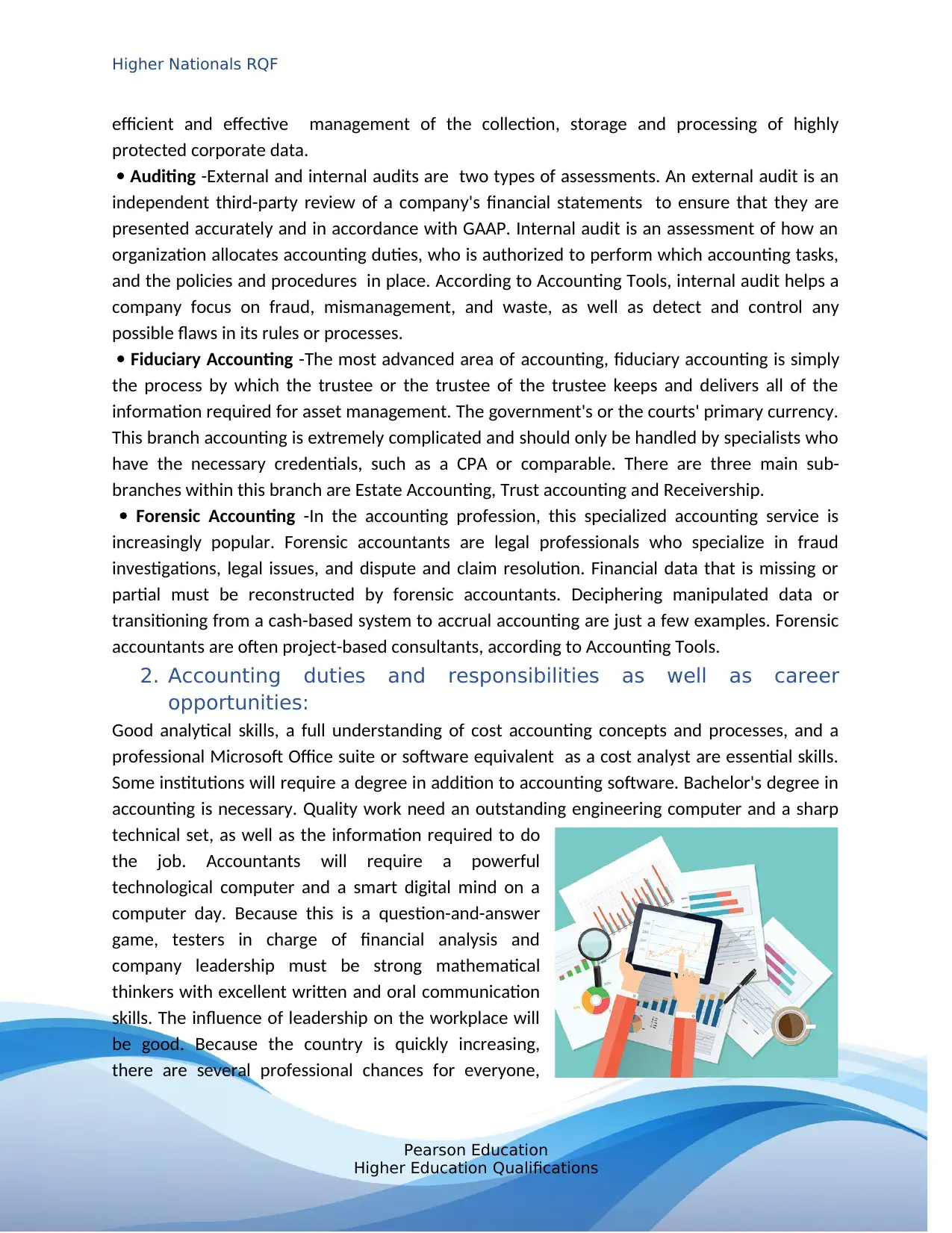
Higher Nationals RQF
efficient and effective management of the collection, storage and processing of highly
protected corporate data.
Auditing -External and internal audits are two types of assessments. An external audit is an
independent third-party review of a company's financial statements to ensure that they are
presented accurately and in accordance with GAAP. Internal audit is an assessment of how an
organization allocates accounting duties, who is authorized to perform which accounting tasks,
and the policies and procedures in place. According to Accounting Tools, internal audit helps a
company focus on fraud, mismanagement, and waste, as well as detect and control any
possible flaws in its rules or processes.
Fiduciary Accounting -The most advanced area of accounting, fiduciary accounting is simply
the process by which the trustee or the trustee of the trustee keeps and delivers all of the
information required for asset management. The government's or the courts' primary currency.
This branch accounting is extremely complicated and should only be handled by specialists who
have the necessary credentials, such as a CPA or comparable. There are three main sub-
branches within this branch are Estate Accounting, Trust accounting and Receivership.
Forensic Accounting -In the accounting profession, this specialized accounting service is
increasingly popular. Forensic accountants are legal professionals who specialize in fraud
investigations, legal issues, and dispute and claim resolution. Financial data that is missing or
partial must be reconstructed by forensic accountants. Deciphering manipulated data or
transitioning from a cash-based system to accrual accounting are just a few examples. Forensic
accountants are often project-based consultants, according to Accounting Tools.
2. Accounting duties and responsibilities as well as career
opportunities:
Good analytical skills, a full understanding of cost accounting concepts and processes, and a
professional Microsoft Office suite or software equivalent as a cost analyst are essential skills.
Some institutions will require a degree in addition to accounting software. Bachelor's degree in
accounting is necessary. Quality work need an outstanding engineering computer and a sharp
technical set, as well as the information required to do
the job. Accountants will require a powerful
technological computer and a smart digital mind on a
computer day. Because this is a question-and-answer
game, testers in charge of financial analysis and
company leadership must be strong mathematical
thinkers with excellent written and oral communication
skills. The influence of leadership on the workplace will
be good. Because the country is quickly increasing,
there are several professional chances for everyone,
Pearson Education
Higher Education Qualifications
efficient and effective management of the collection, storage and processing of highly
protected corporate data.
Auditing -External and internal audits are two types of assessments. An external audit is an
independent third-party review of a company's financial statements to ensure that they are
presented accurately and in accordance with GAAP. Internal audit is an assessment of how an
organization allocates accounting duties, who is authorized to perform which accounting tasks,
and the policies and procedures in place. According to Accounting Tools, internal audit helps a
company focus on fraud, mismanagement, and waste, as well as detect and control any
possible flaws in its rules or processes.
Fiduciary Accounting -The most advanced area of accounting, fiduciary accounting is simply
the process by which the trustee or the trustee of the trustee keeps and delivers all of the
information required for asset management. The government's or the courts' primary currency.
This branch accounting is extremely complicated and should only be handled by specialists who
have the necessary credentials, such as a CPA or comparable. There are three main sub-
branches within this branch are Estate Accounting, Trust accounting and Receivership.
Forensic Accounting -In the accounting profession, this specialized accounting service is
increasingly popular. Forensic accountants are legal professionals who specialize in fraud
investigations, legal issues, and dispute and claim resolution. Financial data that is missing or
partial must be reconstructed by forensic accountants. Deciphering manipulated data or
transitioning from a cash-based system to accrual accounting are just a few examples. Forensic
accountants are often project-based consultants, according to Accounting Tools.
2. Accounting duties and responsibilities as well as career
opportunities:
Good analytical skills, a full understanding of cost accounting concepts and processes, and a
professional Microsoft Office suite or software equivalent as a cost analyst are essential skills.
Some institutions will require a degree in addition to accounting software. Bachelor's degree in
accounting is necessary. Quality work need an outstanding engineering computer and a sharp
technical set, as well as the information required to do
the job. Accountants will require a powerful
technological computer and a smart digital mind on a
computer day. Because this is a question-and-answer
game, testers in charge of financial analysis and
company leadership must be strong mathematical
thinkers with excellent written and oral communication
skills. The influence of leadership on the workplace will
be good. Because the country is quickly increasing,
there are several professional chances for everyone,
Pearson Education
Higher Education Qualifications
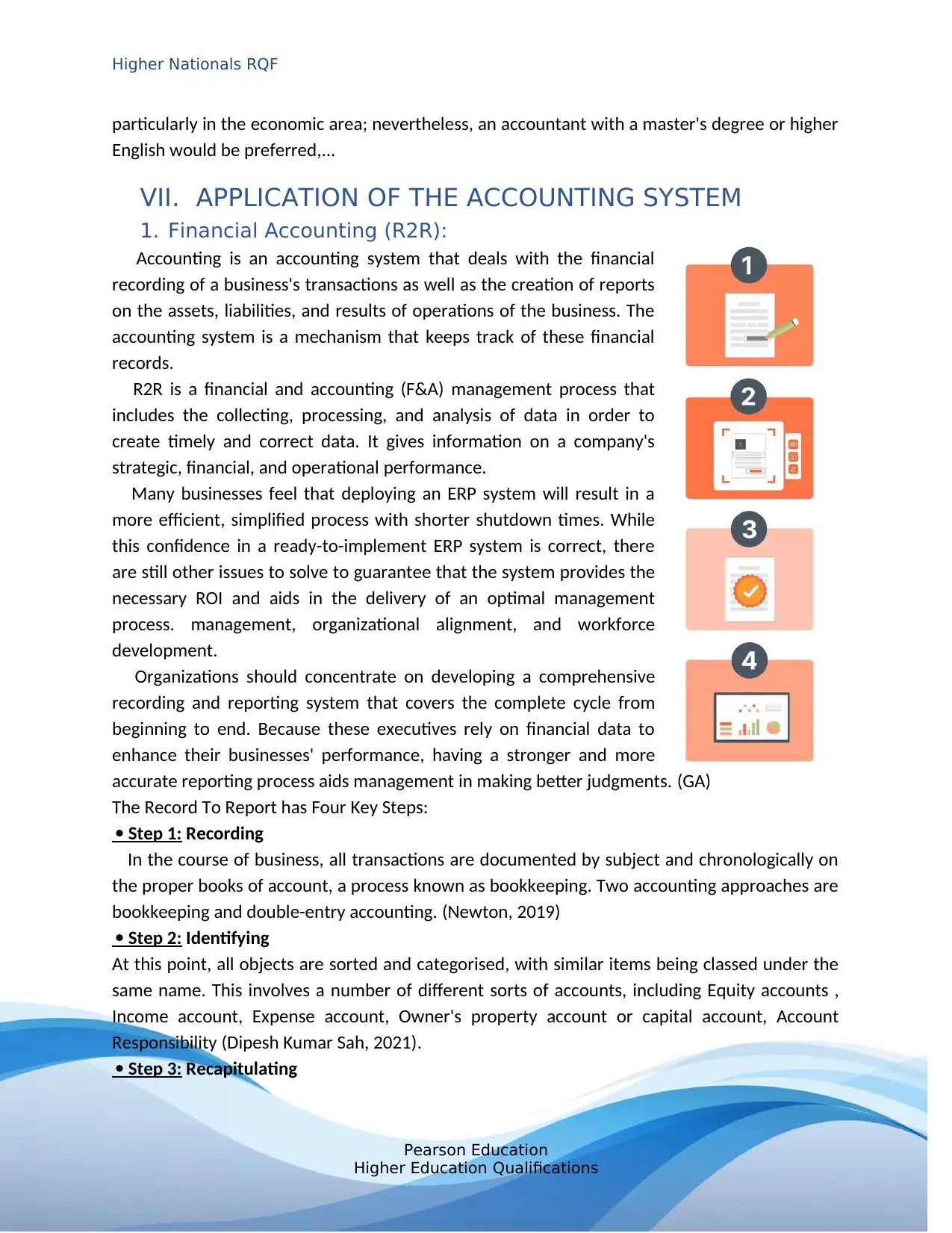
Higher Nationals RQF
particularly in the economic area; nevertheless, an accountant with a master's degree or higher
English would be preferred,...
VII. APPLICATION OF THE ACCOUNTING SYSTEM
1. Financial Accounting (R2R):
Accounting is an accounting system that deals with the financial
recording of a business's transactions as well as the creation of reports
on the assets, liabilities, and results of operations of the business. The
accounting system is a mechanism that keeps track of these financial
records.
R2R is a financial and accounting (F&A) management process that
includes the collecting, processing, and analysis of data in order to
create timely and correct data. It gives information on a company's
strategic, financial, and operational performance.
Many businesses feel that deploying an ERP system will result in a
more efficient, simplified process with shorter shutdown times. While
this confidence in a ready-to-implement ERP system is correct, there
are still other issues to solve to guarantee that the system provides the
necessary ROI and aids in the delivery of an optimal management
process. management, organizational alignment, and workforce
development.
Organizations should concentrate on developing a comprehensive
recording and reporting system that covers the complete cycle from
beginning to end. Because these executives rely on financial data to
enhance their businesses' performance, having a stronger and more
accurate reporting process aids management in making better judgments. (GA)
The Record To Report has Four Key Steps:
Step 1: Recording
In the course of business, all transactions are documented by subject and chronologically on
the proper books of account, a process known as bookkeeping. Two accounting approaches are
bookkeeping and double-entry accounting. (Newton, 2019)
Step 2: Identifying
At this point, all objects are sorted and categorised, with similar items being classed under the
same name. This involves a number of different sorts of accounts, including Equity accounts ,
Income account, Expense account, Owner's property account or capital account, Account
Responsibility (Dipesh Kumar Sah, 2021).
Step 3: Recapitulating
Pearson Education
Higher Education Qualifications
particularly in the economic area; nevertheless, an accountant with a master's degree or higher
English would be preferred,...
VII. APPLICATION OF THE ACCOUNTING SYSTEM
1. Financial Accounting (R2R):
Accounting is an accounting system that deals with the financial
recording of a business's transactions as well as the creation of reports
on the assets, liabilities, and results of operations of the business. The
accounting system is a mechanism that keeps track of these financial
records.
R2R is a financial and accounting (F&A) management process that
includes the collecting, processing, and analysis of data in order to
create timely and correct data. It gives information on a company's
strategic, financial, and operational performance.
Many businesses feel that deploying an ERP system will result in a
more efficient, simplified process with shorter shutdown times. While
this confidence in a ready-to-implement ERP system is correct, there
are still other issues to solve to guarantee that the system provides the
necessary ROI and aids in the delivery of an optimal management
process. management, organizational alignment, and workforce
development.
Organizations should concentrate on developing a comprehensive
recording and reporting system that covers the complete cycle from
beginning to end. Because these executives rely on financial data to
enhance their businesses' performance, having a stronger and more
accurate reporting process aids management in making better judgments. (GA)
The Record To Report has Four Key Steps:
Step 1: Recording
In the course of business, all transactions are documented by subject and chronologically on
the proper books of account, a process known as bookkeeping. Two accounting approaches are
bookkeeping and double-entry accounting. (Newton, 2019)
Step 2: Identifying
At this point, all objects are sorted and categorised, with similar items being classed under the
same name. This involves a number of different sorts of accounts, including Equity accounts ,
Income account, Expense account, Owner's property account or capital account, Account
Responsibility (Dipesh Kumar Sah, 2021).
Step 3: Recapitulating
Pearson Education
Higher Education Qualifications
Paraphrase This Document
Need a fresh take? Get an instant paraphrase of this document with our AI Paraphraser
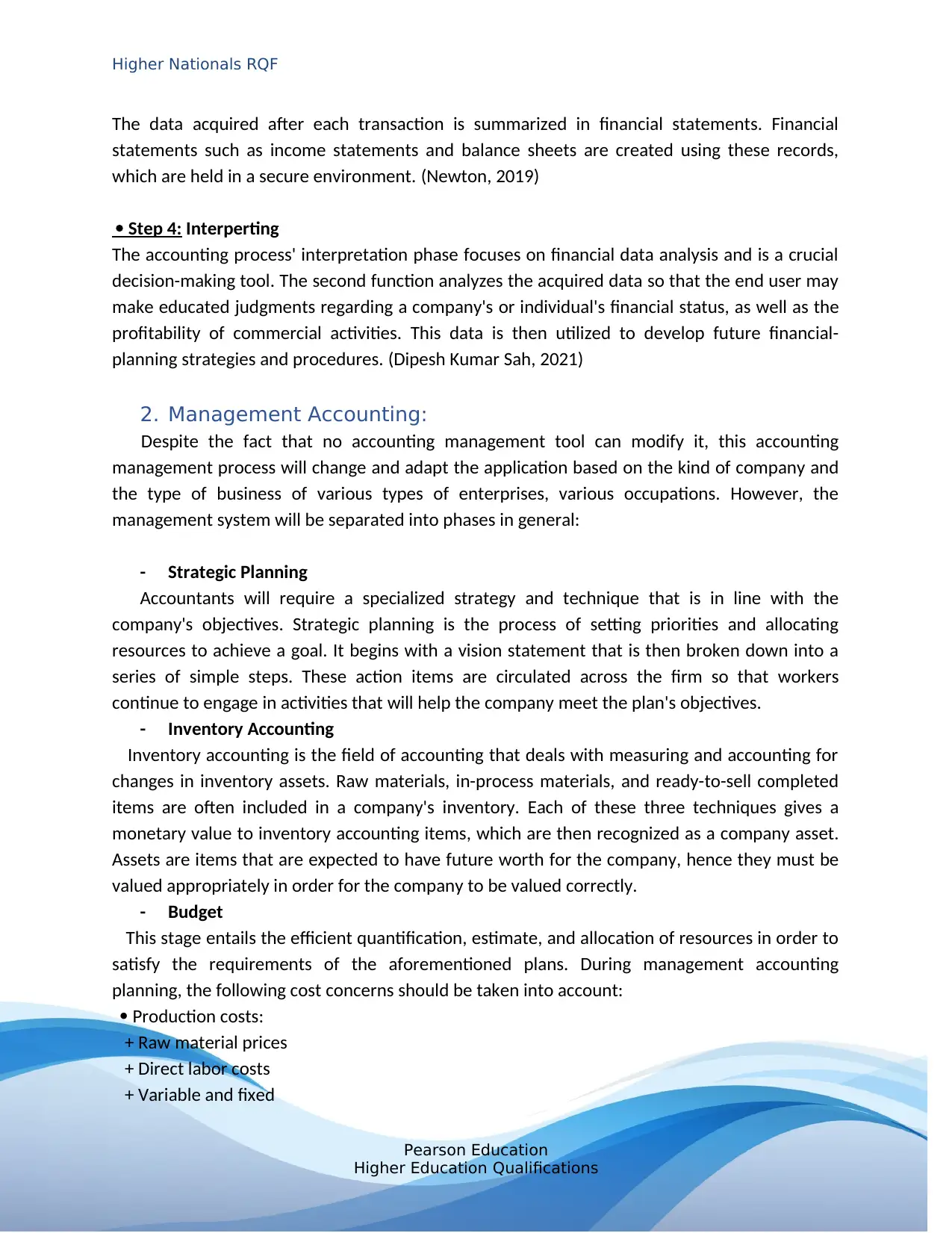
Higher Nationals RQF
The data acquired after each transaction is summarized in financial statements. Financial
statements such as income statements and balance sheets are created using these records,
which are held in a secure environment. (Newton, 2019)
Step 4: Interperting
The accounting process' interpretation phase focuses on financial data analysis and is a crucial
decision-making tool. The second function analyzes the acquired data so that the end user may
make educated judgments regarding a company's or individual's financial status, as well as the
profitability of commercial activities. This data is then utilized to develop future financial-
planning strategies and procedures. (Dipesh Kumar Sah, 2021)
2. Management Accounting:
Despite the fact that no accounting management tool can modify it, this accounting
management process will change and adapt the application based on the kind of company and
the type of business of various types of enterprises, various occupations. However, the
management system will be separated into phases in general:
- Strategic Planning
Accountants will require a specialized strategy and technique that is in line with the
company's objectives. Strategic planning is the process of setting priorities and allocating
resources to achieve a goal. It begins with a vision statement that is then broken down into a
series of simple steps. These action items are circulated across the firm so that workers
continue to engage in activities that will help the company meet the plan's objectives.
- Inventory Accounting
Inventory accounting is the field of accounting that deals with measuring and accounting for
changes in inventory assets. Raw materials, in-process materials, and ready-to-sell completed
items are often included in a company's inventory. Each of these three techniques gives a
monetary value to inventory accounting items, which are then recognized as a company asset.
Assets are items that are expected to have future worth for the company, hence they must be
valued appropriately in order for the company to be valued correctly.
- Budget
This stage entails the efficient quantification, estimate, and allocation of resources in order to
satisfy the requirements of the aforementioned plans. During management accounting
planning, the following cost concerns should be taken into account:
Production costs:
+ Raw material prices
+ Direct labor costs
+ Variable and fixed
Pearson Education
Higher Education Qualifications
The data acquired after each transaction is summarized in financial statements. Financial
statements such as income statements and balance sheets are created using these records,
which are held in a secure environment. (Newton, 2019)
Step 4: Interperting
The accounting process' interpretation phase focuses on financial data analysis and is a crucial
decision-making tool. The second function analyzes the acquired data so that the end user may
make educated judgments regarding a company's or individual's financial status, as well as the
profitability of commercial activities. This data is then utilized to develop future financial-
planning strategies and procedures. (Dipesh Kumar Sah, 2021)
2. Management Accounting:
Despite the fact that no accounting management tool can modify it, this accounting
management process will change and adapt the application based on the kind of company and
the type of business of various types of enterprises, various occupations. However, the
management system will be separated into phases in general:
- Strategic Planning
Accountants will require a specialized strategy and technique that is in line with the
company's objectives. Strategic planning is the process of setting priorities and allocating
resources to achieve a goal. It begins with a vision statement that is then broken down into a
series of simple steps. These action items are circulated across the firm so that workers
continue to engage in activities that will help the company meet the plan's objectives.
- Inventory Accounting
Inventory accounting is the field of accounting that deals with measuring and accounting for
changes in inventory assets. Raw materials, in-process materials, and ready-to-sell completed
items are often included in a company's inventory. Each of these three techniques gives a
monetary value to inventory accounting items, which are then recognized as a company asset.
Assets are items that are expected to have future worth for the company, hence they must be
valued appropriately in order for the company to be valued correctly.
- Budget
This stage entails the efficient quantification, estimate, and allocation of resources in order to
satisfy the requirements of the aforementioned plans. During management accounting
planning, the following cost concerns should be taken into account:
Production costs:
+ Raw material prices
+ Direct labor costs
+ Variable and fixed
Pearson Education
Higher Education Qualifications
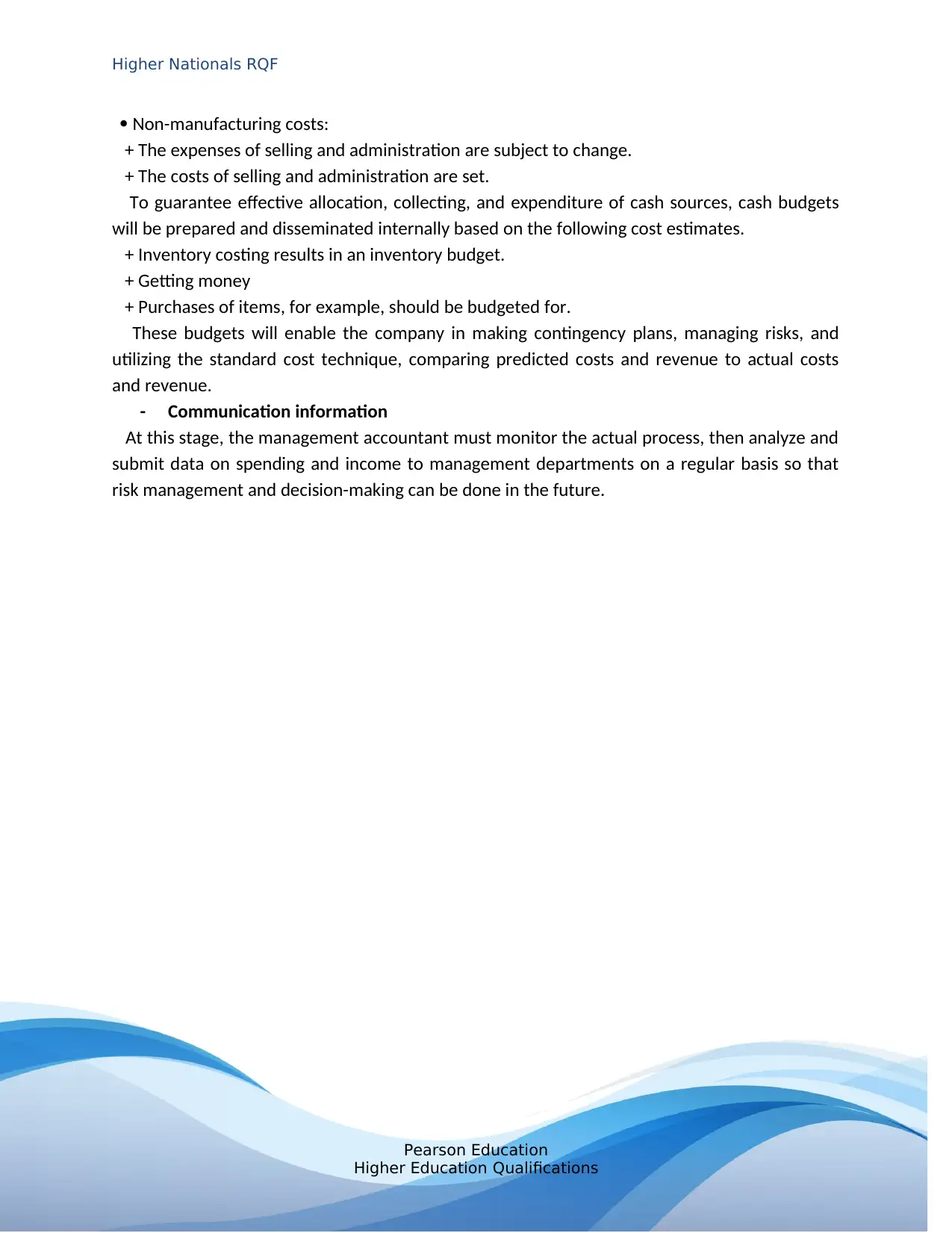
Higher Nationals RQF
Non-manufacturing costs:
+ The expenses of selling and administration are subject to change.
+ The costs of selling and administration are set.
To guarantee effective allocation, collecting, and expenditure of cash sources, cash budgets
will be prepared and disseminated internally based on the following cost estimates.
+ Inventory costing results in an inventory budget.
+ Getting money
+ Purchases of items, for example, should be budgeted for.
These budgets will enable the company in making contingency plans, managing risks, and
utilizing the standard cost technique, comparing predicted costs and revenue to actual costs
and revenue.
- Communication information
At this stage, the management accountant must monitor the actual process, then analyze and
submit data on spending and income to management departments on a regular basis so that
risk management and decision-making can be done in the future.
Pearson Education
Higher Education Qualifications
Non-manufacturing costs:
+ The expenses of selling and administration are subject to change.
+ The costs of selling and administration are set.
To guarantee effective allocation, collecting, and expenditure of cash sources, cash budgets
will be prepared and disseminated internally based on the following cost estimates.
+ Inventory costing results in an inventory budget.
+ Getting money
+ Purchases of items, for example, should be budgeted for.
These budgets will enable the company in making contingency plans, managing risks, and
utilizing the standard cost technique, comparing predicted costs and revenue to actual costs
and revenue.
- Communication information
At this stage, the management accountant must monitor the actual process, then analyze and
submit data on spending and income to management departments on a regular basis so that
risk management and decision-making can be done in the future.
Pearson Education
Higher Education Qualifications
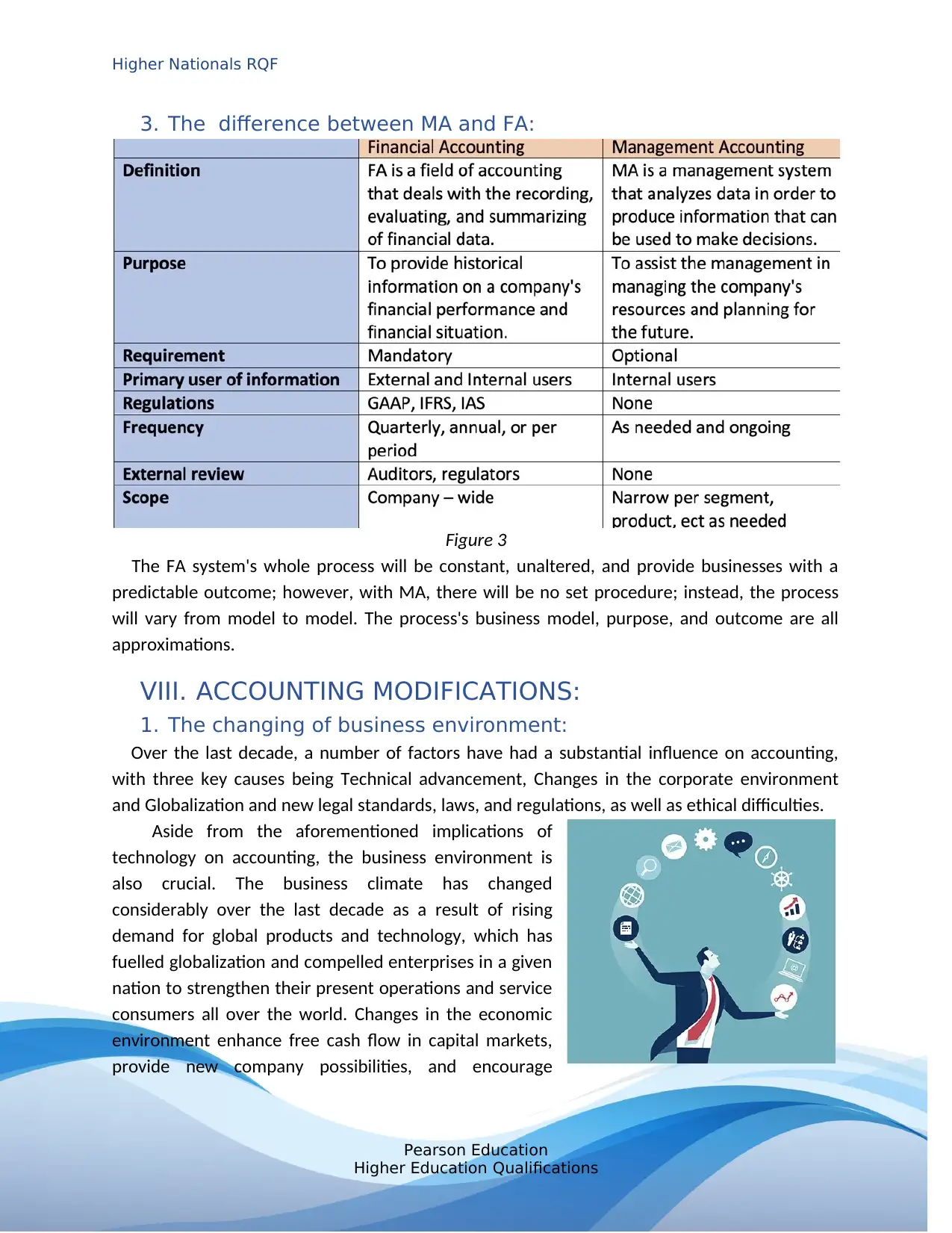
Higher Nationals RQF
3. The difference between MA and FA:
Figure 3
The FA system's whole process will be constant, unaltered, and provide businesses with a
predictable outcome; however, with MA, there will be no set procedure; instead, the process
will vary from model to model. The process's business model, purpose, and outcome are all
approximations.
VIII. ACCOUNTING MODIFICATIONS:
1. The changing of business environment:
Over the last decade, a number of factors have had a substantial influence on accounting,
with three key causes being Technical advancement, Changes in the corporate environment
and Globalization and new legal standards, laws, and regulations, as well as ethical difficulties.
Aside from the aforementioned implications of
technology on accounting, the business environment is
also crucial. The business climate has changed
considerably over the last decade as a result of rising
demand for global products and technology, which has
fuelled globalization and compelled enterprises in a given
nation to strengthen their present operations and service
consumers all over the world. Changes in the economic
environment enhance free cash flow in capital markets,
provide new company possibilities, and encourage
Pearson Education
Higher Education Qualifications
3. The difference between MA and FA:
Figure 3
The FA system's whole process will be constant, unaltered, and provide businesses with a
predictable outcome; however, with MA, there will be no set procedure; instead, the process
will vary from model to model. The process's business model, purpose, and outcome are all
approximations.
VIII. ACCOUNTING MODIFICATIONS:
1. The changing of business environment:
Over the last decade, a number of factors have had a substantial influence on accounting,
with three key causes being Technical advancement, Changes in the corporate environment
and Globalization and new legal standards, laws, and regulations, as well as ethical difficulties.
Aside from the aforementioned implications of
technology on accounting, the business environment is
also crucial. The business climate has changed
considerably over the last decade as a result of rising
demand for global products and technology, which has
fuelled globalization and compelled enterprises in a given
nation to strengthen their present operations and service
consumers all over the world. Changes in the economic
environment enhance free cash flow in capital markets,
provide new company possibilities, and encourage
Pearson Education
Higher Education Qualifications
Secure Best Marks with AI Grader
Need help grading? Try our AI Grader for instant feedback on your assignments.
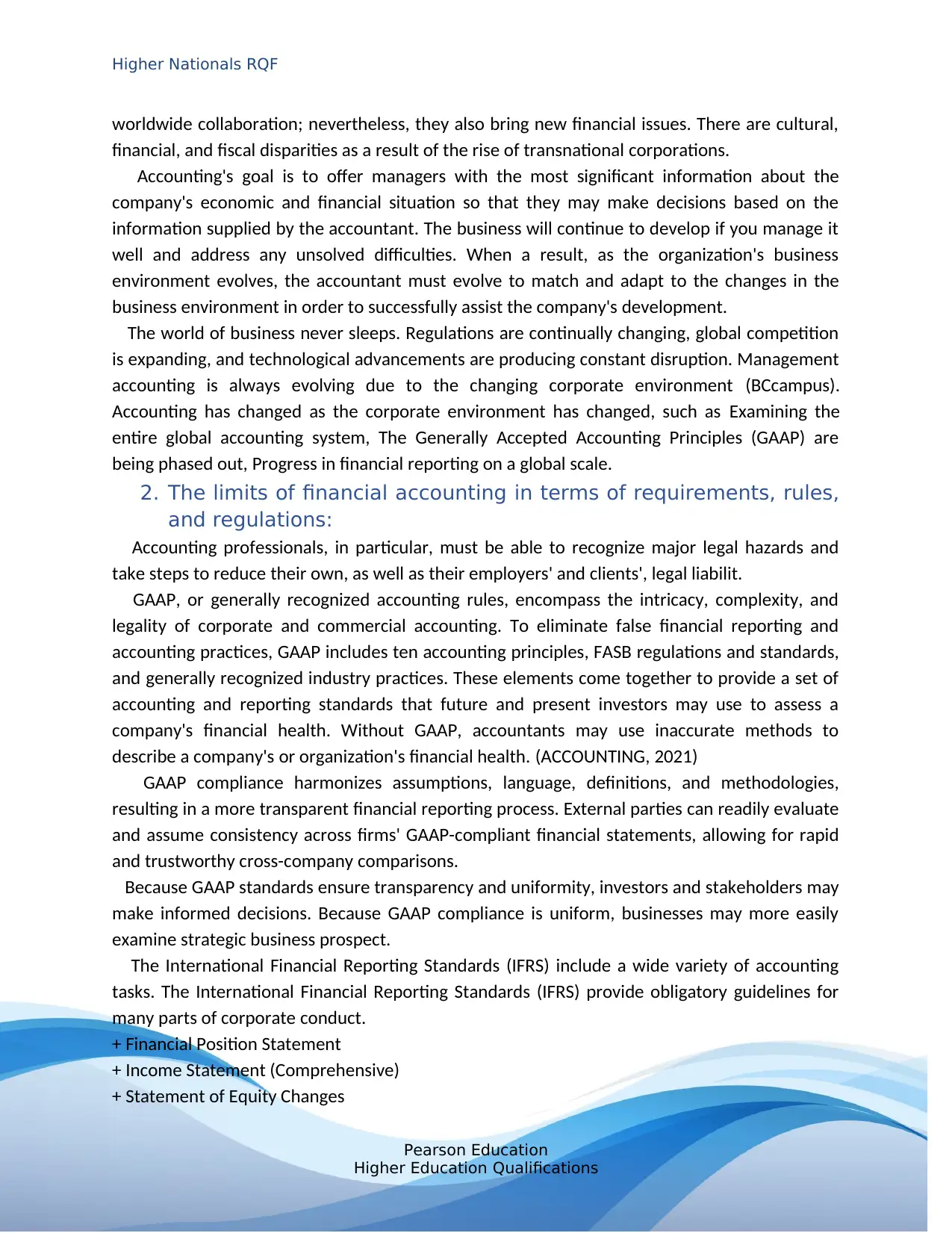
Higher Nationals RQF
worldwide collaboration; nevertheless, they also bring new financial issues. There are cultural,
financial, and fiscal disparities as a result of the rise of transnational corporations.
Accounting's goal is to offer managers with the most significant information about the
company's economic and financial situation so that they may make decisions based on the
information supplied by the accountant. The business will continue to develop if you manage it
well and address any unsolved difficulties. When a result, as the organization's business
environment evolves, the accountant must evolve to match and adapt to the changes in the
business environment in order to successfully assist the company's development.
The world of business never sleeps. Regulations are continually changing, global competition
is expanding, and technological advancements are producing constant disruption. Management
accounting is always evolving due to the changing corporate environment (BCcampus).
Accounting has changed as the corporate environment has changed, such as Examining the
entire global accounting system, The Generally Accepted Accounting Principles (GAAP) are
being phased out, Progress in financial reporting on a global scale.
2. The limits of financial accounting in terms of requirements, rules,
and regulations:
Accounting professionals, in particular, must be able to recognize major legal hazards and
take steps to reduce their own, as well as their employers' and clients', legal liabilit.
GAAP, or generally recognized accounting rules, encompass the intricacy, complexity, and
legality of corporate and commercial accounting. To eliminate false financial reporting and
accounting practices, GAAP includes ten accounting principles, FASB regulations and standards,
and generally recognized industry practices. These elements come together to provide a set of
accounting and reporting standards that future and present investors may use to assess a
company's financial health. Without GAAP, accountants may use inaccurate methods to
describe a company's or organization's financial health. (ACCOUNTING, 2021)
GAAP compliance harmonizes assumptions, language, definitions, and methodologies,
resulting in a more transparent financial reporting process. External parties can readily evaluate
and assume consistency across firms' GAAP-compliant financial statements, allowing for rapid
and trustworthy cross-company comparisons.
Because GAAP standards ensure transparency and uniformity, investors and stakeholders may
make informed decisions. Because GAAP compliance is uniform, businesses may more easily
examine strategic business prospect.
The International Financial Reporting Standards (IFRS) include a wide variety of accounting
tasks. The International Financial Reporting Standards (IFRS) provide obligatory guidelines for
many parts of corporate conduct.
+ Financial Position Statement
+ Income Statement (Comprehensive)
+ Statement of Equity Changes
Pearson Education
Higher Education Qualifications
worldwide collaboration; nevertheless, they also bring new financial issues. There are cultural,
financial, and fiscal disparities as a result of the rise of transnational corporations.
Accounting's goal is to offer managers with the most significant information about the
company's economic and financial situation so that they may make decisions based on the
information supplied by the accountant. The business will continue to develop if you manage it
well and address any unsolved difficulties. When a result, as the organization's business
environment evolves, the accountant must evolve to match and adapt to the changes in the
business environment in order to successfully assist the company's development.
The world of business never sleeps. Regulations are continually changing, global competition
is expanding, and technological advancements are producing constant disruption. Management
accounting is always evolving due to the changing corporate environment (BCcampus).
Accounting has changed as the corporate environment has changed, such as Examining the
entire global accounting system, The Generally Accepted Accounting Principles (GAAP) are
being phased out, Progress in financial reporting on a global scale.
2. The limits of financial accounting in terms of requirements, rules,
and regulations:
Accounting professionals, in particular, must be able to recognize major legal hazards and
take steps to reduce their own, as well as their employers' and clients', legal liabilit.
GAAP, or generally recognized accounting rules, encompass the intricacy, complexity, and
legality of corporate and commercial accounting. To eliminate false financial reporting and
accounting practices, GAAP includes ten accounting principles, FASB regulations and standards,
and generally recognized industry practices. These elements come together to provide a set of
accounting and reporting standards that future and present investors may use to assess a
company's financial health. Without GAAP, accountants may use inaccurate methods to
describe a company's or organization's financial health. (ACCOUNTING, 2021)
GAAP compliance harmonizes assumptions, language, definitions, and methodologies,
resulting in a more transparent financial reporting process. External parties can readily evaluate
and assume consistency across firms' GAAP-compliant financial statements, allowing for rapid
and trustworthy cross-company comparisons.
Because GAAP standards ensure transparency and uniformity, investors and stakeholders may
make informed decisions. Because GAAP compliance is uniform, businesses may more easily
examine strategic business prospect.
The International Financial Reporting Standards (IFRS) include a wide variety of accounting
tasks. The International Financial Reporting Standards (IFRS) provide obligatory guidelines for
many parts of corporate conduct.
+ Financial Position Statement
+ Income Statement (Comprehensive)
+ Statement of Equity Changes
Pearson Education
Higher Education Qualifications
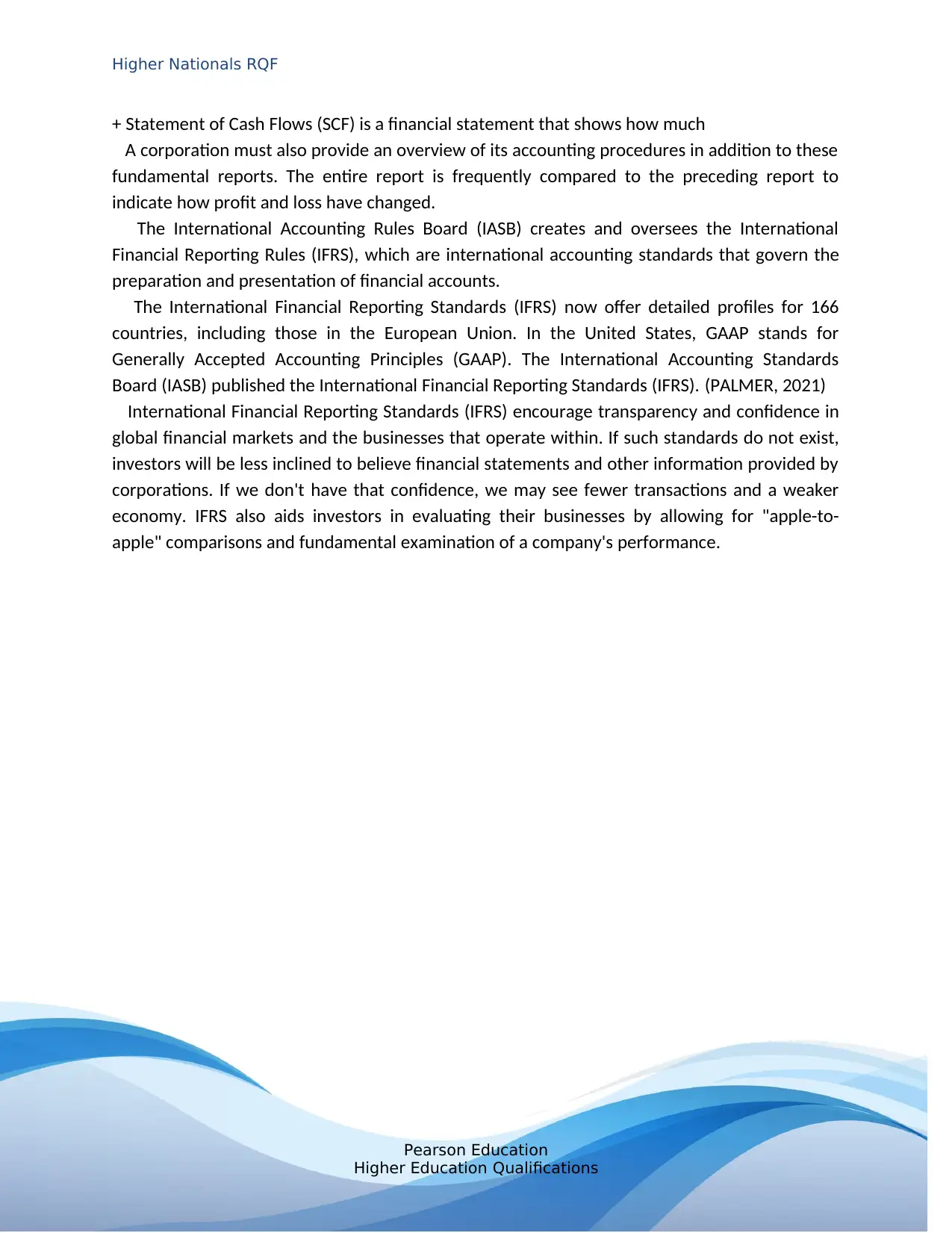
Higher Nationals RQF
+ Statement of Cash Flows (SCF) is a financial statement that shows how much
A corporation must also provide an overview of its accounting procedures in addition to these
fundamental reports. The entire report is frequently compared to the preceding report to
indicate how profit and loss have changed.
The International Accounting Rules Board (IASB) creates and oversees the International
Financial Reporting Rules (IFRS), which are international accounting standards that govern the
preparation and presentation of financial accounts.
The International Financial Reporting Standards (IFRS) now offer detailed profiles for 166
countries, including those in the European Union. In the United States, GAAP stands for
Generally Accepted Accounting Principles (GAAP). The International Accounting Standards
Board (IASB) published the International Financial Reporting Standards (IFRS). (PALMER, 2021)
International Financial Reporting Standards (IFRS) encourage transparency and confidence in
global financial markets and the businesses that operate within. If such standards do not exist,
investors will be less inclined to believe financial statements and other information provided by
corporations. If we don't have that confidence, we may see fewer transactions and a weaker
economy. IFRS also aids investors in evaluating their businesses by allowing for "apple-to-
apple" comparisons and fundamental examination of a company's performance.
Pearson Education
Higher Education Qualifications
+ Statement of Cash Flows (SCF) is a financial statement that shows how much
A corporation must also provide an overview of its accounting procedures in addition to these
fundamental reports. The entire report is frequently compared to the preceding report to
indicate how profit and loss have changed.
The International Accounting Rules Board (IASB) creates and oversees the International
Financial Reporting Rules (IFRS), which are international accounting standards that govern the
preparation and presentation of financial accounts.
The International Financial Reporting Standards (IFRS) now offer detailed profiles for 166
countries, including those in the European Union. In the United States, GAAP stands for
Generally Accepted Accounting Principles (GAAP). The International Accounting Standards
Board (IASB) published the International Financial Reporting Standards (IFRS). (PALMER, 2021)
International Financial Reporting Standards (IFRS) encourage transparency and confidence in
global financial markets and the businesses that operate within. If such standards do not exist,
investors will be less inclined to believe financial statements and other information provided by
corporations. If we don't have that confidence, we may see fewer transactions and a weaker
economy. IFRS also aids investors in evaluating their businesses by allowing for "apple-to-
apple" comparisons and fundamental examination of a company's performance.
Pearson Education
Higher Education Qualifications
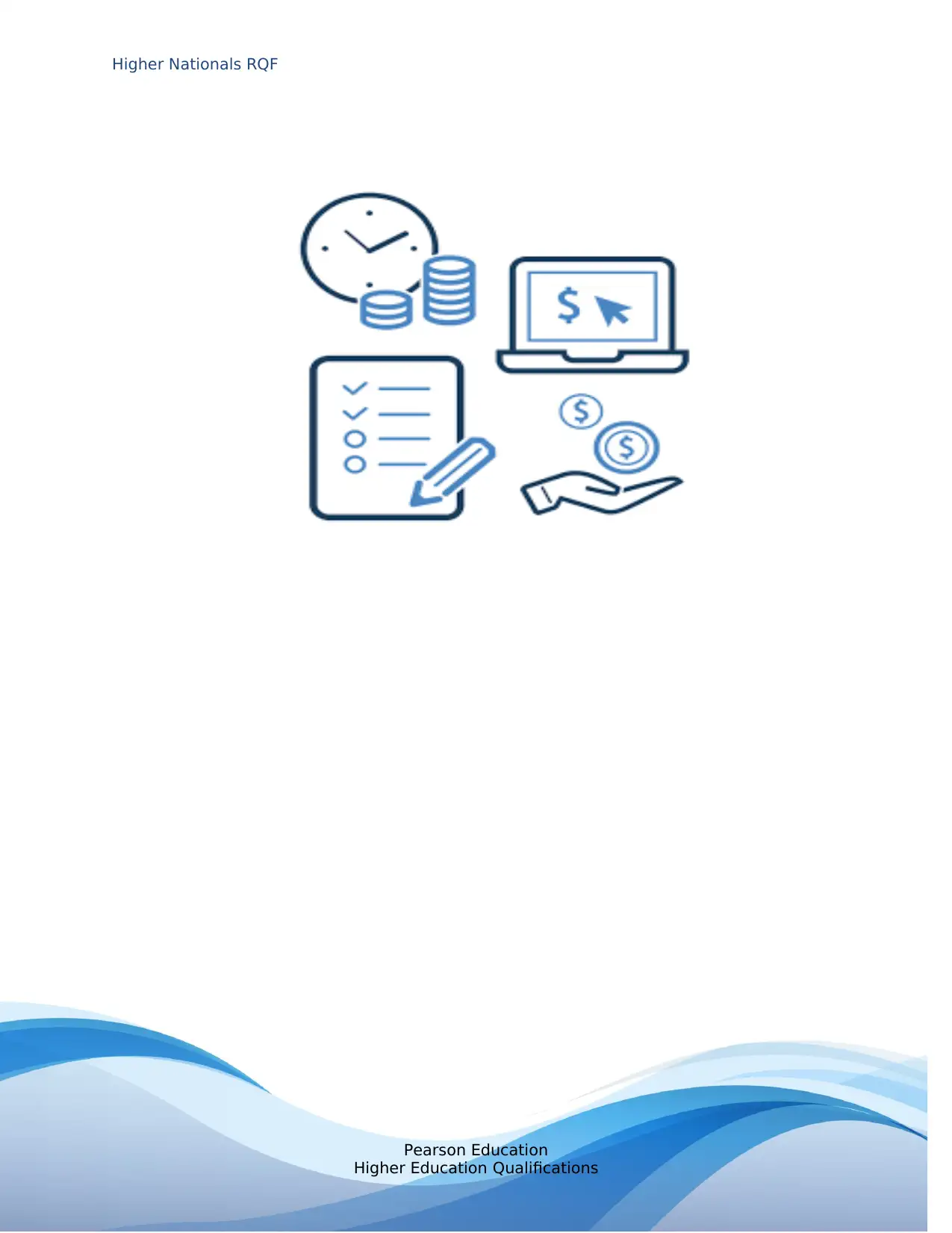
Higher Nationals RQF
Pearson Education
Higher Education Qualifications
Pearson Education
Higher Education Qualifications
Paraphrase This Document
Need a fresh take? Get an instant paraphrase of this document with our AI Paraphraser
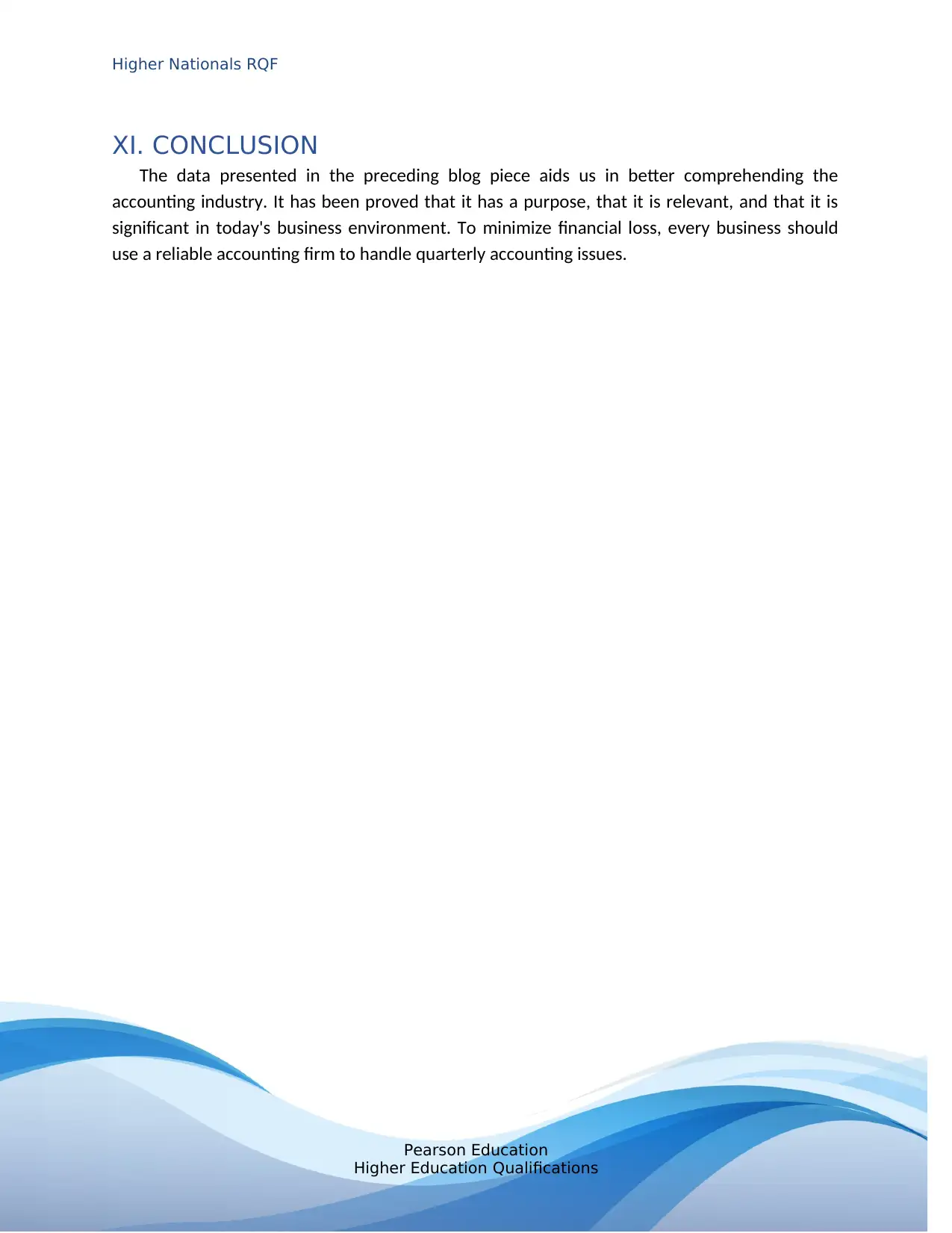
Higher Nationals RQF
XI. CONCLUSION
The data presented in the preceding blog piece aids us in better comprehending the
accounting industry. It has been proved that it has a purpose, that it is relevant, and that it is
significant in today's business environment. To minimize financial loss, every business should
use a reliable accounting firm to handle quarterly accounting issues.
Pearson Education
Higher Education Qualifications
XI. CONCLUSION
The data presented in the preceding blog piece aids us in better comprehending the
accounting industry. It has been proved that it has a purpose, that it is relevant, and that it is
significant in today's business environment. To minimize financial loss, every business should
use a reliable accounting firm to handle quarterly accounting issues.
Pearson Education
Higher Education Qualifications
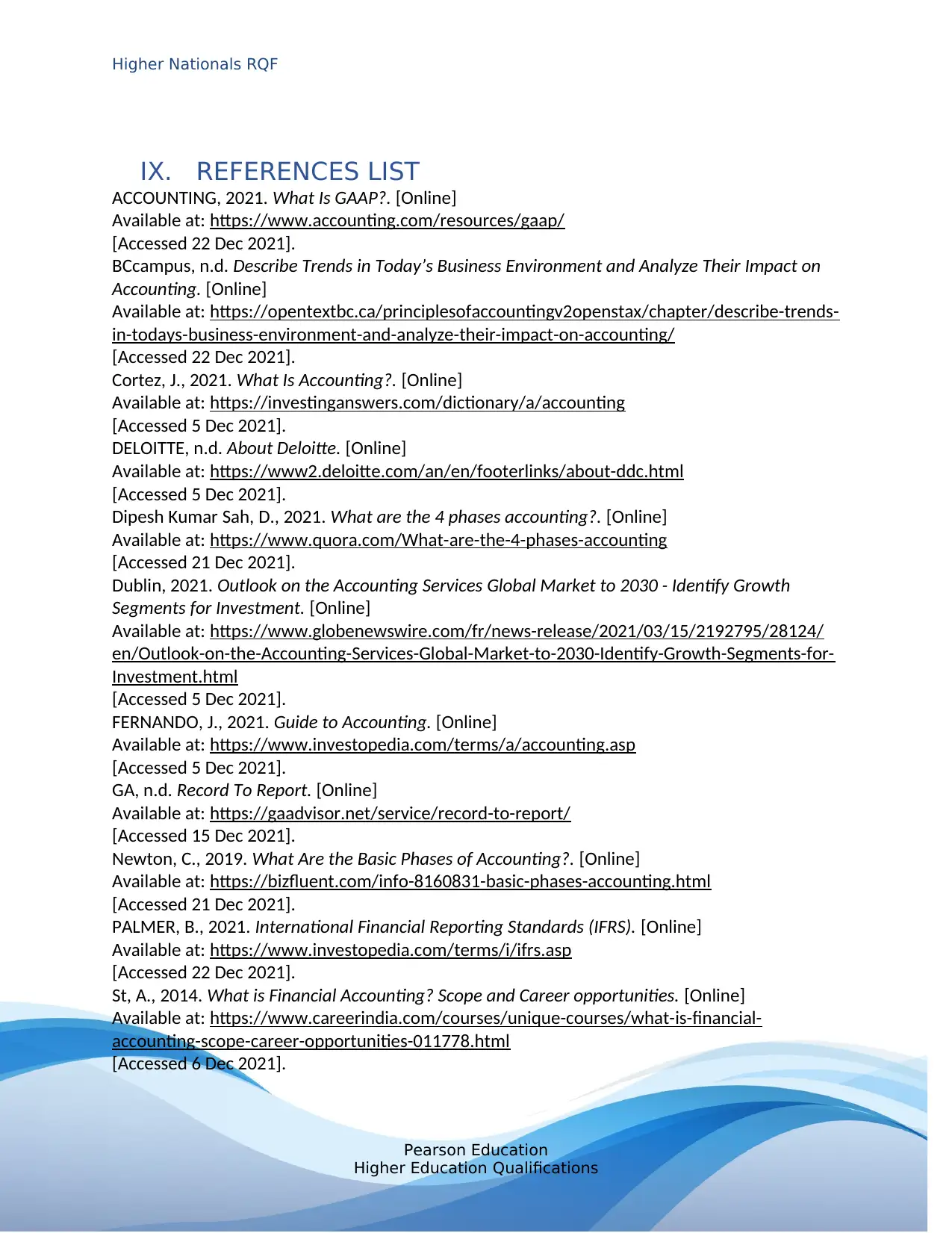
Higher Nationals RQF
IX. REFERENCES LIST
ACCOUNTING, 2021. What Is GAAP?. [Online]
Available at: https://www.accounting.com/resources/gaap/
[Accessed 22 Dec 2021].
BCcampus, n.d. Describe Trends in Today’s Business Environment and Analyze Their Impact on
Accounting. [Online]
Available at: https://opentextbc.ca/principlesofaccountingv2openstax/chapter/describe-trends-
in-todays-business-environment-and-analyze-their-impact-on-accounting/
[Accessed 22 Dec 2021].
Cortez, J., 2021. What Is Accounting?. [Online]
Available at: https://investinganswers.com/dictionary/a/accounting
[Accessed 5 Dec 2021].
DELOITTE, n.d. About Deloitte. [Online]
Available at: https://www2.deloitte.com/an/en/footerlinks/about-ddc.html
[Accessed 5 Dec 2021].
Dipesh Kumar Sah, D., 2021. What are the 4 phases accounting?. [Online]
Available at: https://www.quora.com/What-are-the-4-phases-accounting
[Accessed 21 Dec 2021].
Dublin, 2021. Outlook on the Accounting Services Global Market to 2030 - Identify Growth
Segments for Investment. [Online]
Available at: https://www.globenewswire.com/fr/news-release/2021/03/15/2192795/28124/
en/Outlook-on-the-Accounting-Services-Global-Market-to-2030-Identify-Growth-Segments-for-
Investment.html
[Accessed 5 Dec 2021].
FERNANDO, J., 2021. Guide to Accounting. [Online]
Available at: https://www.investopedia.com/terms/a/accounting.asp
[Accessed 5 Dec 2021].
GA, n.d. Record To Report. [Online]
Available at: https://gaadvisor.net/service/record-to-report/
[Accessed 15 Dec 2021].
Newton, C., 2019. What Are the Basic Phases of Accounting?. [Online]
Available at: https://bizfluent.com/info-8160831-basic-phases-accounting.html
[Accessed 21 Dec 2021].
PALMER, B., 2021. International Financial Reporting Standards (IFRS). [Online]
Available at: https://www.investopedia.com/terms/i/ifrs.asp
[Accessed 22 Dec 2021].
St, A., 2014. What is Financial Accounting? Scope and Career opportunities. [Online]
Available at: https://www.careerindia.com/courses/unique-courses/what-is-financial-
accounting-scope-career-opportunities-011778.html
[Accessed 6 Dec 2021].
Pearson Education
Higher Education Qualifications
IX. REFERENCES LIST
ACCOUNTING, 2021. What Is GAAP?. [Online]
Available at: https://www.accounting.com/resources/gaap/
[Accessed 22 Dec 2021].
BCcampus, n.d. Describe Trends in Today’s Business Environment and Analyze Their Impact on
Accounting. [Online]
Available at: https://opentextbc.ca/principlesofaccountingv2openstax/chapter/describe-trends-
in-todays-business-environment-and-analyze-their-impact-on-accounting/
[Accessed 22 Dec 2021].
Cortez, J., 2021. What Is Accounting?. [Online]
Available at: https://investinganswers.com/dictionary/a/accounting
[Accessed 5 Dec 2021].
DELOITTE, n.d. About Deloitte. [Online]
Available at: https://www2.deloitte.com/an/en/footerlinks/about-ddc.html
[Accessed 5 Dec 2021].
Dipesh Kumar Sah, D., 2021. What are the 4 phases accounting?. [Online]
Available at: https://www.quora.com/What-are-the-4-phases-accounting
[Accessed 21 Dec 2021].
Dublin, 2021. Outlook on the Accounting Services Global Market to 2030 - Identify Growth
Segments for Investment. [Online]
Available at: https://www.globenewswire.com/fr/news-release/2021/03/15/2192795/28124/
en/Outlook-on-the-Accounting-Services-Global-Market-to-2030-Identify-Growth-Segments-for-
Investment.html
[Accessed 5 Dec 2021].
FERNANDO, J., 2021. Guide to Accounting. [Online]
Available at: https://www.investopedia.com/terms/a/accounting.asp
[Accessed 5 Dec 2021].
GA, n.d. Record To Report. [Online]
Available at: https://gaadvisor.net/service/record-to-report/
[Accessed 15 Dec 2021].
Newton, C., 2019. What Are the Basic Phases of Accounting?. [Online]
Available at: https://bizfluent.com/info-8160831-basic-phases-accounting.html
[Accessed 21 Dec 2021].
PALMER, B., 2021. International Financial Reporting Standards (IFRS). [Online]
Available at: https://www.investopedia.com/terms/i/ifrs.asp
[Accessed 22 Dec 2021].
St, A., 2014. What is Financial Accounting? Scope and Career opportunities. [Online]
Available at: https://www.careerindia.com/courses/unique-courses/what-is-financial-
accounting-scope-career-opportunities-011778.html
[Accessed 6 Dec 2021].
Pearson Education
Higher Education Qualifications
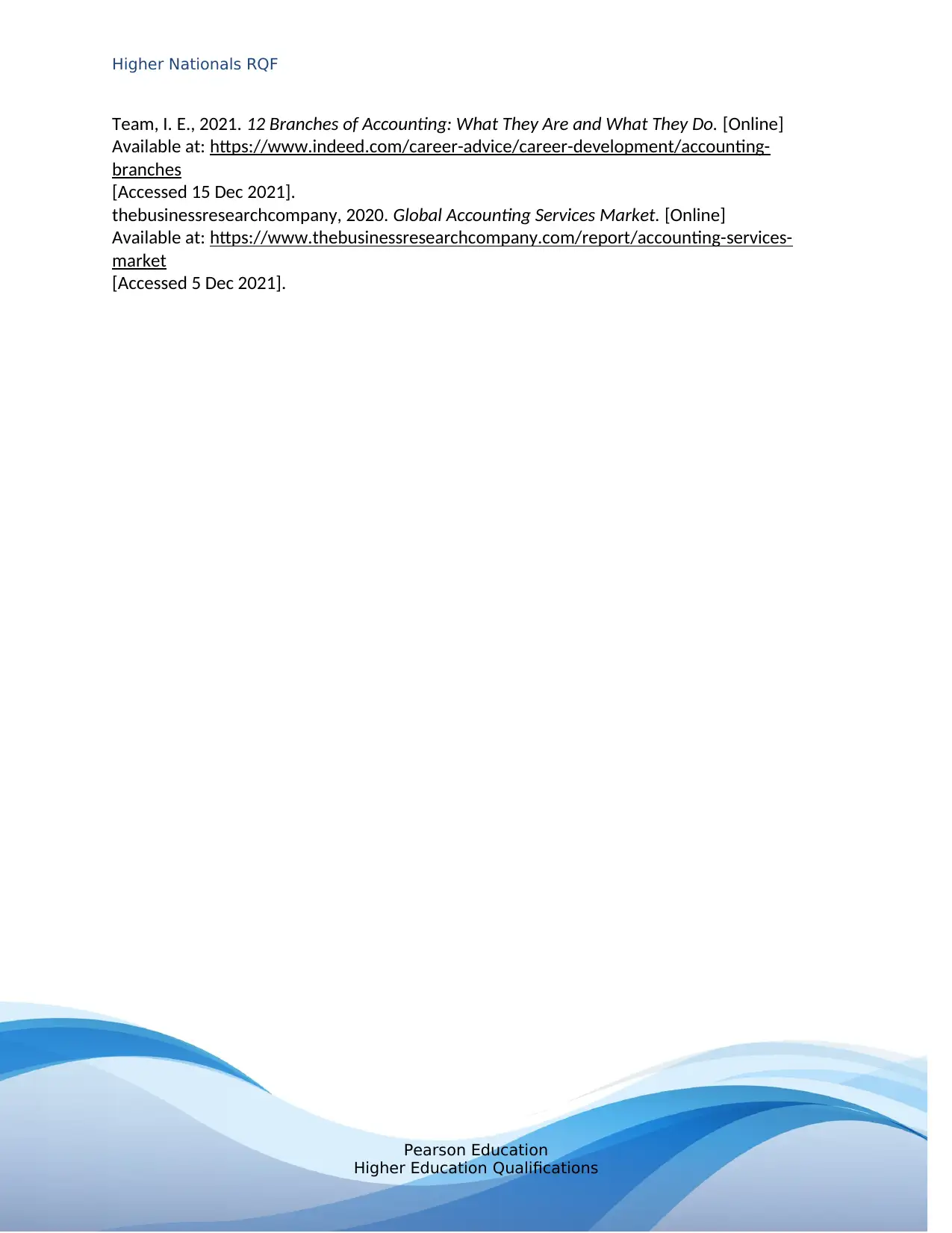
Higher Nationals RQF
Team, I. E., 2021. 12 Branches of Accounting: What They Are and What They Do. [Online]
Available at: https://www.indeed.com/career-advice/career-development/accounting-
branches
[Accessed 15 Dec 2021].
thebusinessresearchcompany, 2020. Global Accounting Services Market. [Online]
Available at: https://www.thebusinessresearchcompany.com/report/accounting-services-
market
[Accessed 5 Dec 2021].
Pearson Education
Higher Education Qualifications
Team, I. E., 2021. 12 Branches of Accounting: What They Are and What They Do. [Online]
Available at: https://www.indeed.com/career-advice/career-development/accounting-
branches
[Accessed 15 Dec 2021].
thebusinessresearchcompany, 2020. Global Accounting Services Market. [Online]
Available at: https://www.thebusinessresearchcompany.com/report/accounting-services-
market
[Accessed 5 Dec 2021].
Pearson Education
Higher Education Qualifications
1 out of 34
Related Documents
Your All-in-One AI-Powered Toolkit for Academic Success.
+13062052269
info@desklib.com
Available 24*7 on WhatsApp / Email
![[object Object]](/_next/static/media/star-bottom.7253800d.svg)
Unlock your academic potential
© 2024 | Zucol Services PVT LTD | All rights reserved.





